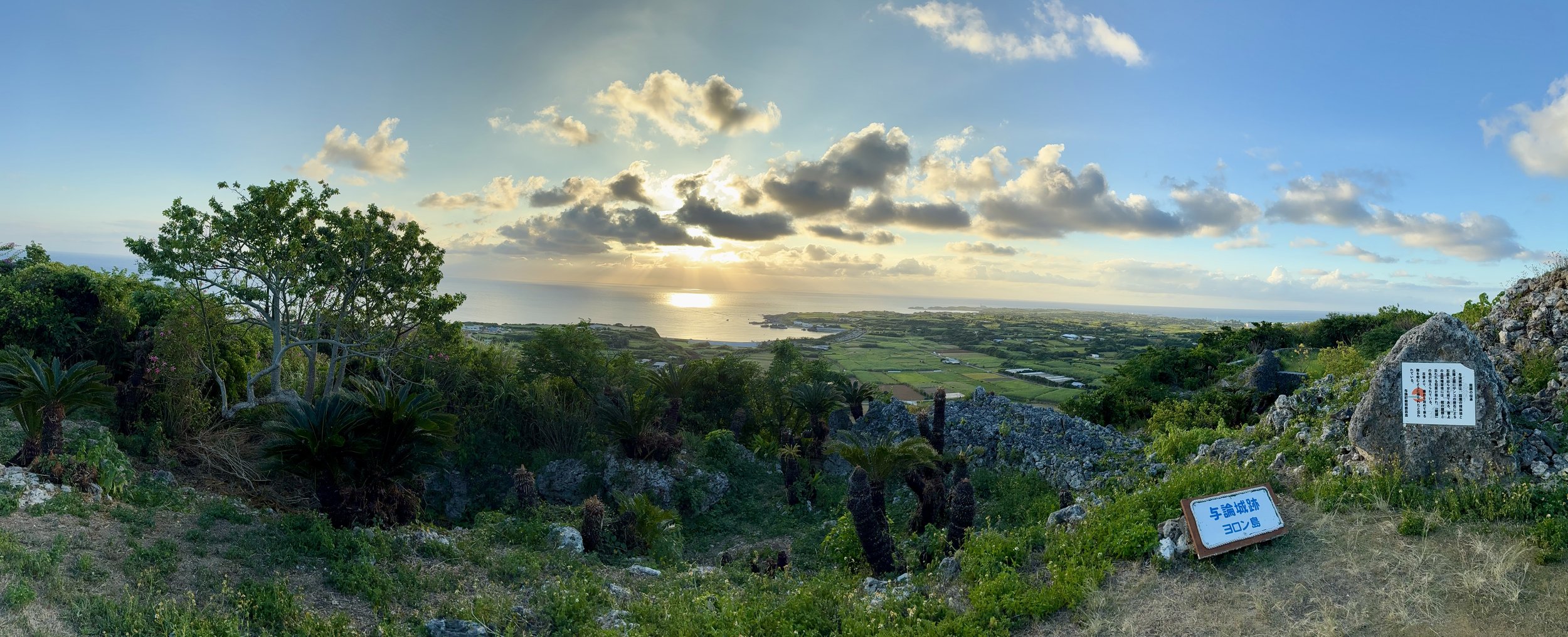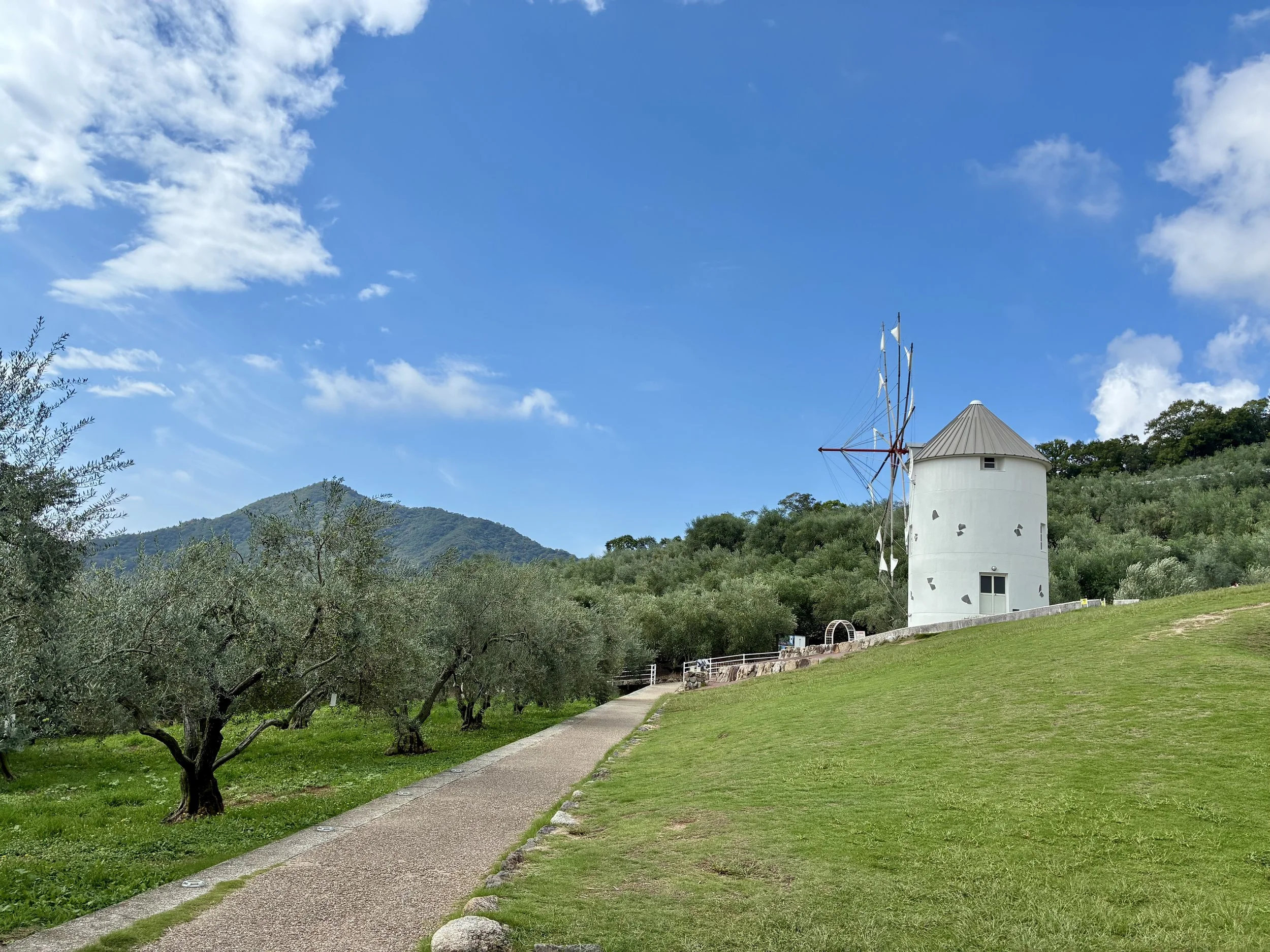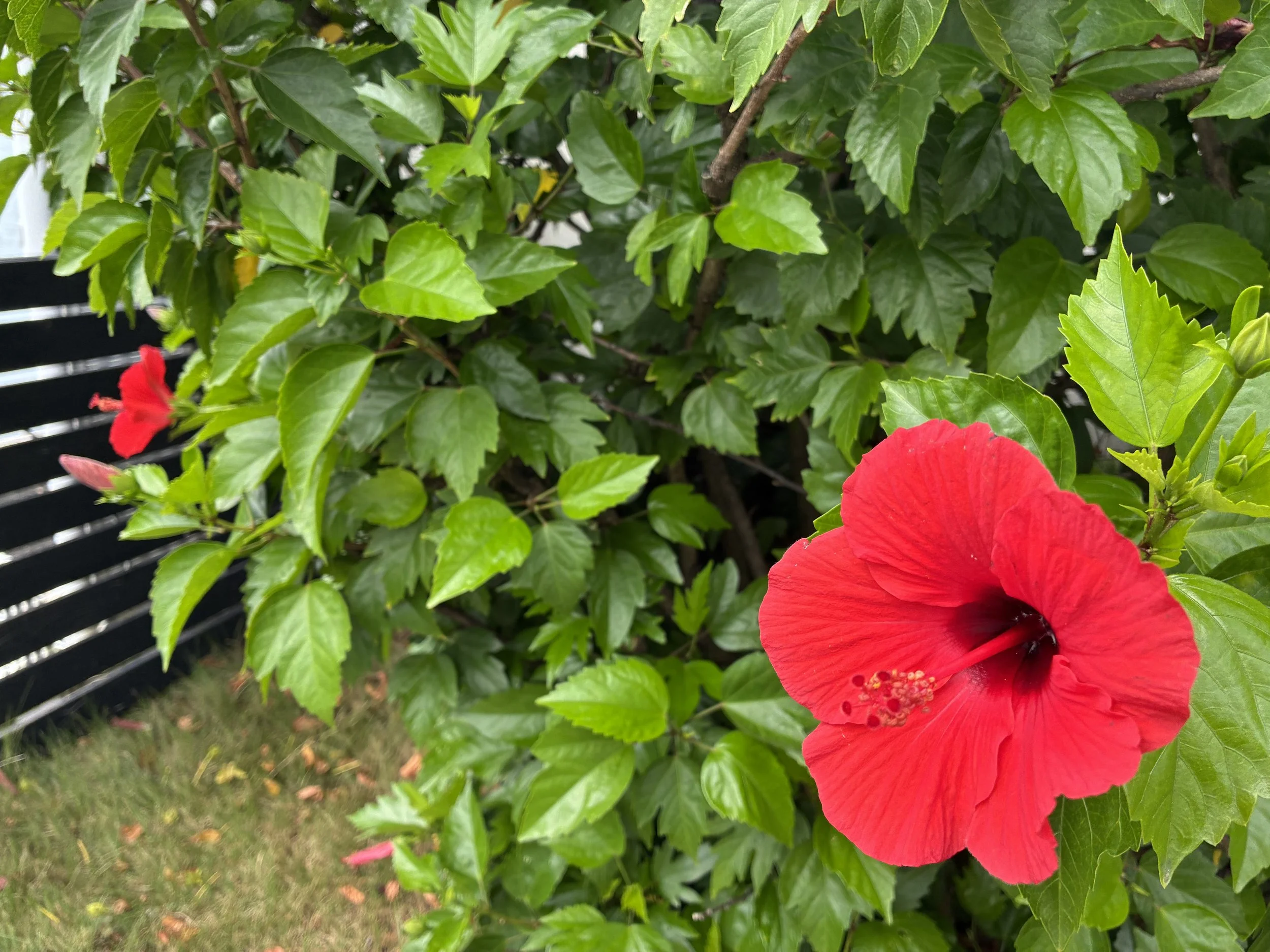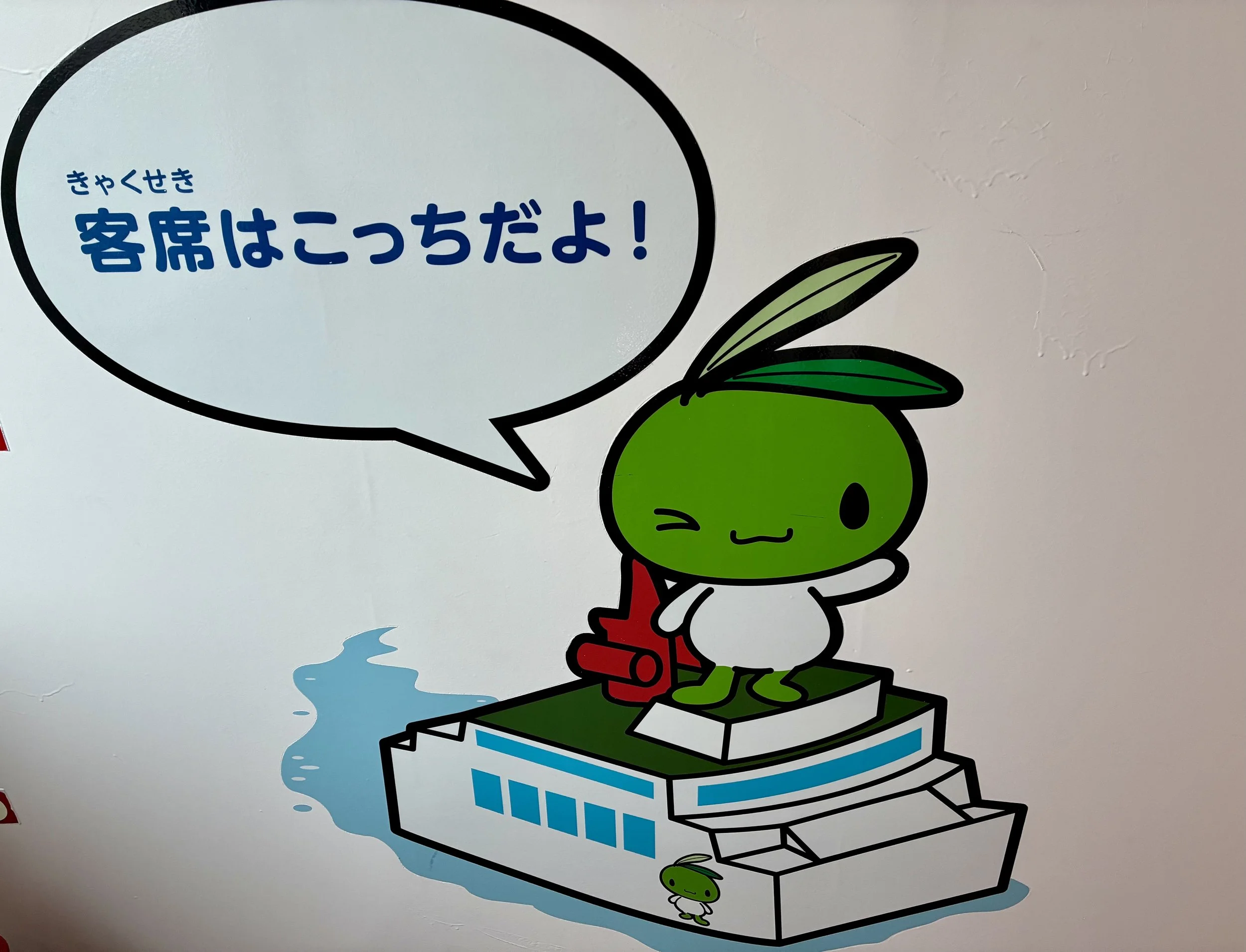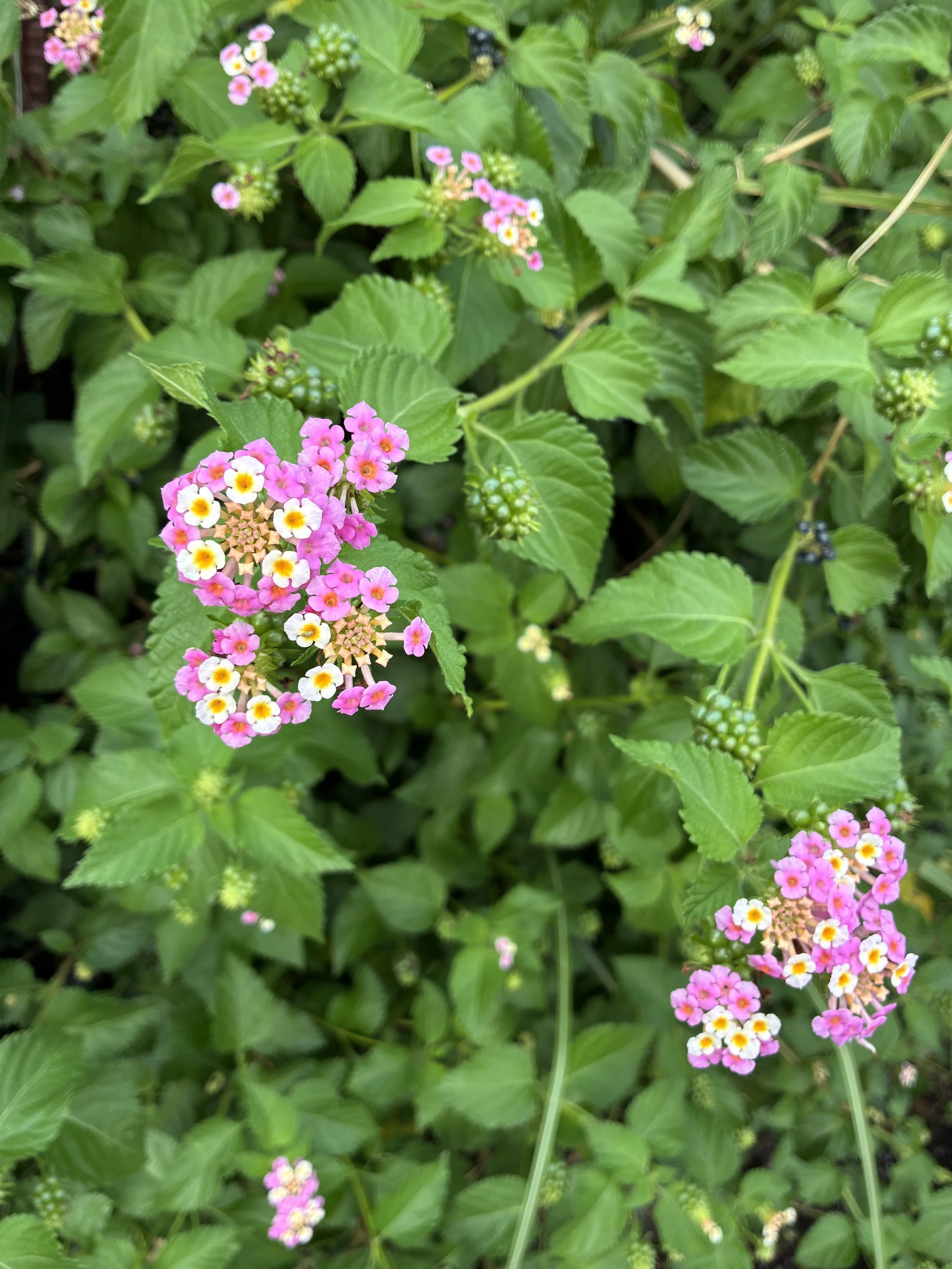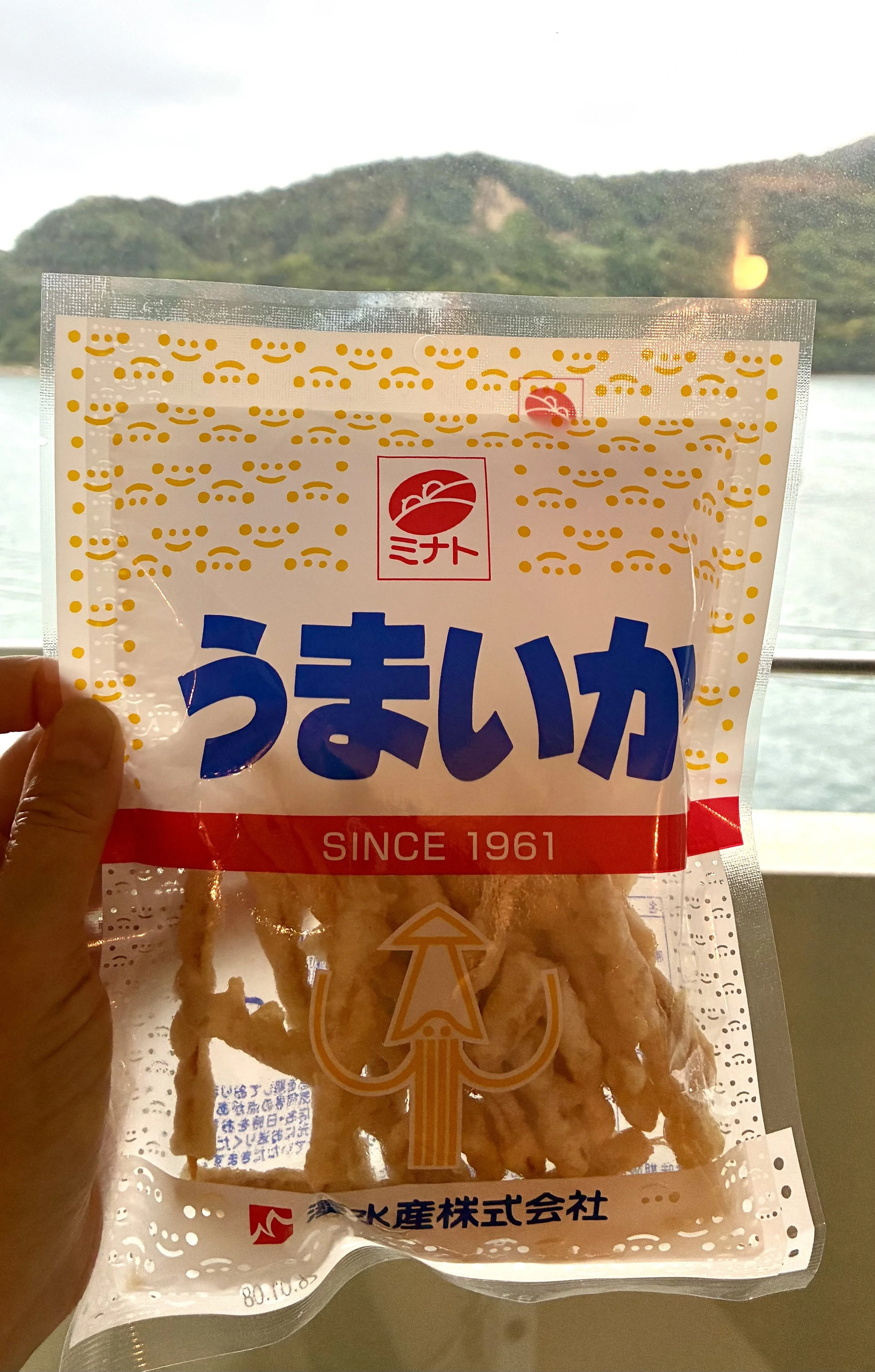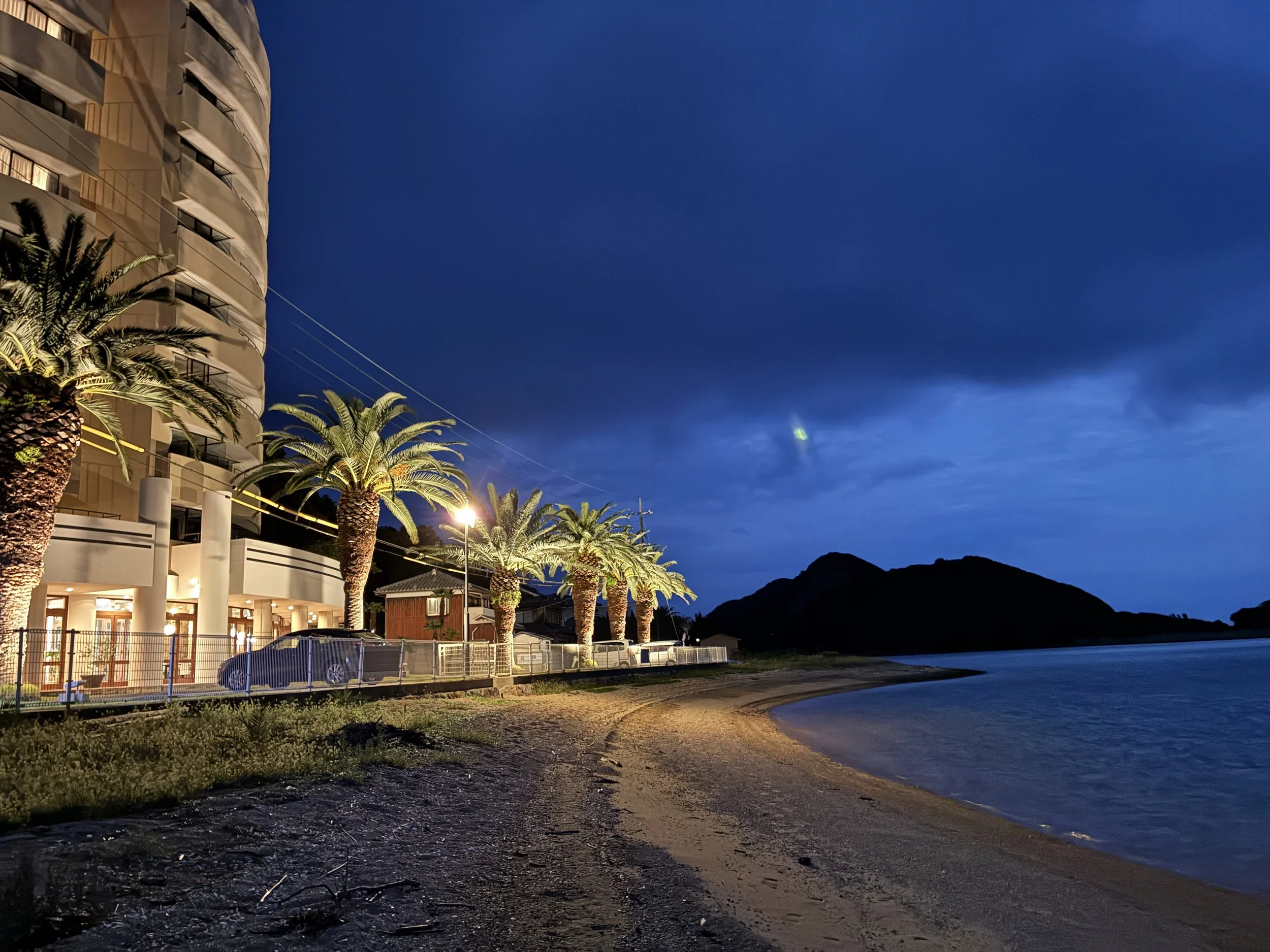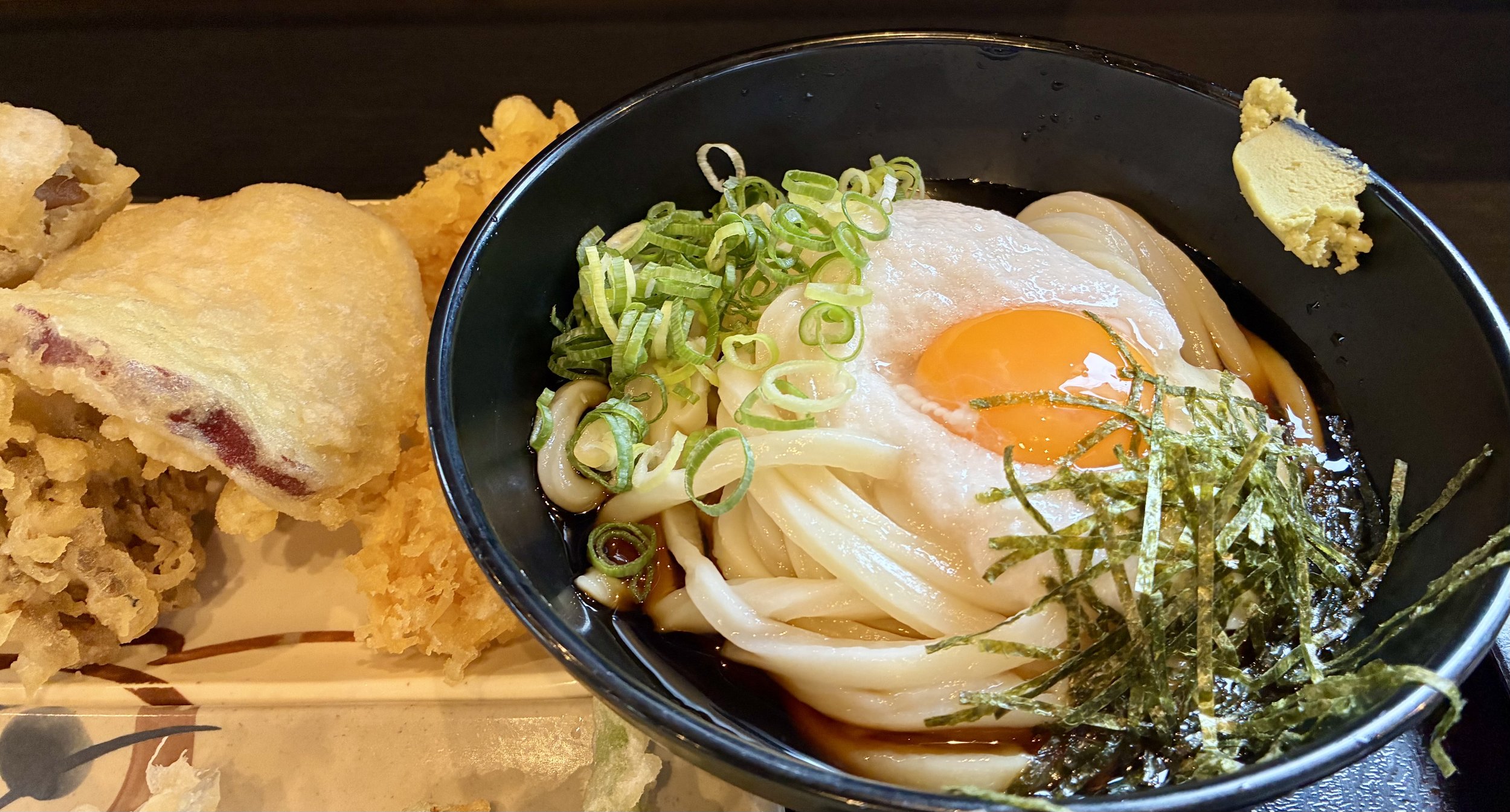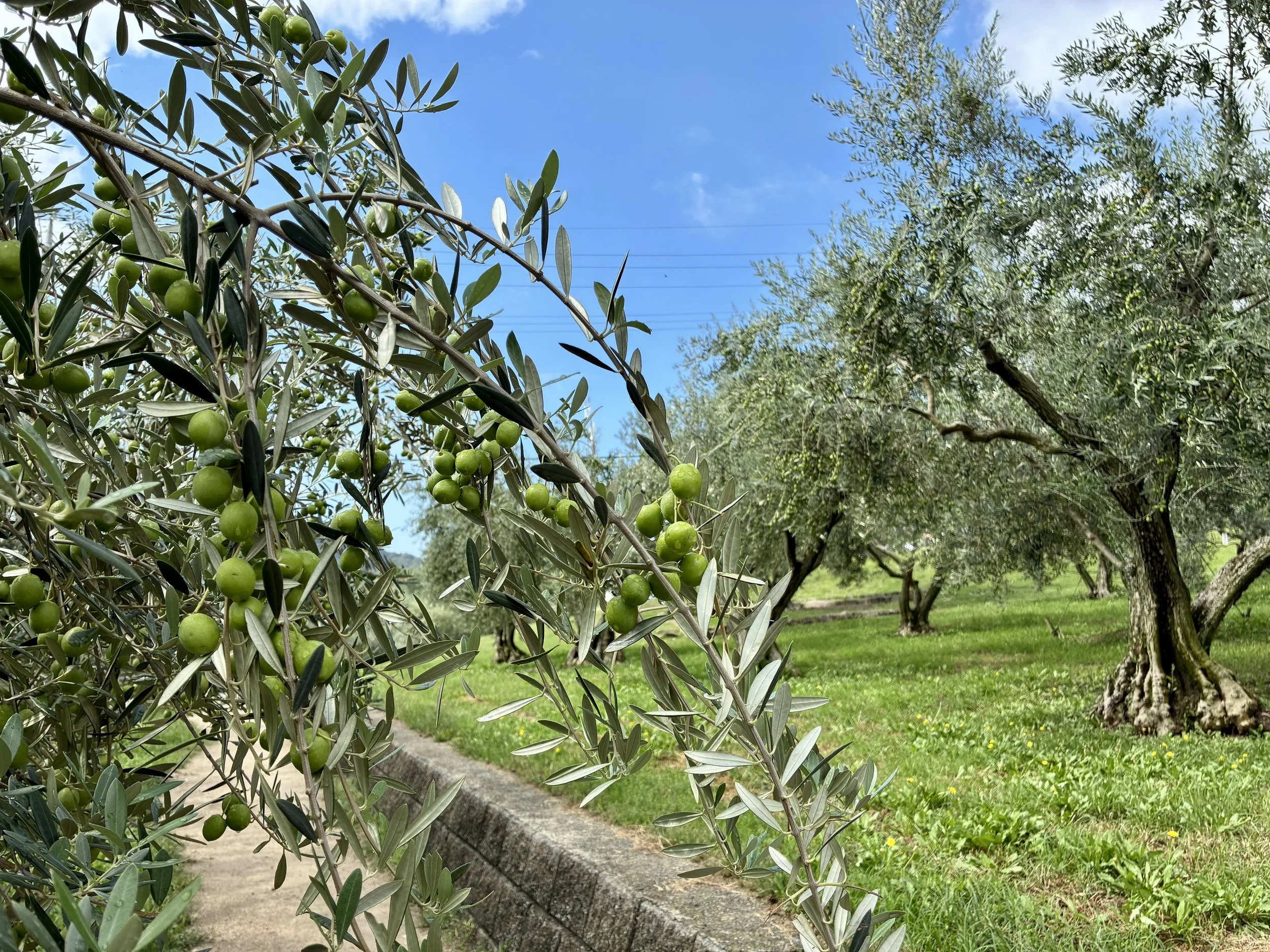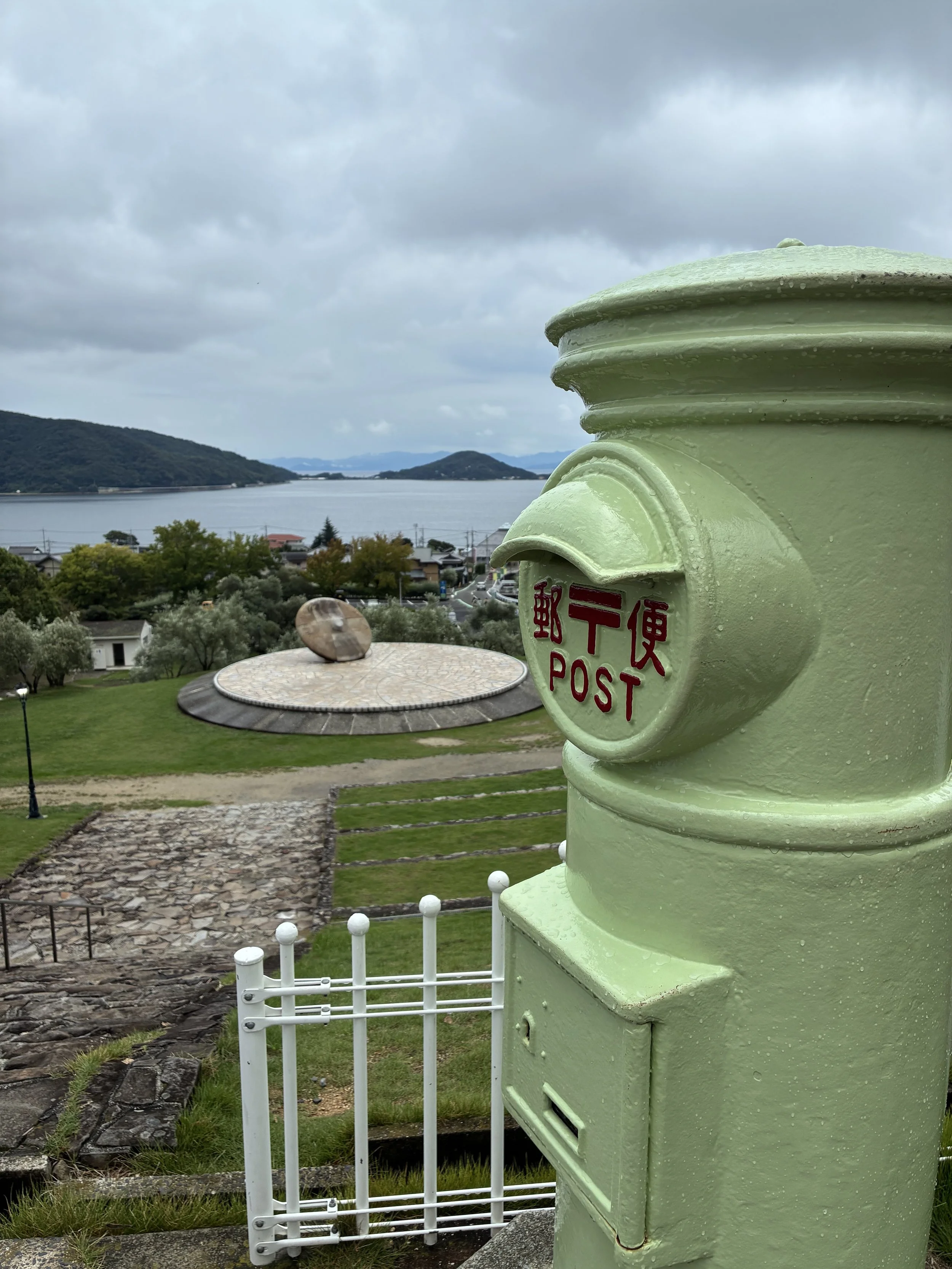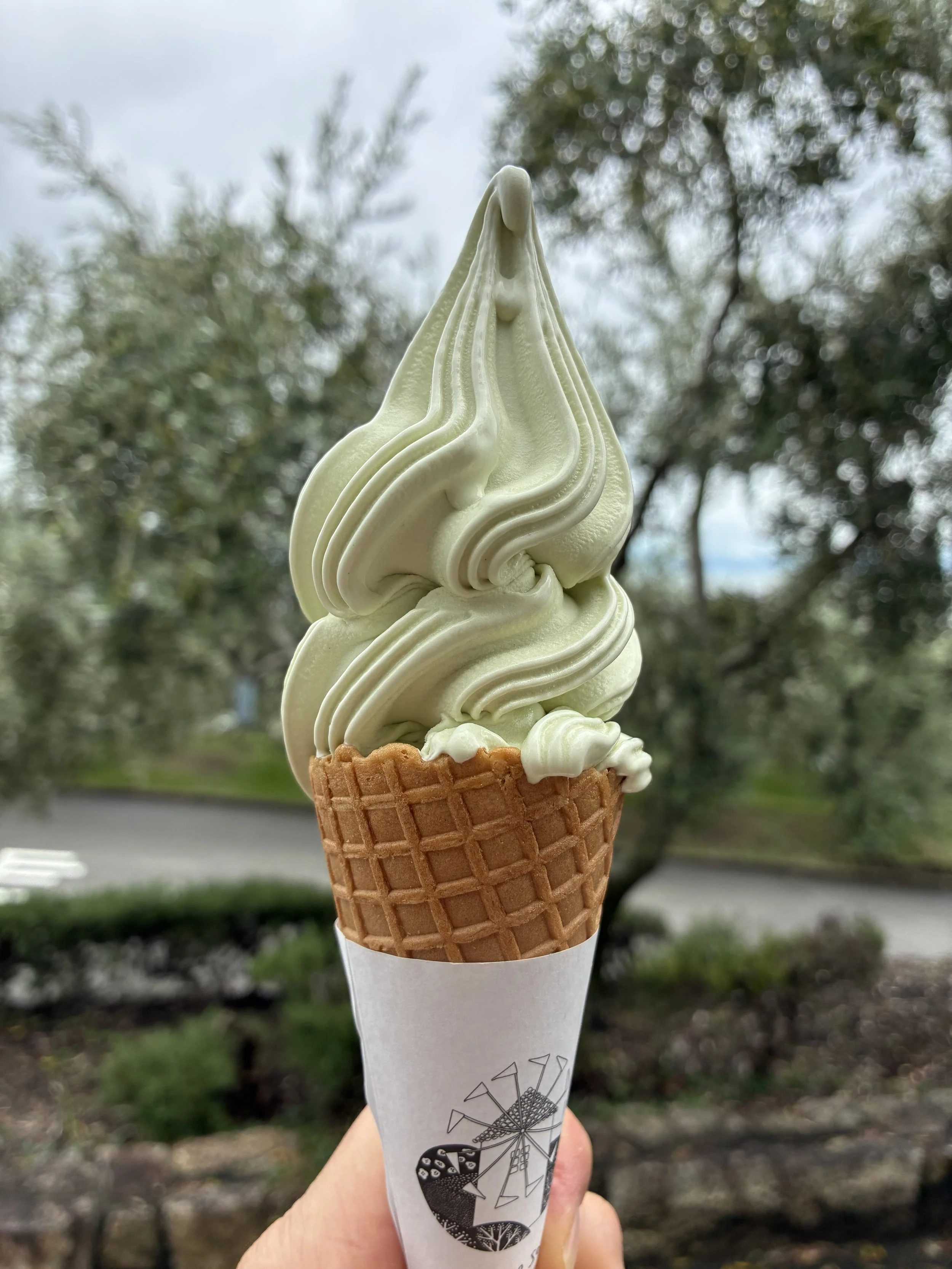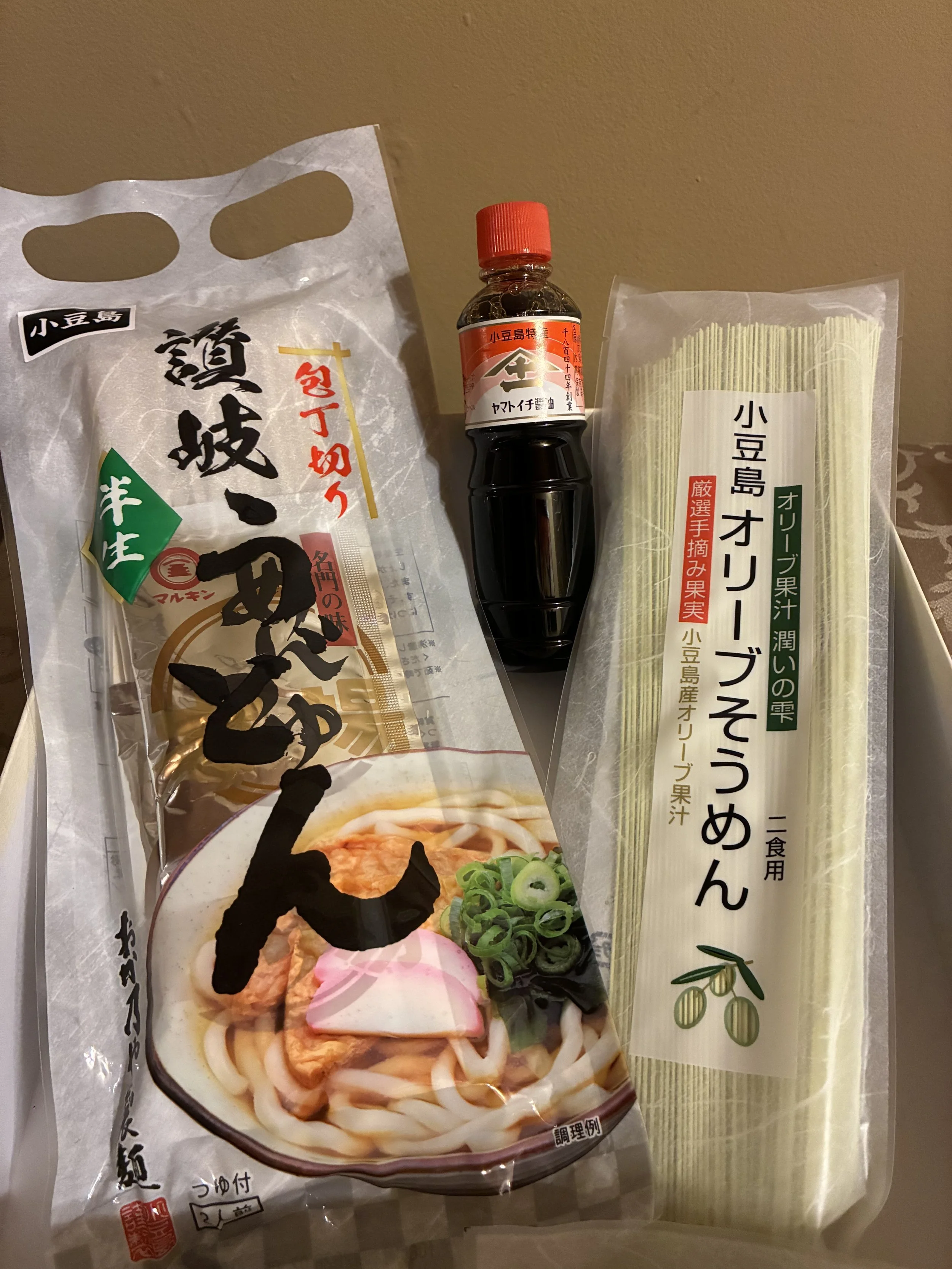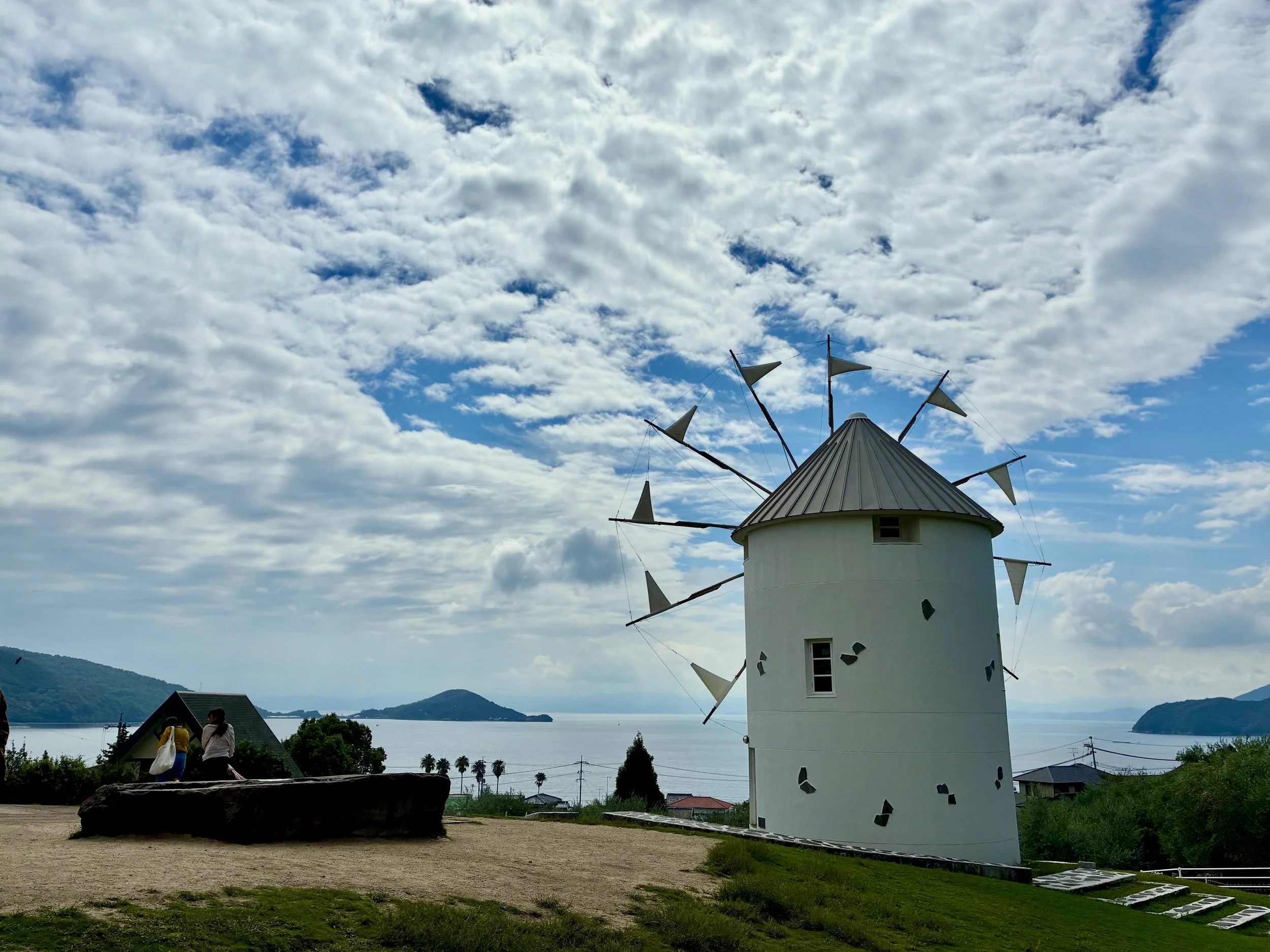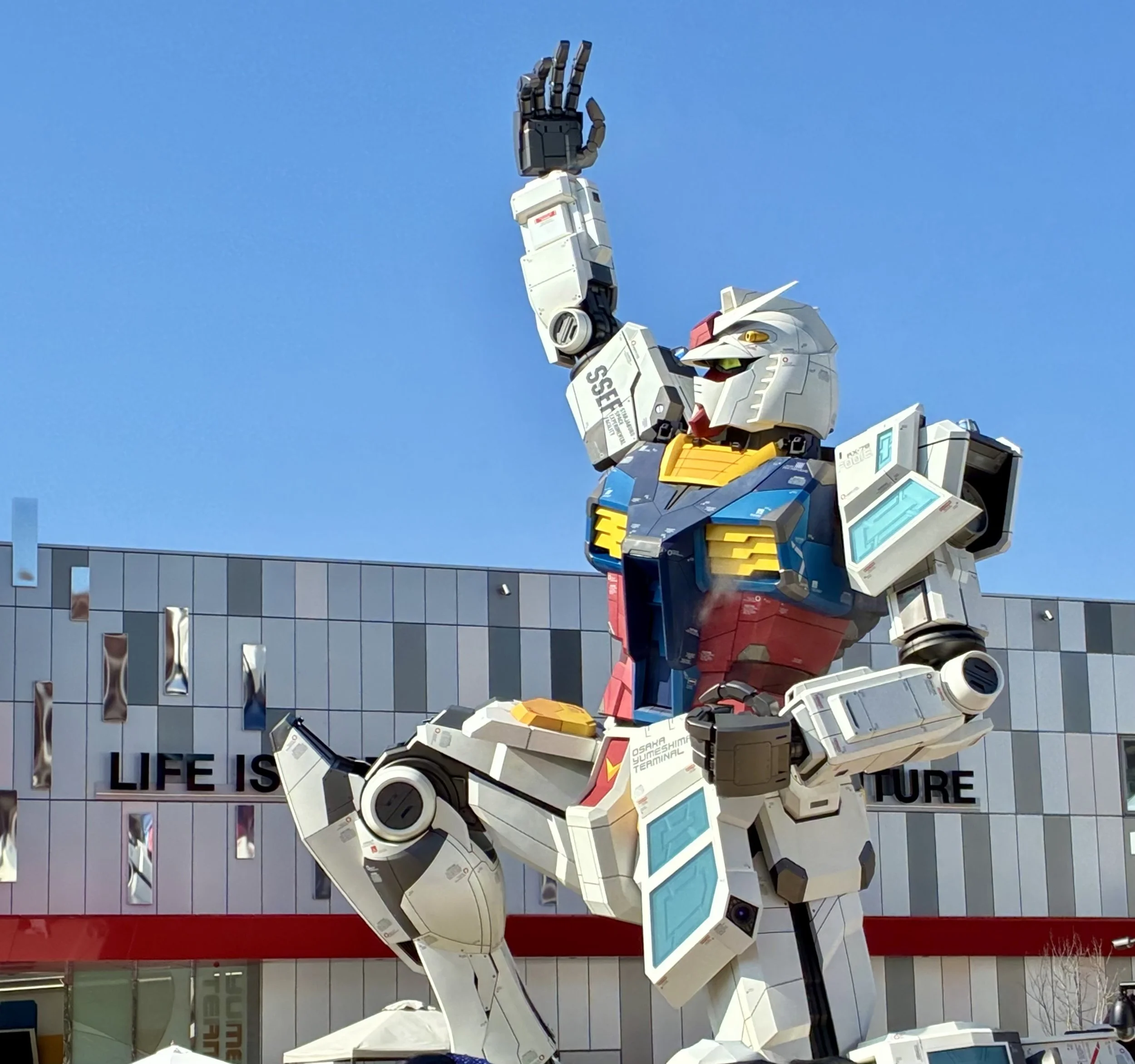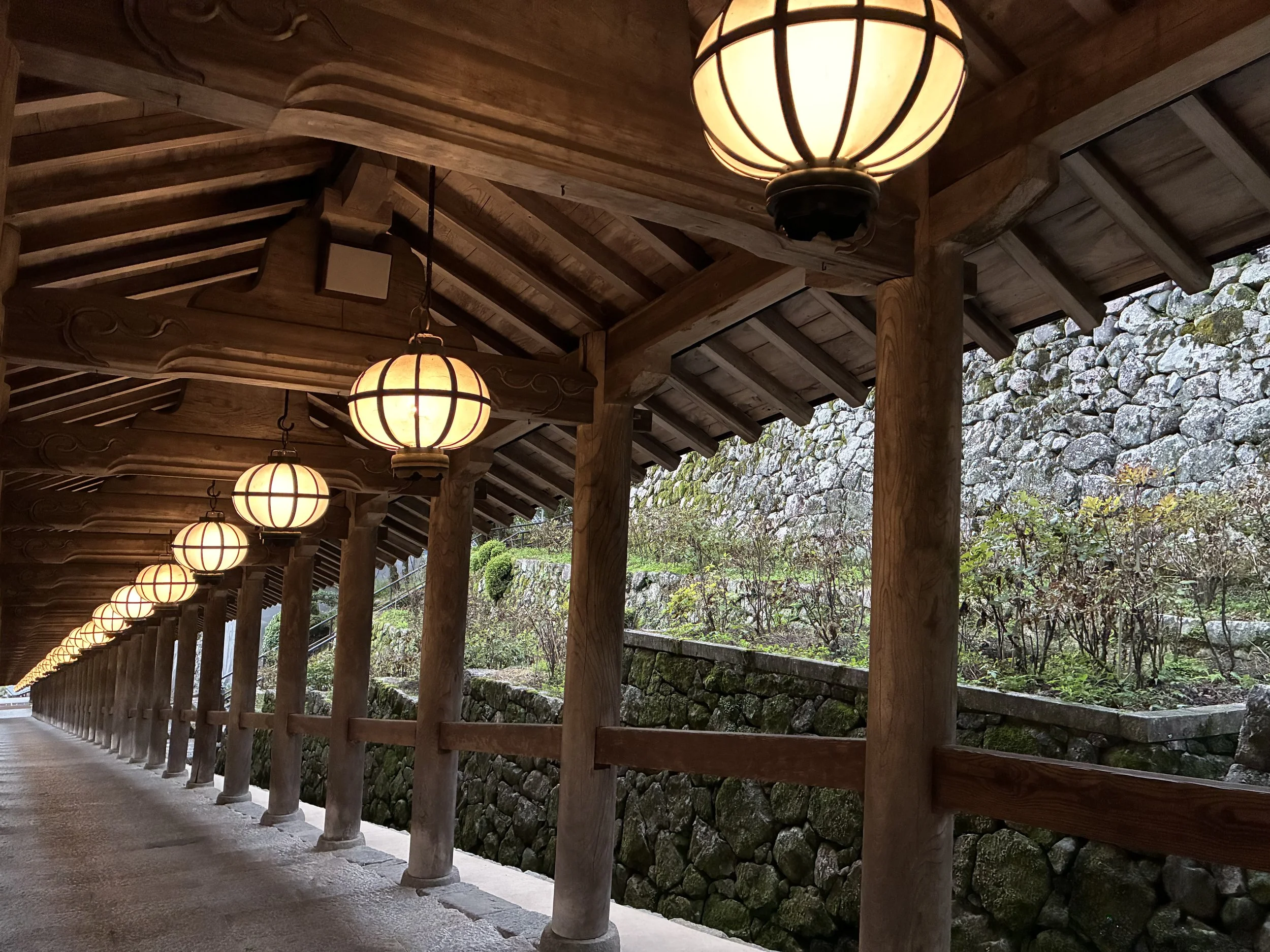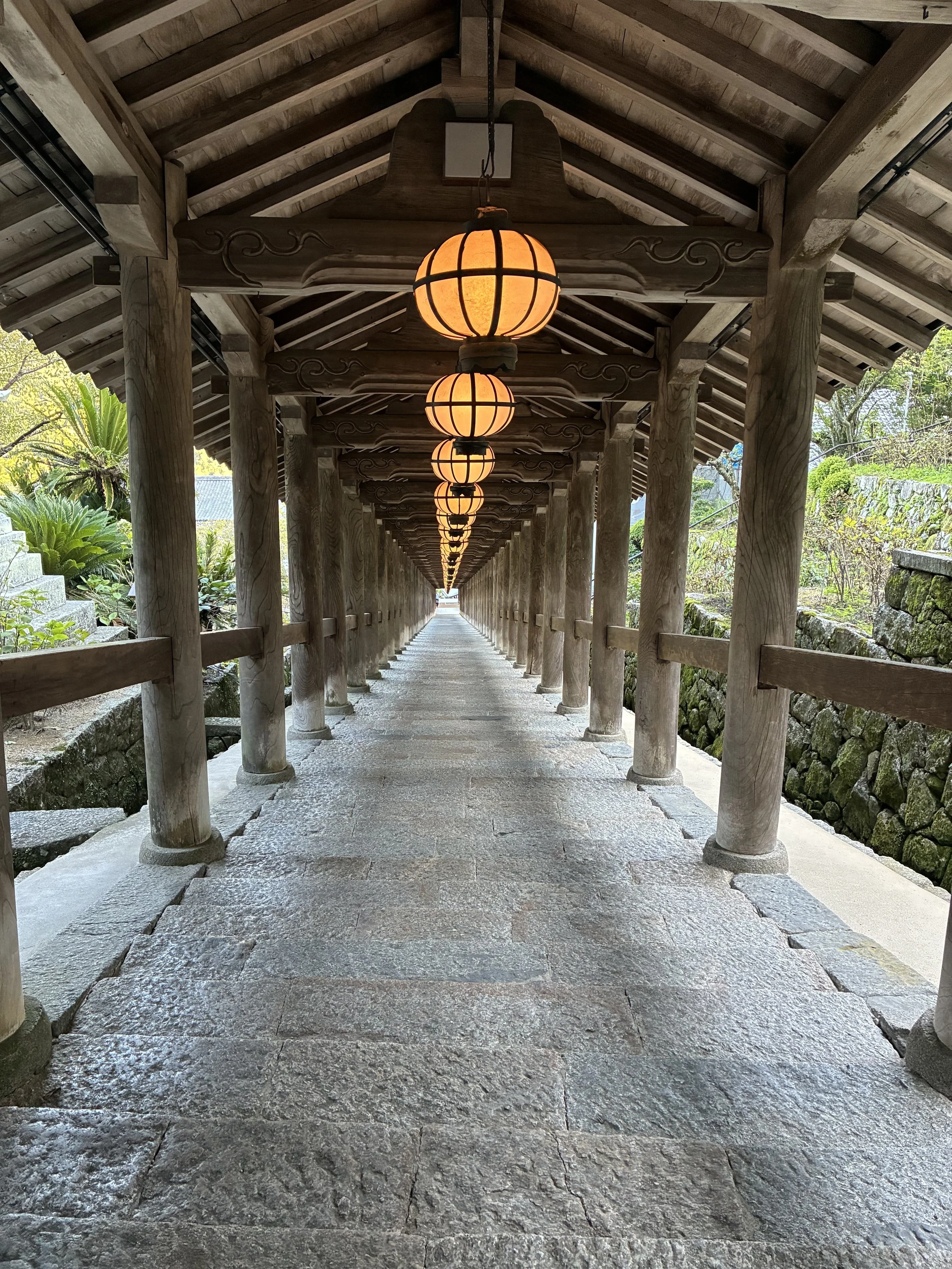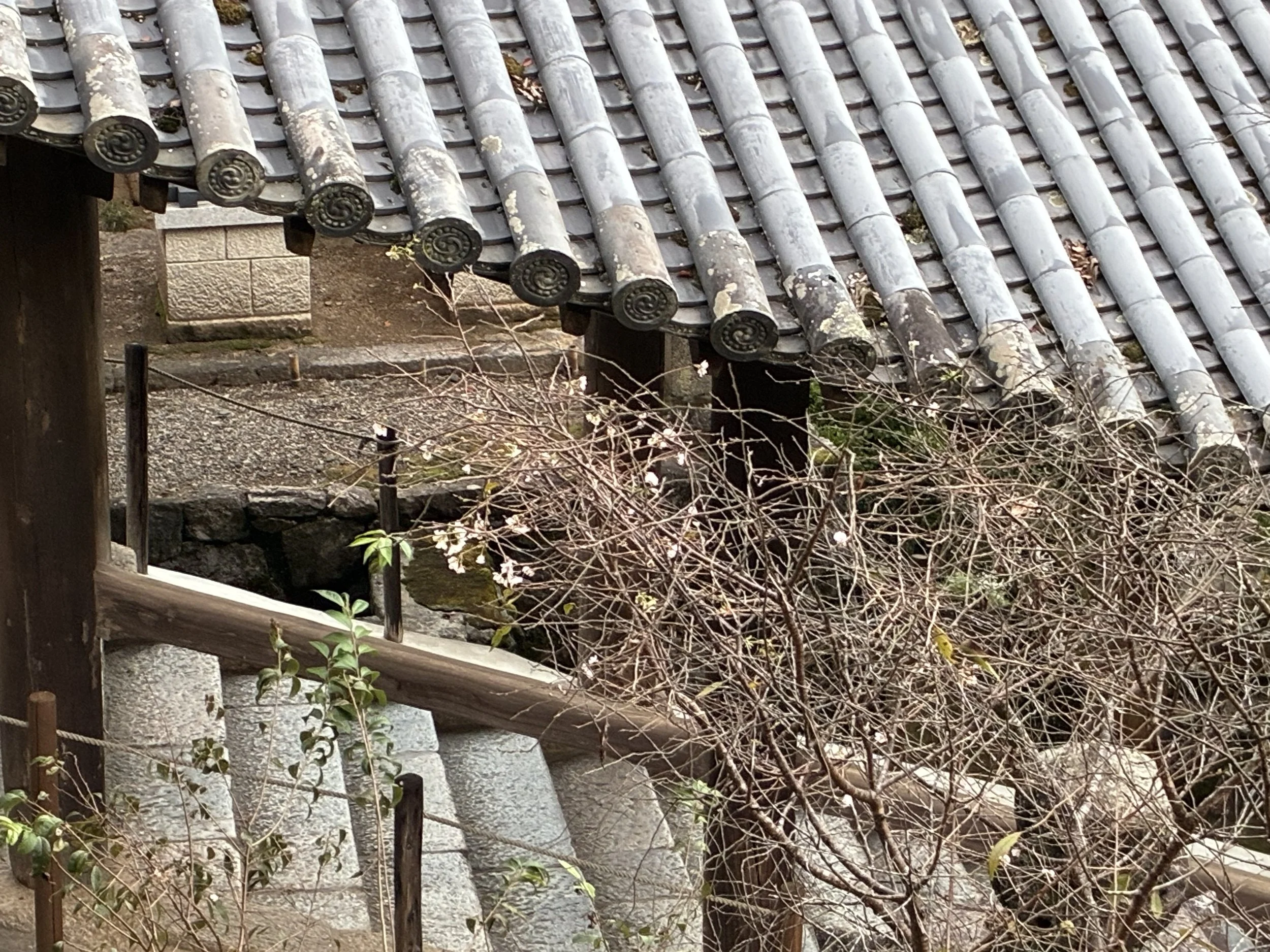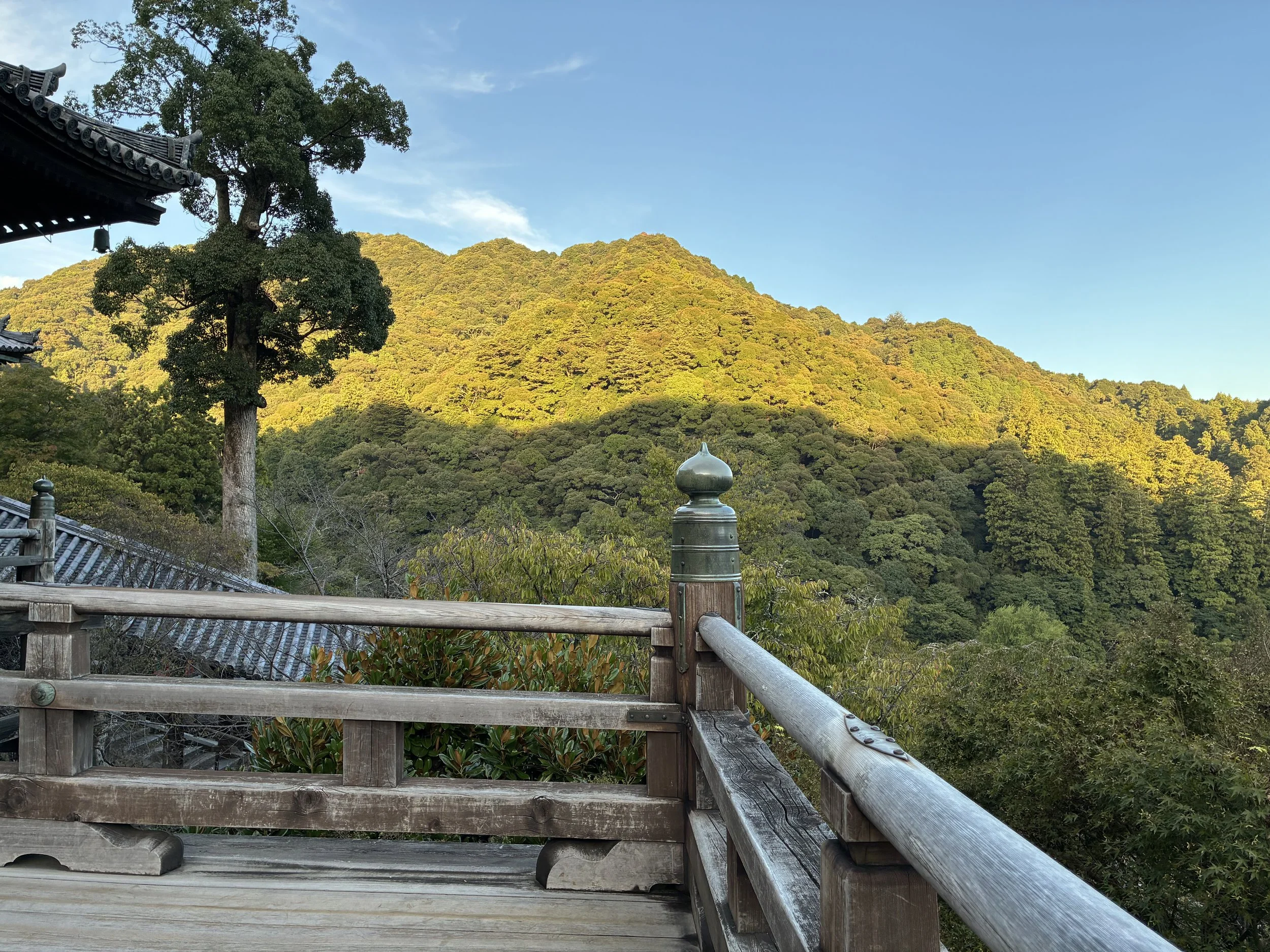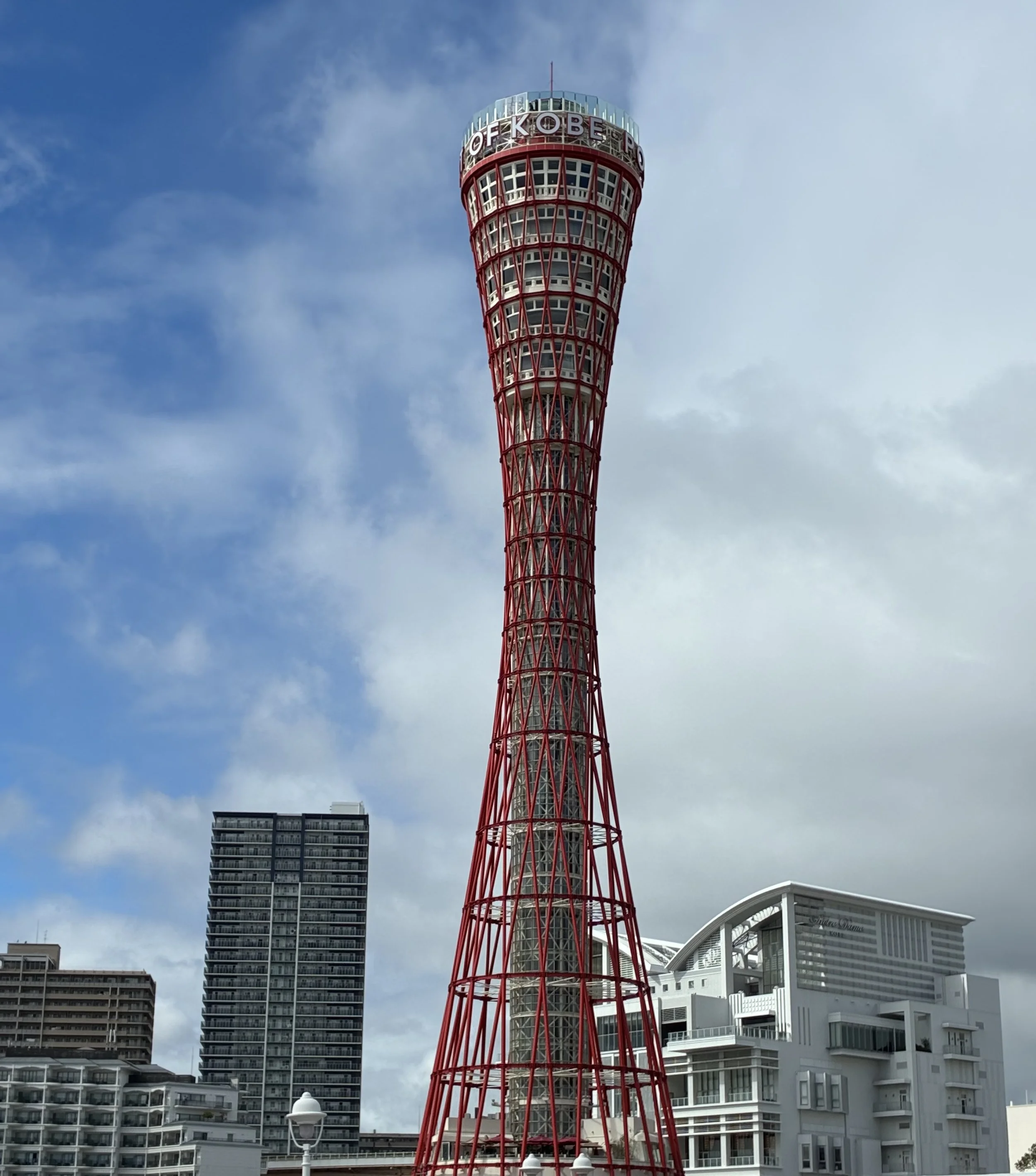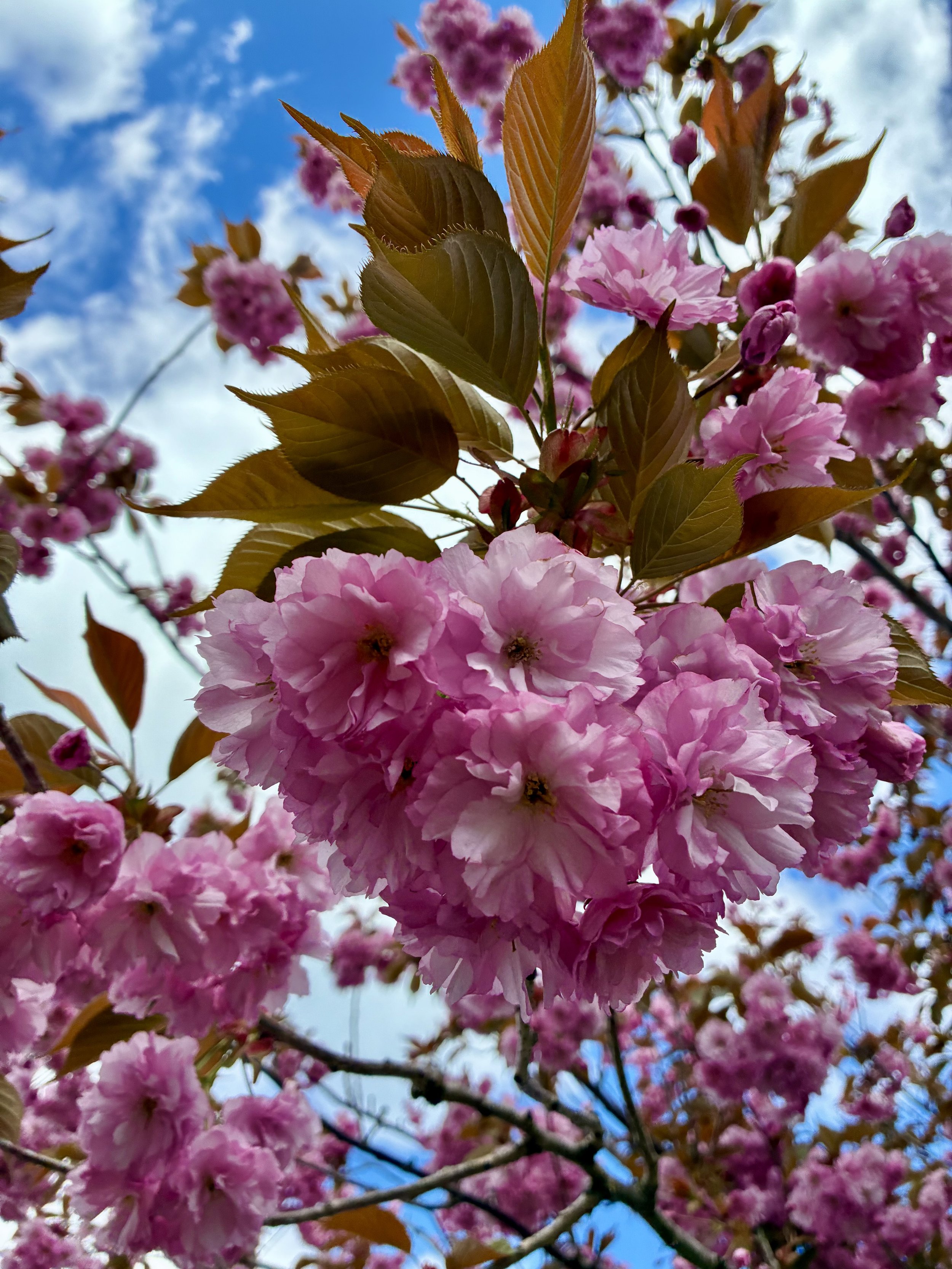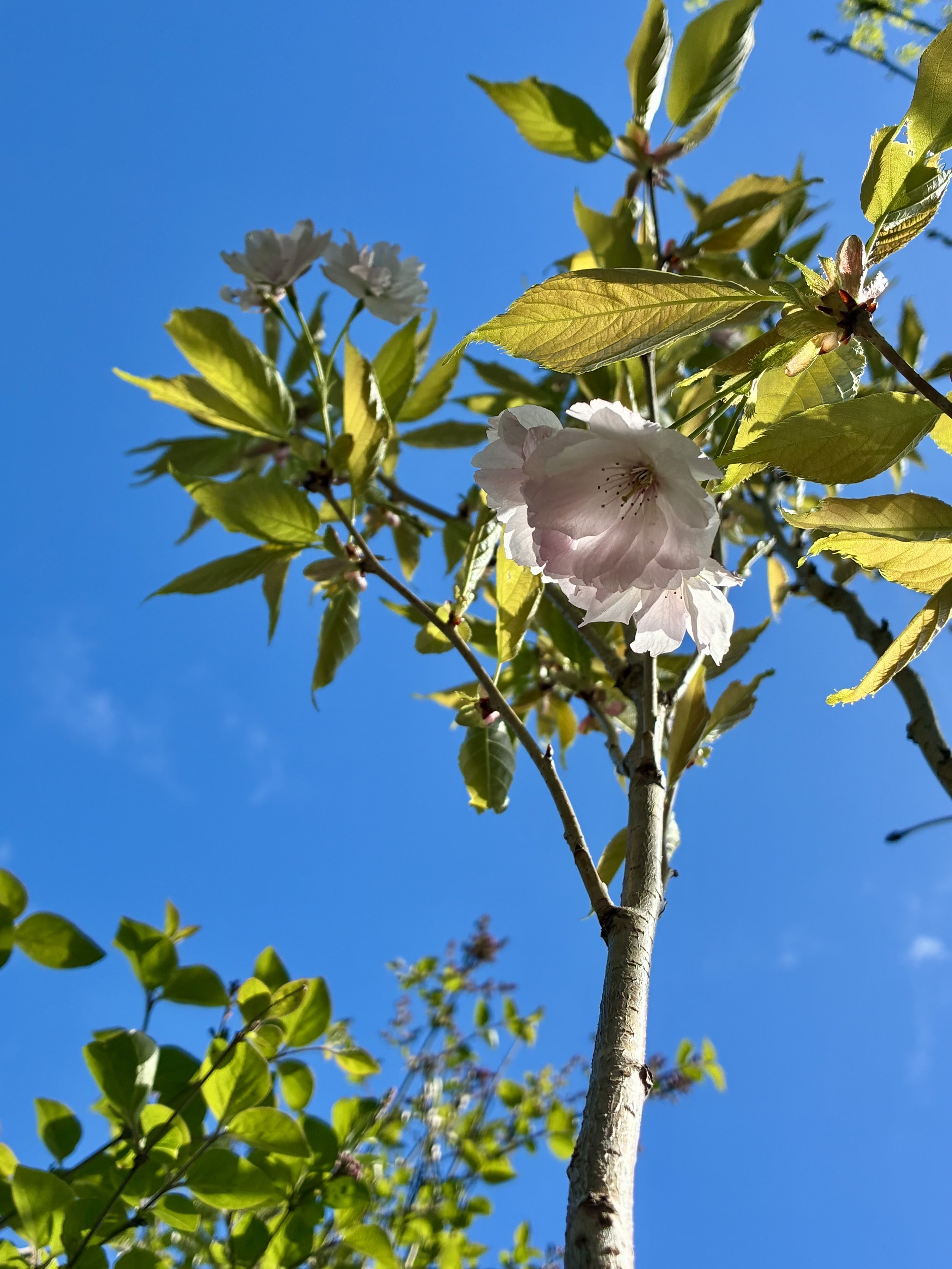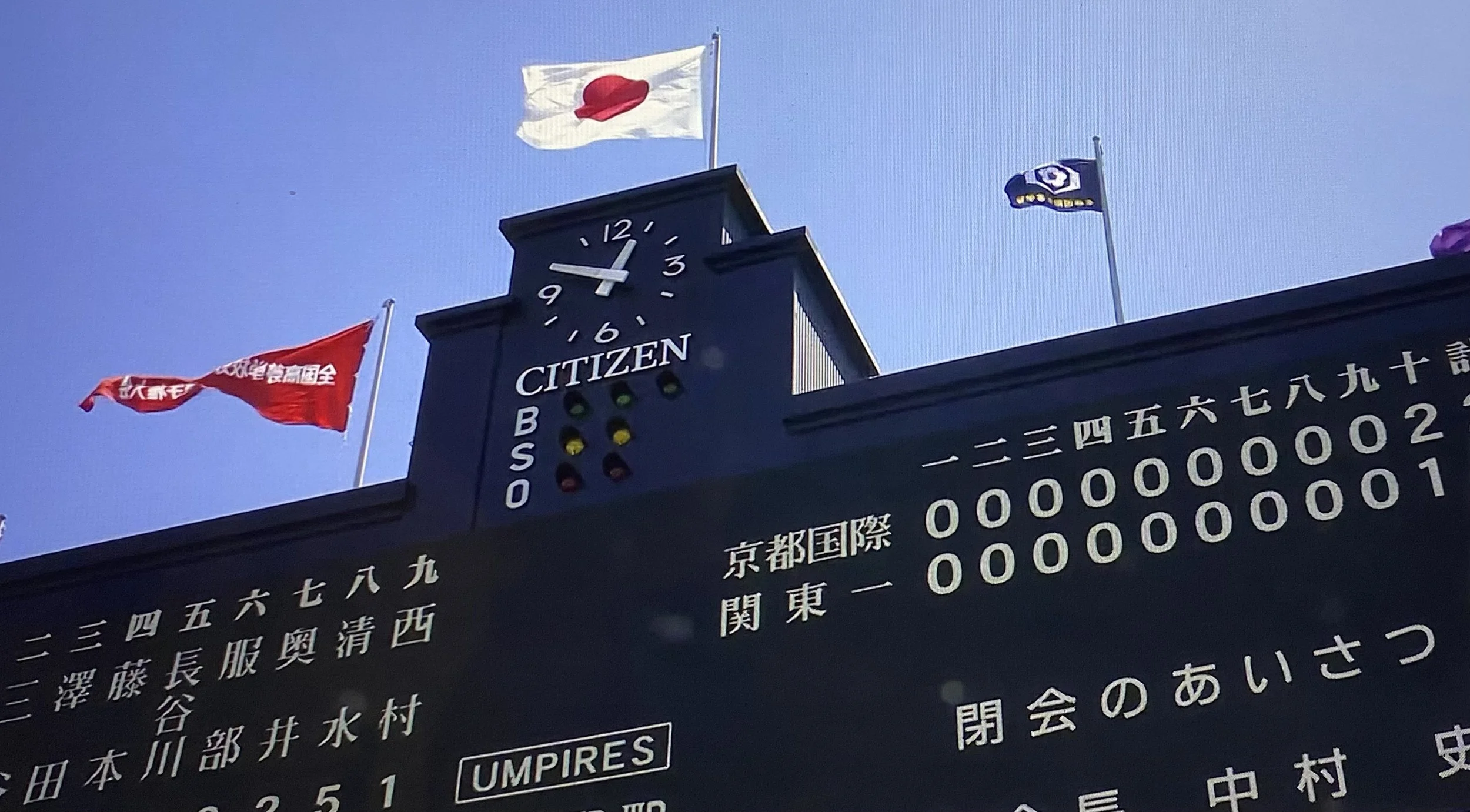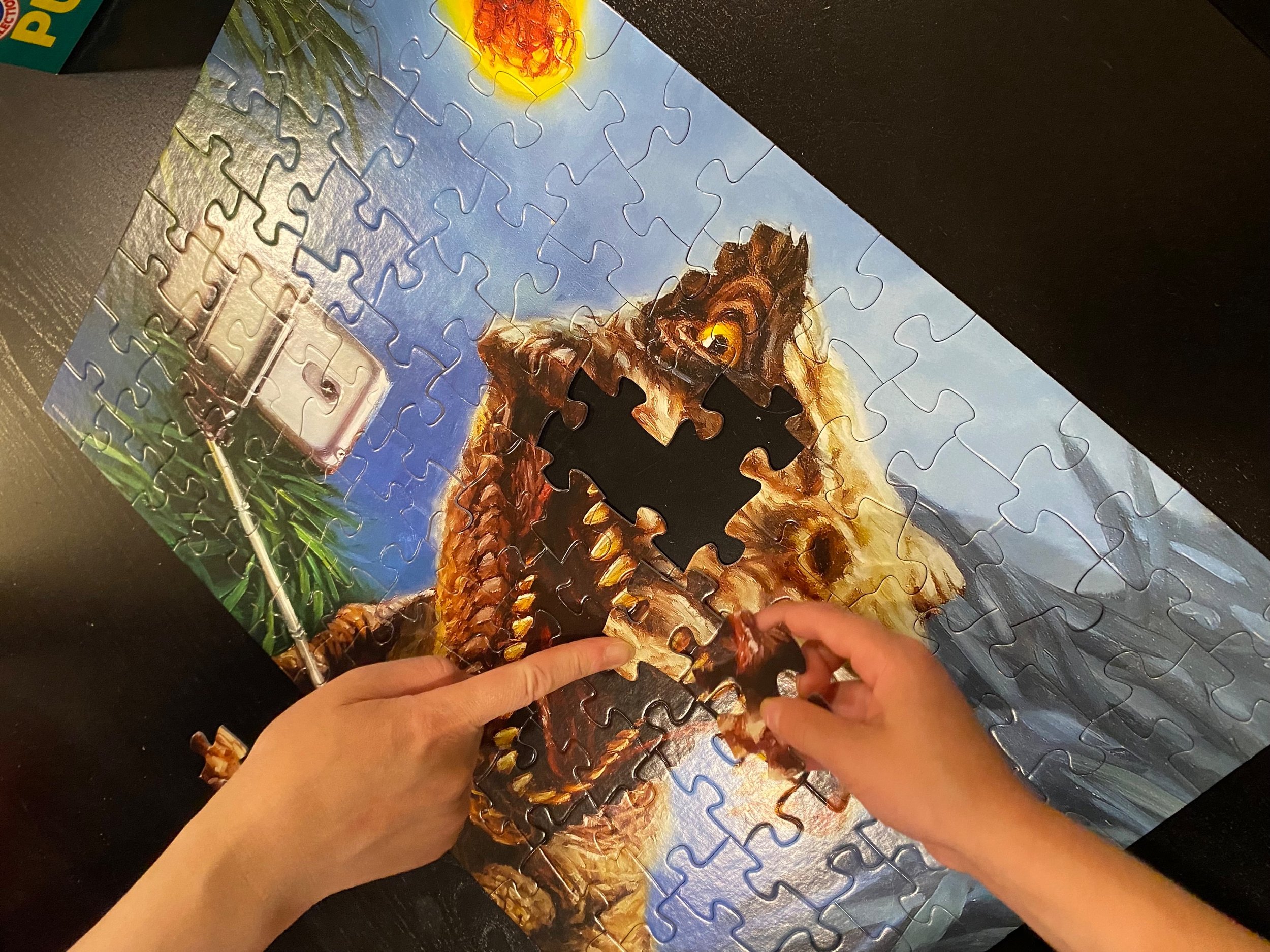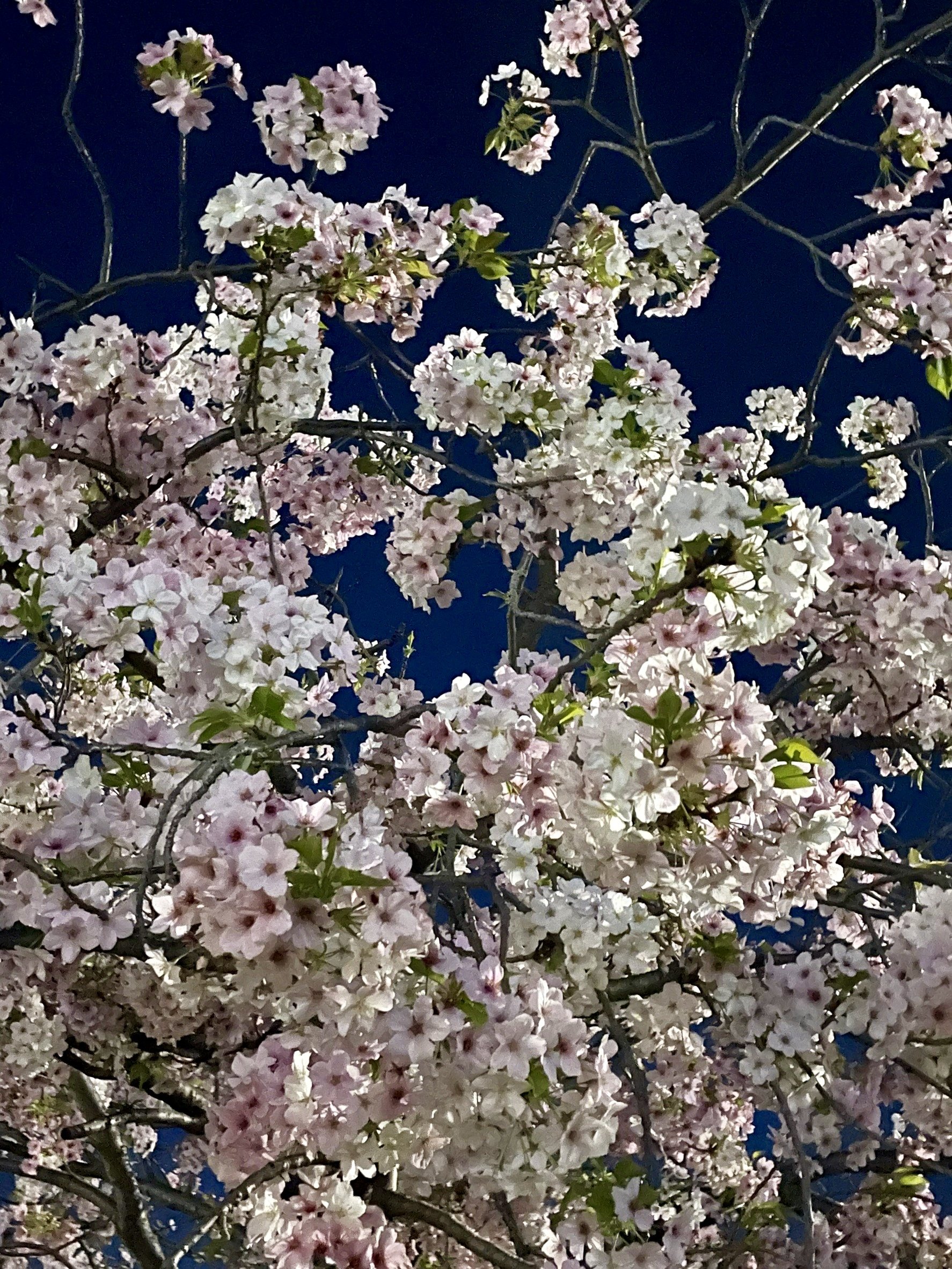2025 Autumn Trip 2025年秋の旅5/5
Sea Turtle Photo Credit: Tommy-san
Yoron Island; the island that will rejuvenate you…
Finally, I'd like to introduce Yoron Island, which I can say was the most enjoyable trip of in my life! The dazzling, clear turquoise and pale aquamarine colors of the ocean and white sand remain in my memory even when I close my eyes! The scorching sun on Yoron Island, the unpretentious, rustic scenery, and the air all have a cleansing effect on the soul. Not only is it a paradise enjoyed by those at the peak of happiness, but I believe that even those experiencing stress or hardship will find healing in both mind and body here.
(The five photos below were provided by Yoko Irisawa.)


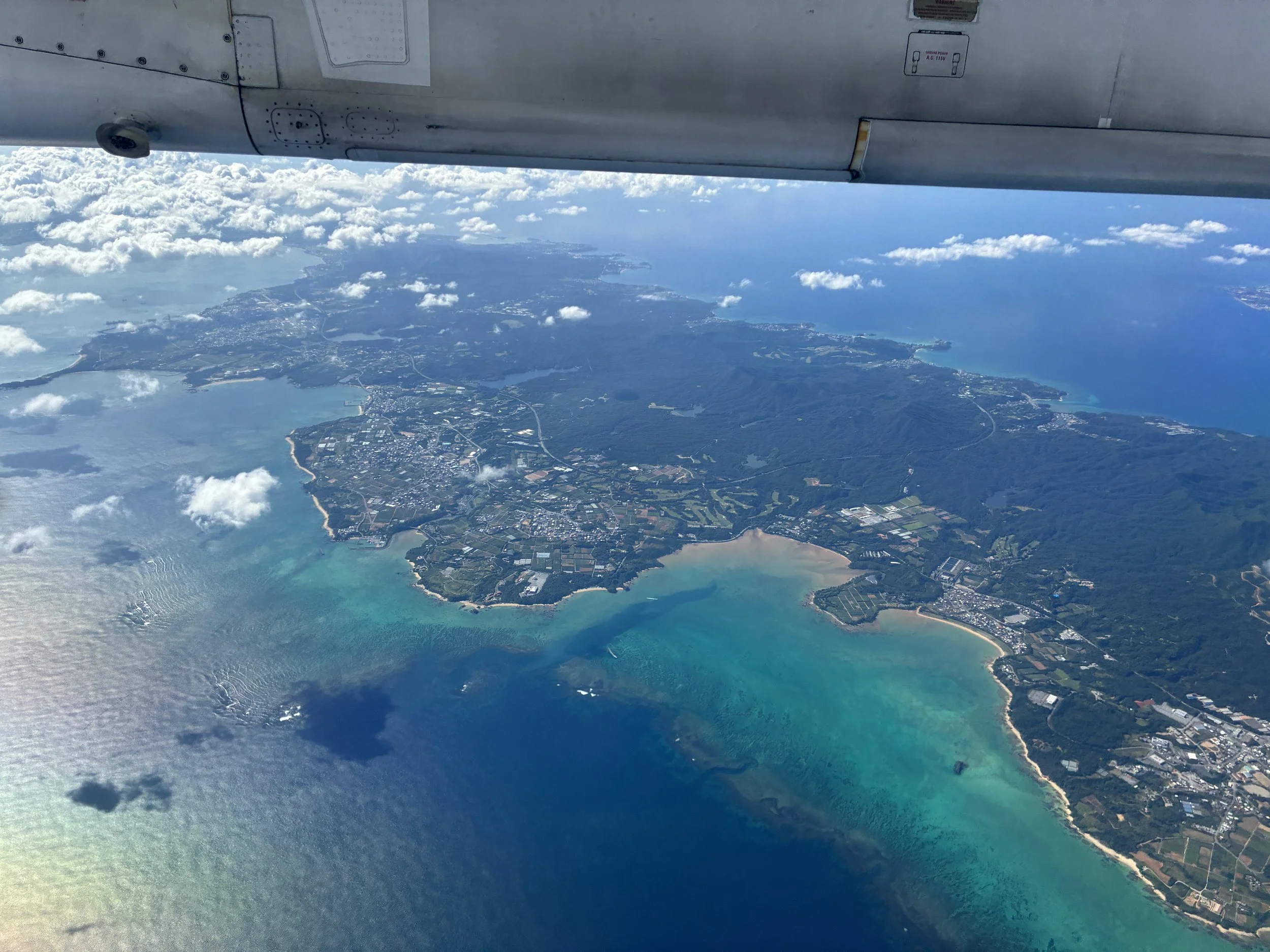


元気(げんき)になれる与論島(よろんとう)
最後(さいご)にご紹介(しょうかい)させていただく与論島は、今(いま)までの私(わたし)の人生(じんせい)で最(もっと)も楽(たの)しかった旅行(りょこう)と言(い)えます!目(め)を瞑(つぶ)っていてもずっと記憶(きおく)に残(のこ)る眩(まぶ)しく輝(かがや)く澄(す)んだターコイズブルーや淡(あわ)い水色(みずいろ)のアクアマリーン色、海(うみ)の色と白(しろ)い砂浜(すなはま)!与論島のヒリヒリと肌(はだ)を焼(や)く太陽(たいよう)も、気取(きど)らない素朴(そぼく)な景色(けしき)も、空気(くうき)も、心(こころ)の清浄効果(せいじょうこうか)があると思(おも)わずにはいられません。幸(しあわ)せの頂点(ちょうてん)にいる人(ひと)が楽(たの)しめる楽園(らくえん)であるだけではなく、ストレスや何(なに)か辛(つら)いことがある人も、ここで心(こころ)も体(からだ)も癒(いや)されると思(おも)います。
(The two photos below were provided by Yoko Irisawa.)
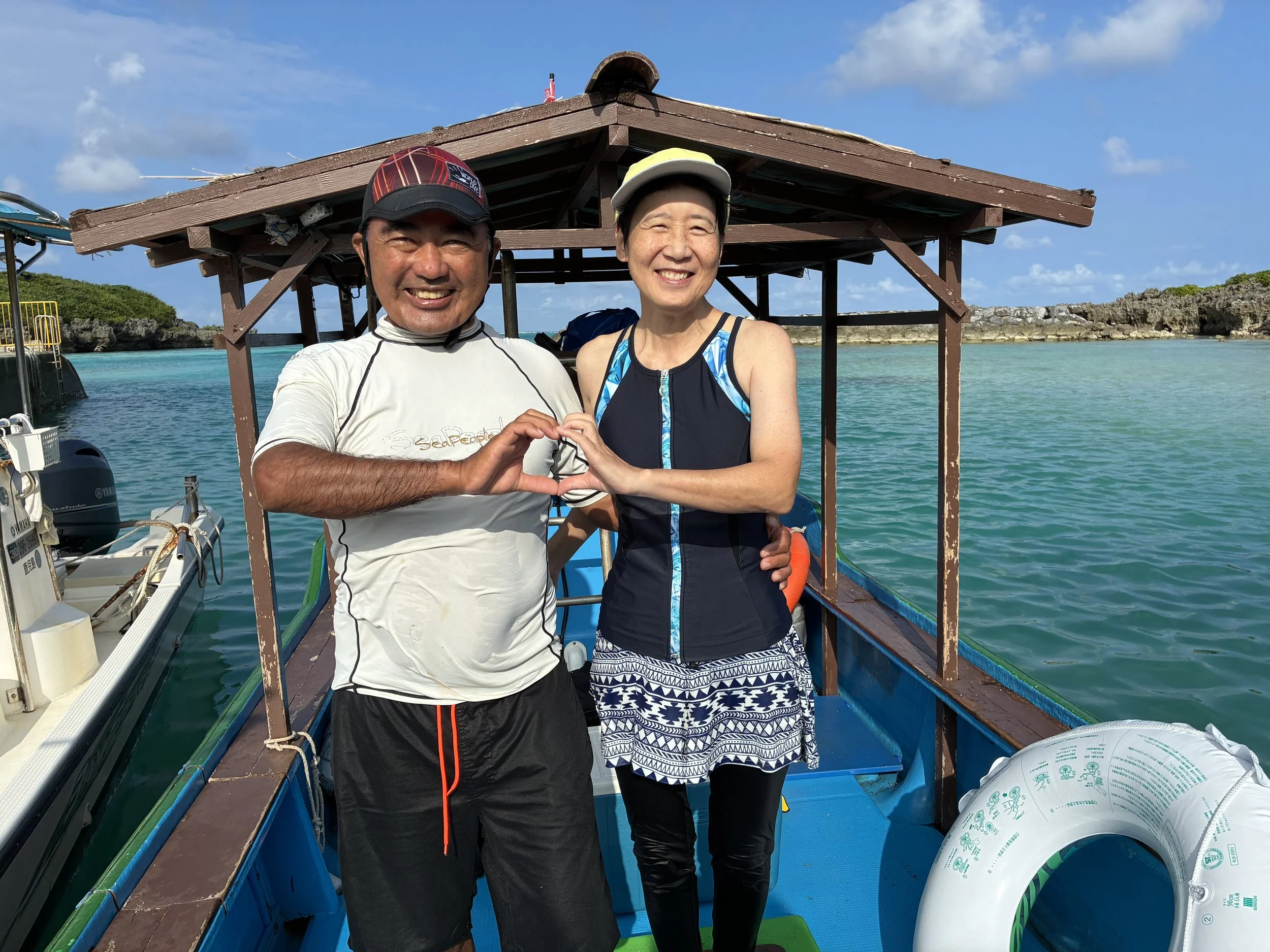
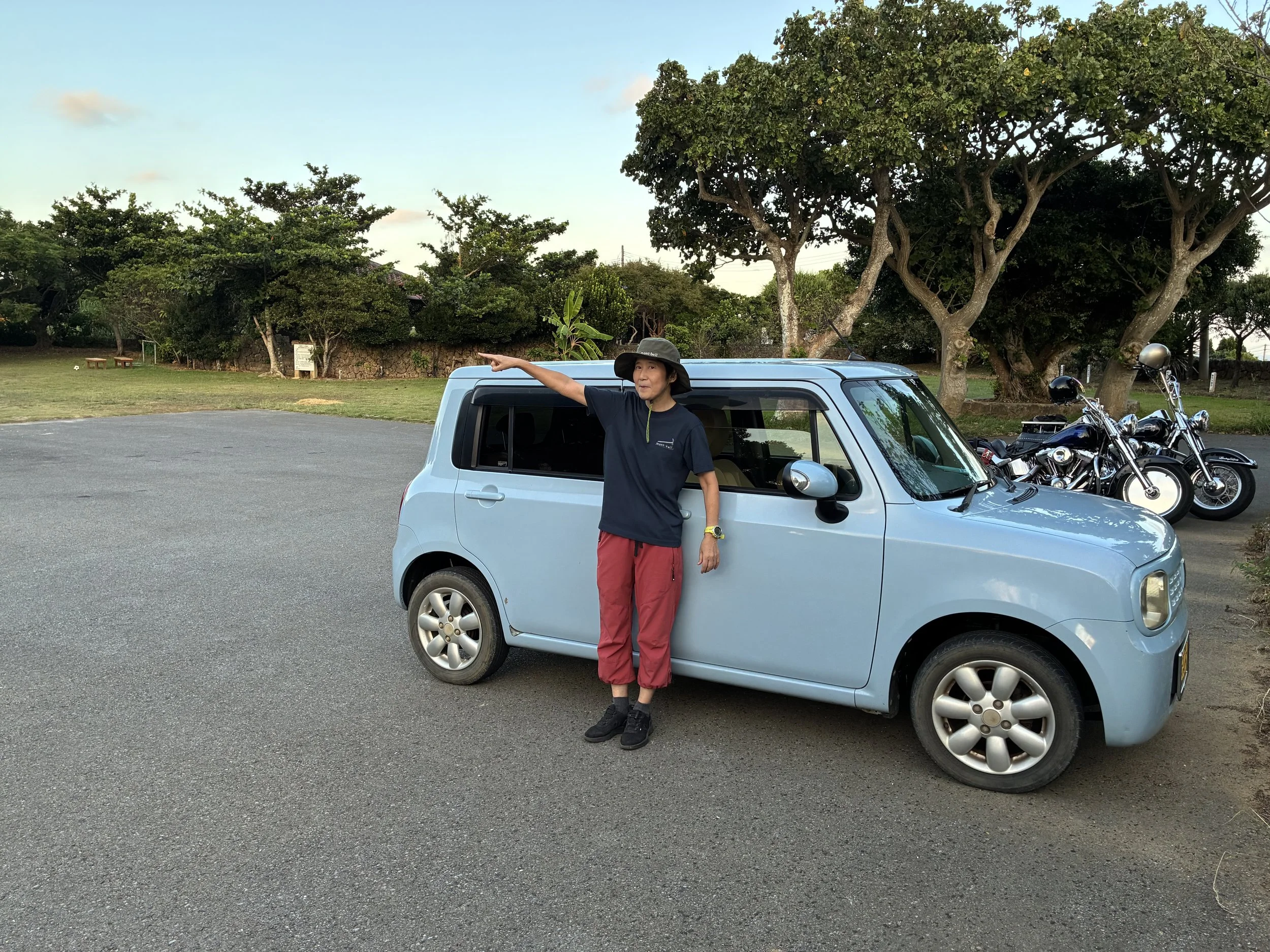
Here, I was very well taken care of by my high school friend Utchan, who works as a licensed driver-guide interpreter in English and Chinese, and Tommy, who took us on our snorkeling tour. The excitement of seeing sea turtles while snorkeling and the color of the ocean were indescribable. Thanks to Utchan's guidance, I was able to quickly visit various places, from numerous beaches to delicious restaurants, and receive detailed explanations. I am truly grateful to them both.
(The three photos below were provided by Yoko Irisawa.)


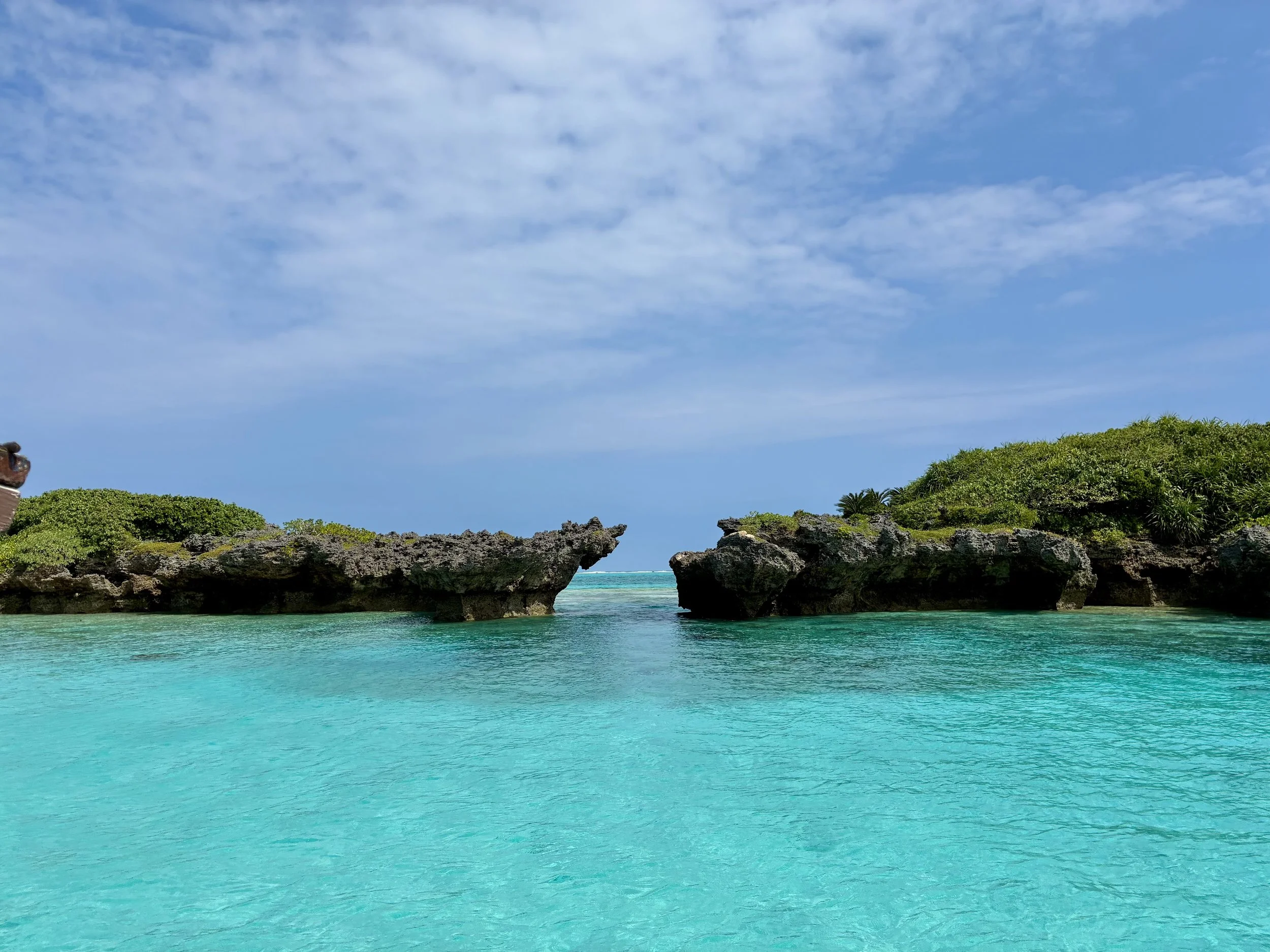
ここでは、英語(えいご)と中国語通訳(ちゅうごくごつうやく)のドライバーガイドをしている高校時代(こうこうじだい)からの友人(ゆうじん)であるうっちゃんとシュノーケリングツアーをしてくださったトミーさんにとてもお世話(せわ)になりました。シュノーケリングで海亀(うみがめ)に会(あ)えた時(とき)の感激(かんげき)や海の色は言葉(ことば)では言(い)い表(あらわ)せないものでした。うっちゃんにガイドをしてもらったお陰(かげ)で、短時間(たんじかん)で数々(かずかず)のビーチから美味(おい)しい食事(しょくじ)が食(た)べられるレストランまで、いろいろな所(ところ)へ車(くるま)で連(つ)れて行(い)ってもらえて、詳(くわ)しい説明(せつめい)もしてもらえました。お二人(ふたり)には心(こころ)から感謝(かんしゃ)しています。
For me, the highlight of the trip was the snorkeling tour where I got to swim with sea turtles! Since I'm not a very good swimmer and it was my first time snorkeling, Tommy, who was steering the boat, took me to the famous Yurigahama Beach and shallow areas where we could encounter sea turtles. It was my first snorkeling experience, and swimming around sea turtles and seeing sea anemones and tropical fish underwater brought me back to childhood!
(The two photos below were provided by Tommy-san.)


さて、私にとってのこの旅(たび)のハイライトは海亀と泳(およ)げたシュノーケリングツアーでした!私はあまり泳げないうえシュノーケリングは初(はじ)めてでしたので、ボートの舵(かじ)を取(と)るトミーさんは有名(ゆうめい)な百合(ゆり)が浜(はま)や浅手(あさて)で海亀と出会(であ)えるところへ連(つ)れて行ってくださいました。初めてのシュノーケル体験(たいけん)で、海亀の周(まわ)りを泳いだり、イソギンチャクや熱帯魚(ねったいぎょ)を海中(かいちゅう)で見(み)られた時(とき)は子供(こども)の頃(ころ)に戻(もど)ったようにはしゃぎました!
While there were several options, I chose to fly from Kansai International Airport to Yoron Island via Naha Airport in Okinawa Prefecture. I enjoyed the comfortable 40-minute flight from Naha to Yoron Island, gazing at the blue ocean and islands from the plane, and this magnificent aerial view even more heightened my anticipation for Yoron Island. I think Yoron Island's airport was the smallest I've ever landed at, but its small size made me feel incredibly comfortable and excited, like I was about to open a gift in a small box. When I left the airport, a shiny Pricia Hotel limousine bus was waiting for me.
(The eight photos below were provided by Yoko Irisawa.)
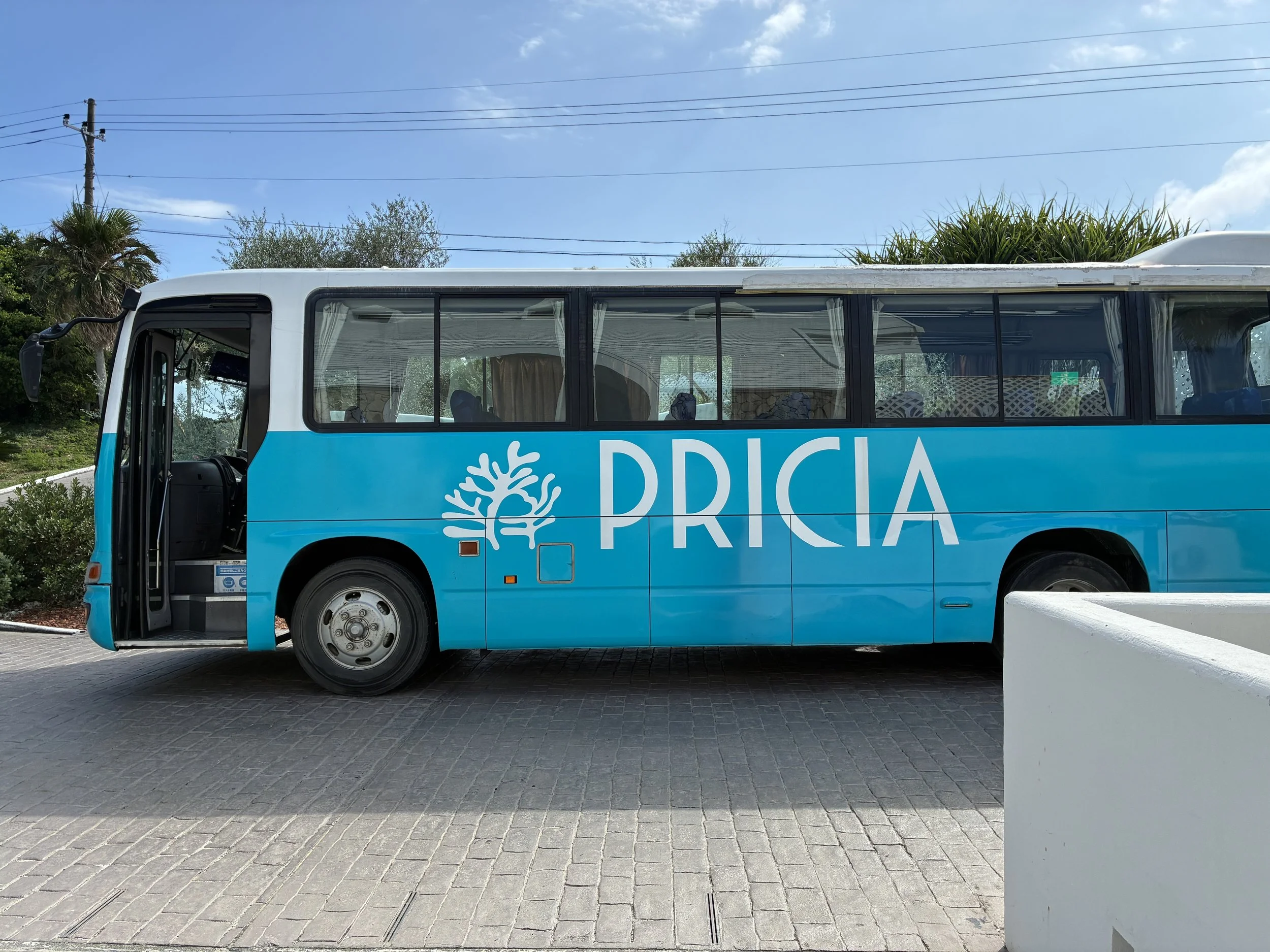
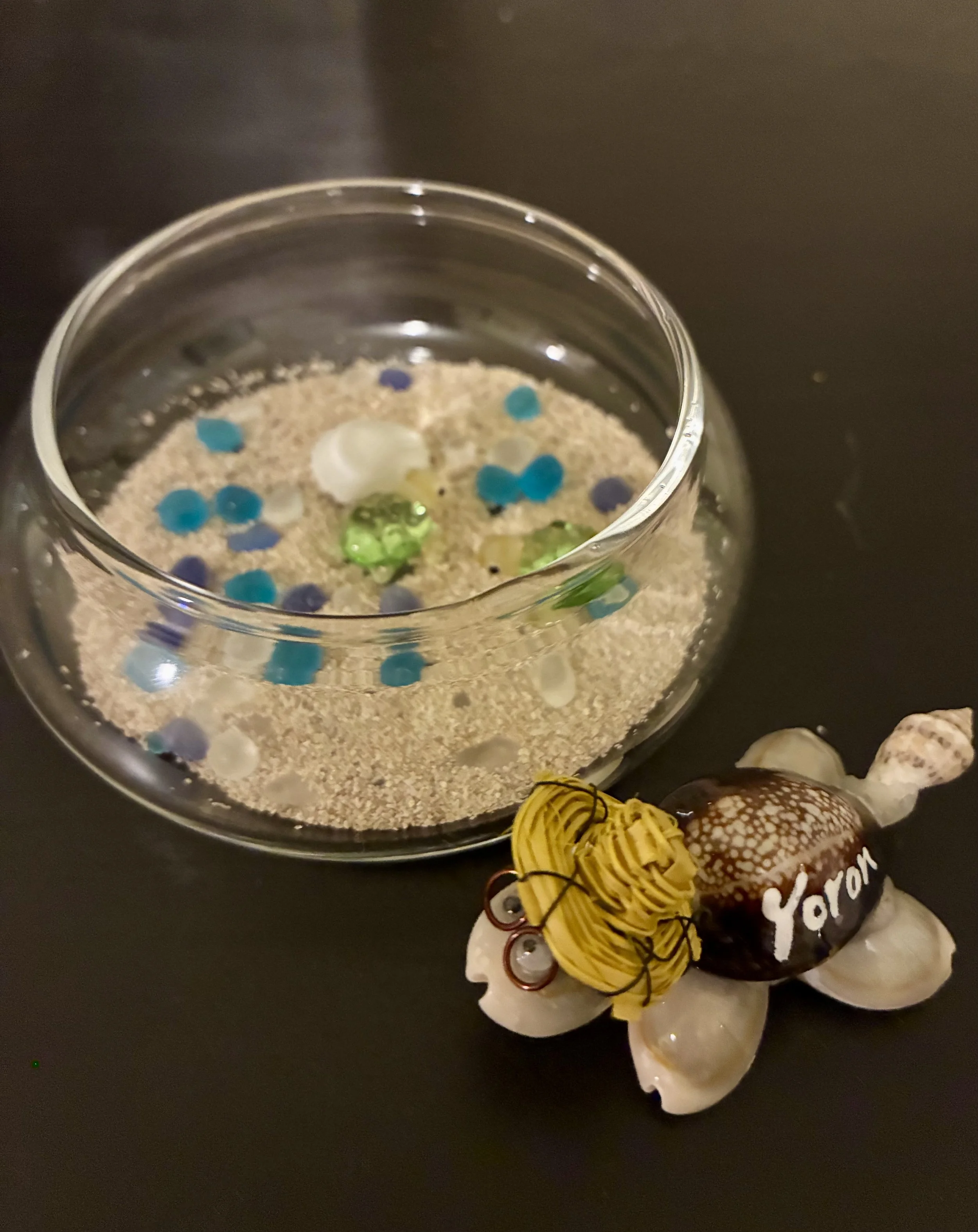



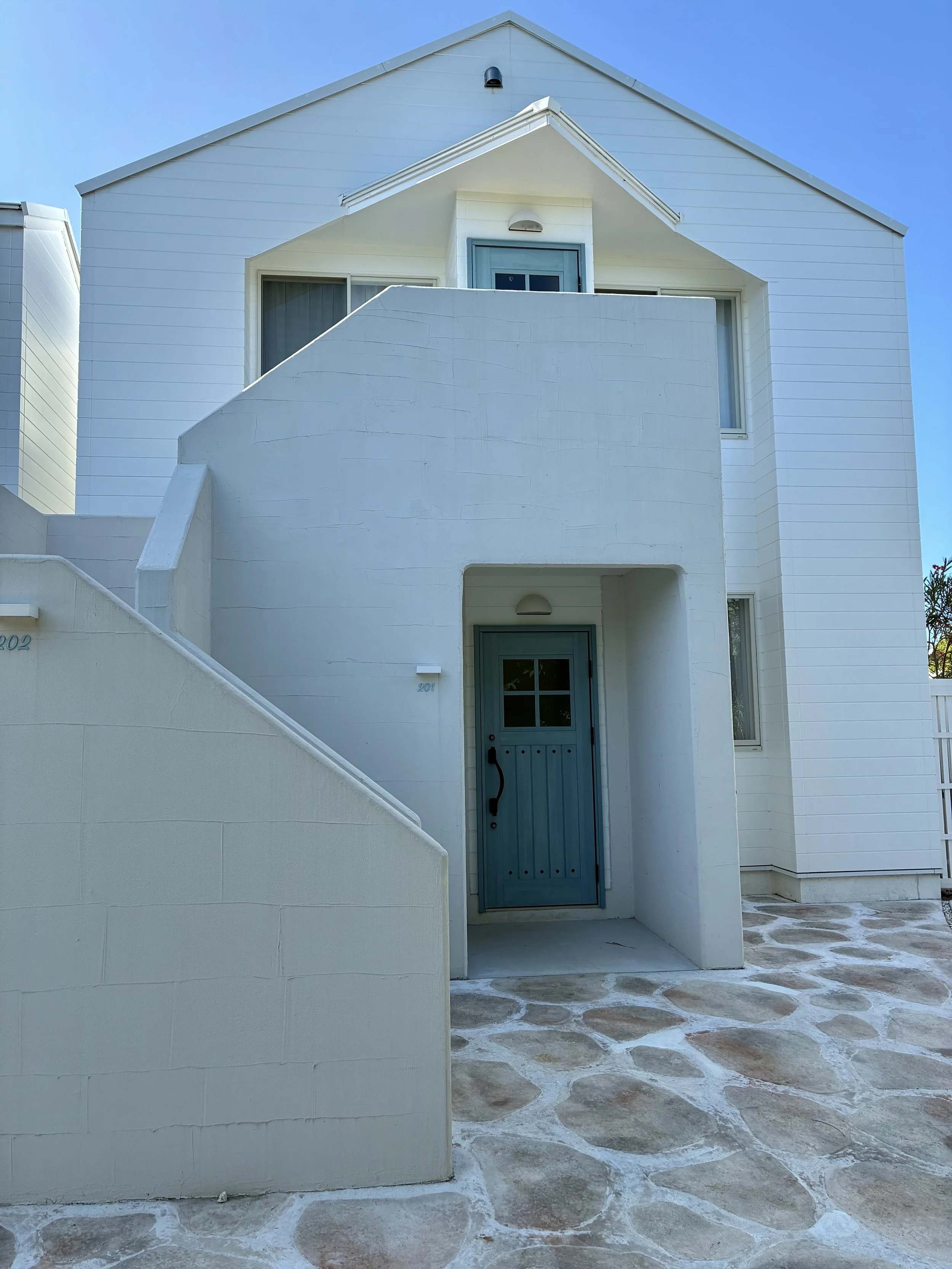
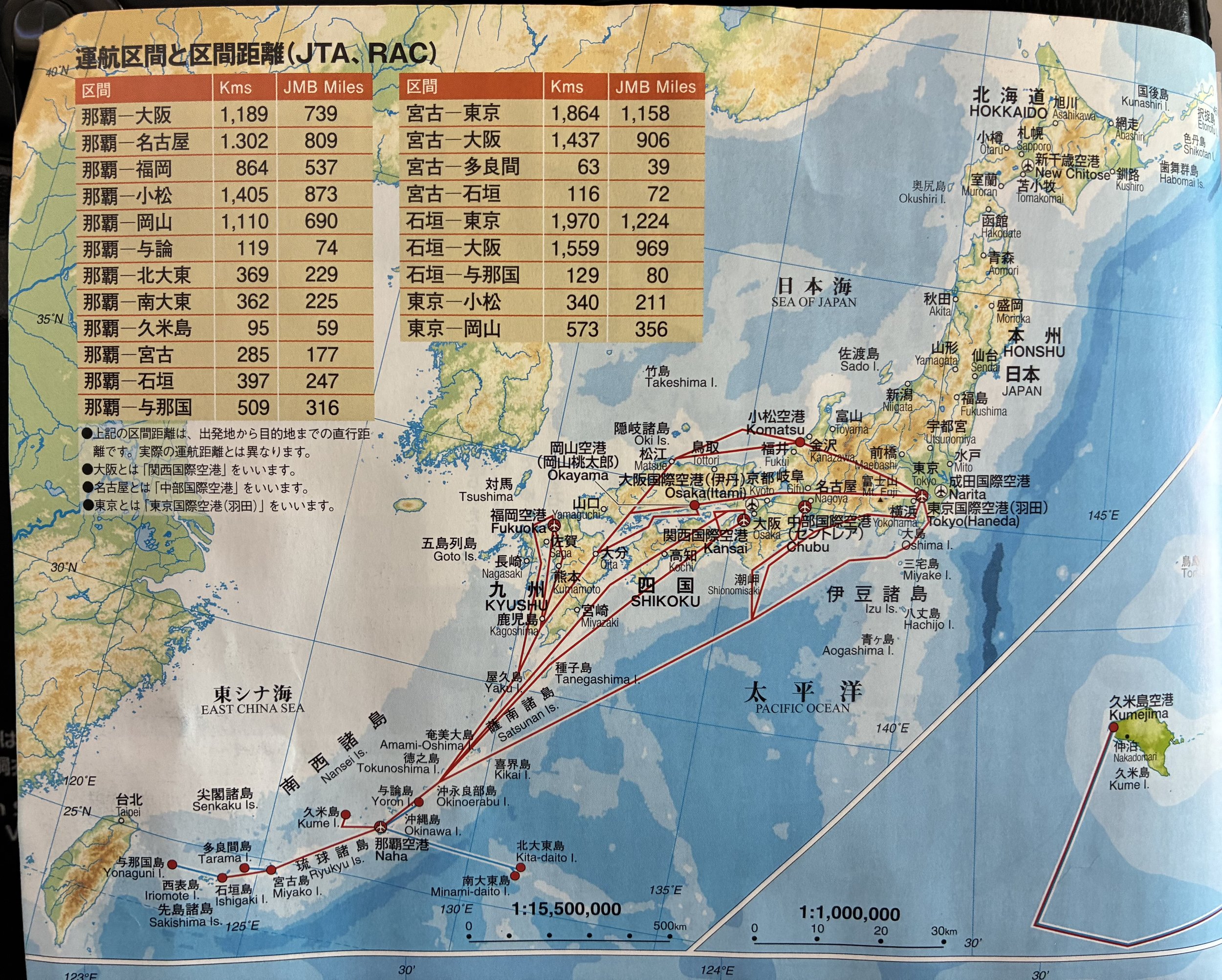

いくつかの選択肢(せんたくし)があった中(なか)、私は関西国際空港(かんさいこくさいくうこう)から沖縄県(おきなわけん)の那覇空港(なはくうこう)経由(けいゆ)で与論島まで飛行機(ひこうき)で行きました。機内(きない)から青(あお)い海と島々(しまじま)を眺(なが)めながら那覇から与論島までの40分間(よんじゅっぷんかん)の快適(かいてき)な空(そら)の旅(たび)を楽(たの)しみ、この素晴(すば)らしい上空(じょうくう)からの眺(なが)めで与論島への期待(きたい)が更(さら)に高(たか)まりました。与論島の飛行場(ひこうじょう)は、今まで私が降(お)り立(た)った飛行場(ひこうじょう)の中(なか)で最(もっと)も小(ちい)さい飛行場だったと思いますが、この小ささがたまらなく心地(ここち)よく、これから小さな箱(はこ)に入(はい)ったプレゼントを開(あ)けるような期待で私をワクワクさせてくれました。飛行場を出(で)ると、プリシアホテルのピカピカのリムジンバスが私を‘待(ま)っていてくれていました。
The Pricia Hotel grounds are lined with white, cottage-like houses that serve as guest rooms. They also have a private beach, restaurants, car and bicycle rentals, and a rainy-day play area featuring numerous manga series. The walk to the restaurant, where I enjoyed a feast breakfast each day, was also wonderful. It was a very comfortable resort hotel I'd definitely like to stay at again.
プリシアホテルの敷地内(しきちない)は客室(きゃくしつ)であるコテージのような白(しろ)い家(いえ)が立(た)ち並(なら)び、プライベート・ビーチやレストランを始(はじ)めとして、レンタカーやレンタサイクル、雨天用(うてんよう)の遊戯施設(ゆうぎしせつ)には数々(かずかず)のマンガのシリーズも兼(か)ね備(そ)えていました。毎日(まいにち)楽(たの)しみにできる豪華(ごうか)な朝食(ちょうしょく)をいただくレストランまでの散歩道(さんぽみち)も最高(さいこう)で、また是非(ぜひ)泊(と)まりたい、とても快適(かいてき)なリゾート・ホテルでした。
Now, let me introduce some of the places Utchan took me to. Yoron Island was formed by the uplift of coral reefs, and despite its small circumference of just 23 kilometers, it apparently has nearly 70 beaches. I was deeply fascinated not only by the suprisingly number of beaches, but also by the beauty of the waters at each beach and the natural beauty that has not been developed into artificial beaches.
さて、うっちゃんに案内(あんない)してもらった所(ところ)をいくつかご紹介(しょうかい)しましょう。与論島は珊瑚礁(さんごしょう)が隆起(りゅうき)してできた島(しま)だそうで、周囲(しゅうい)の距離(きょり)が23キロしかない小(ちい)さな島にも拘(かかわ)らず、70ヶ所(ななじゅっかしょ)近(ちか)くものビーチがあるそうです。その数(かず)の多(おお)さだけではなく、それぞれのビーチの海水(かいすい)の美(うつく)しさや人工的(じんこうてき)な海水浴場(かいすいよくじょう)として開拓(かい‘たく)されていない自然(しぜん)の美(うつく)しさに魅了(みりょう)されました。
The ruins of Yoron Castle, located on high ground and originally begun in the early 15th century as a subsidiary castle of the Ryukyu Hokuzan Dynasty but never completed, offered a panoramic view of the entire island. I thought it was amazing to be able to see the entire island from such a limited-spaced high ground.
The view from the ruins of Yoron Castle, Photo Credit: Yoko Irisawa
While Yoron Island does not have a railway, it does have a fictional Yoron Station. This dream railway is called the "Milky Way Galaxy Railway Main Line" and is set to connect Kagoshima and Okinawa. It's said to be a great place to view the Milky Way and a starry sky that looks like it's falling from the sky. I'd definitely like to take my time gazing at the night sky there next time.
(The six photos below were provided by Yoko Irisawa.)
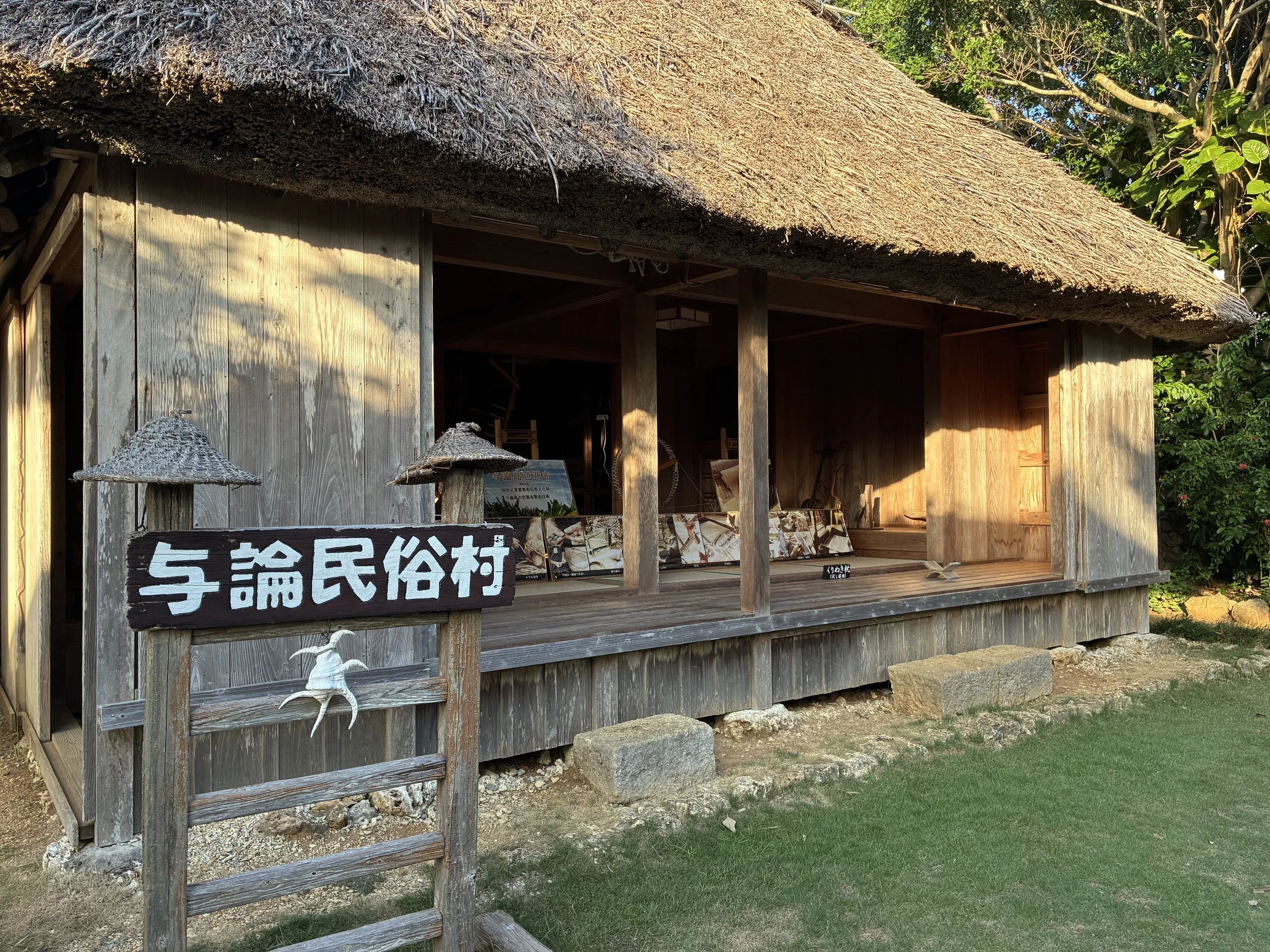
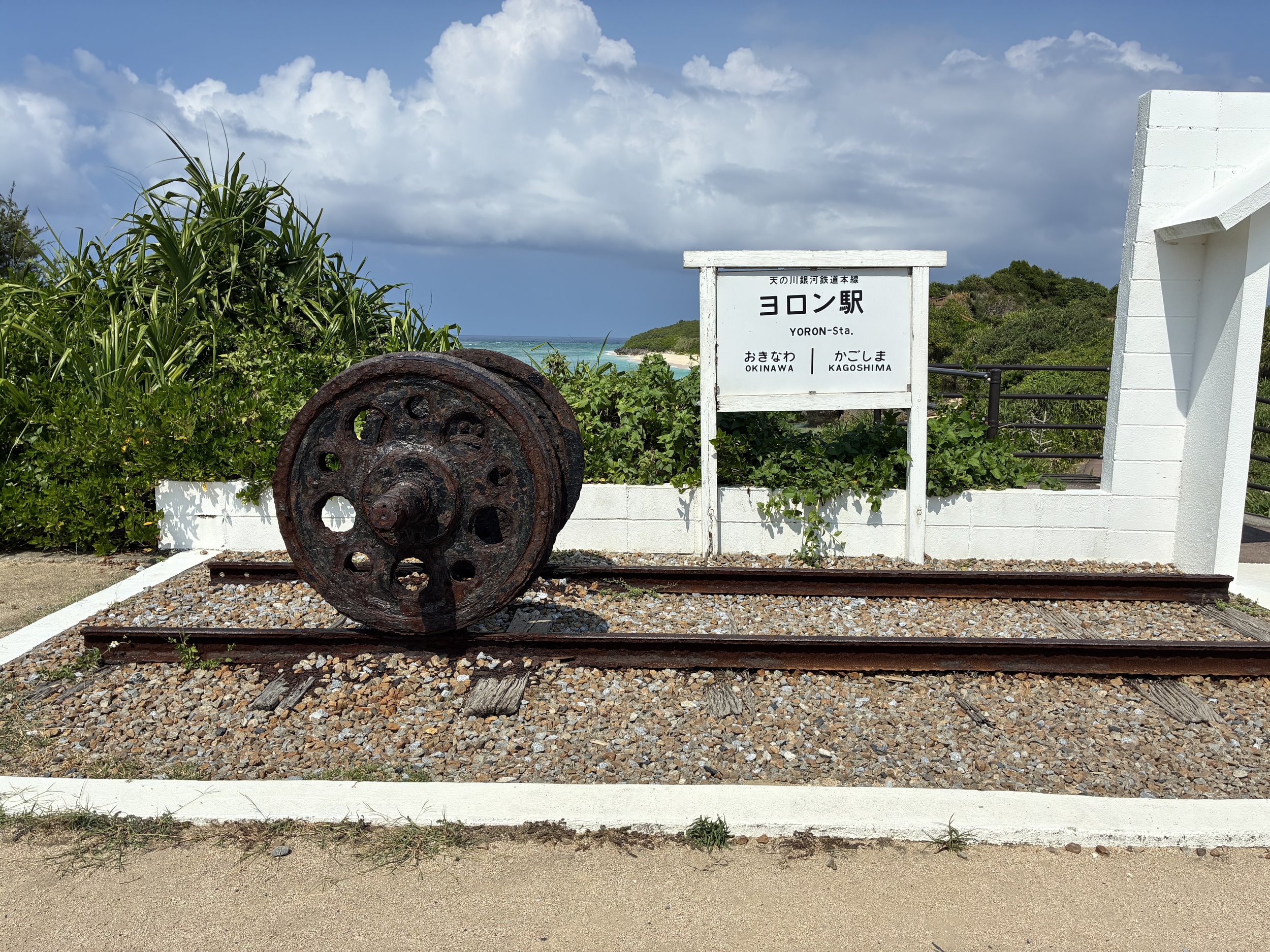
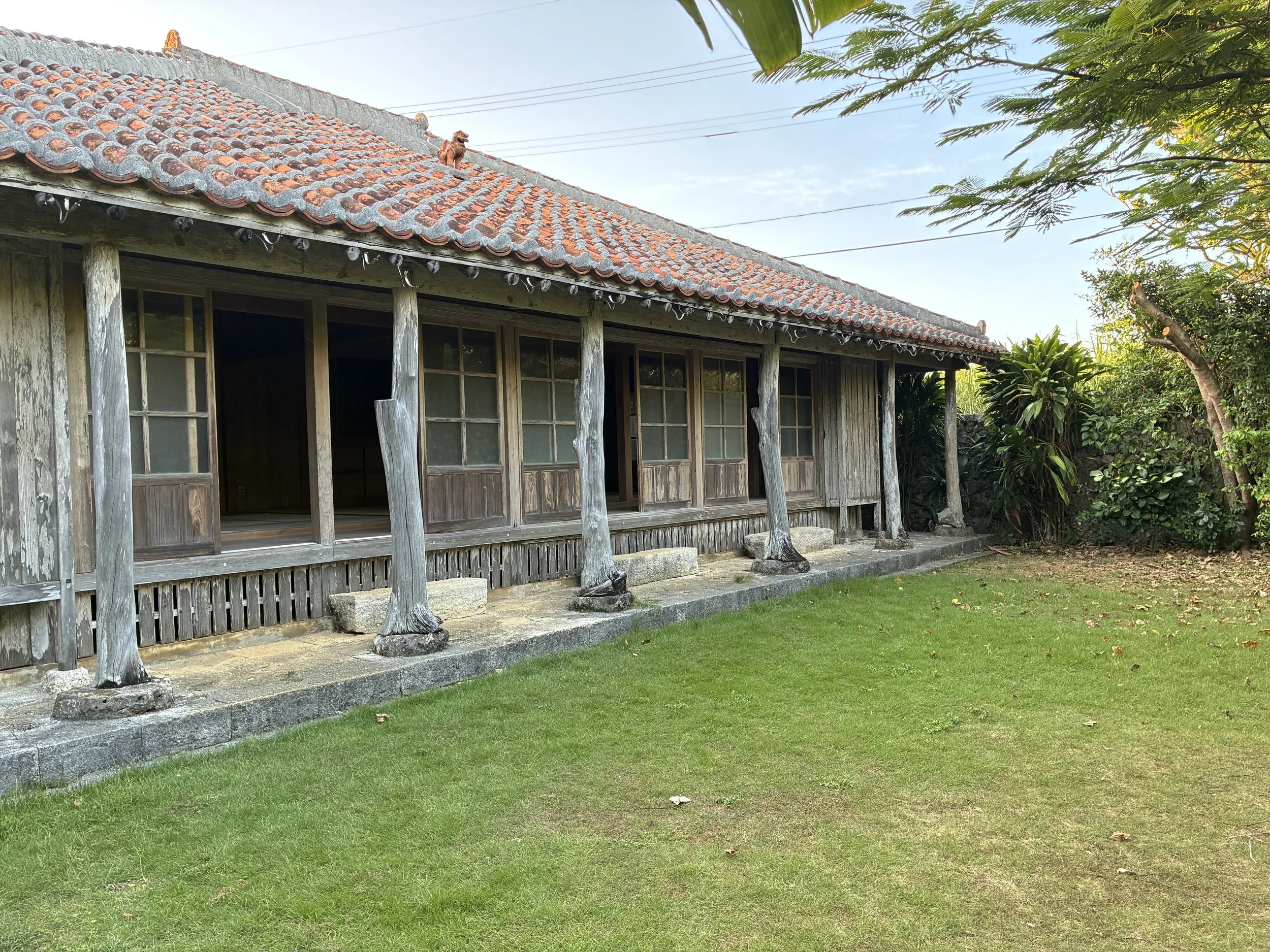
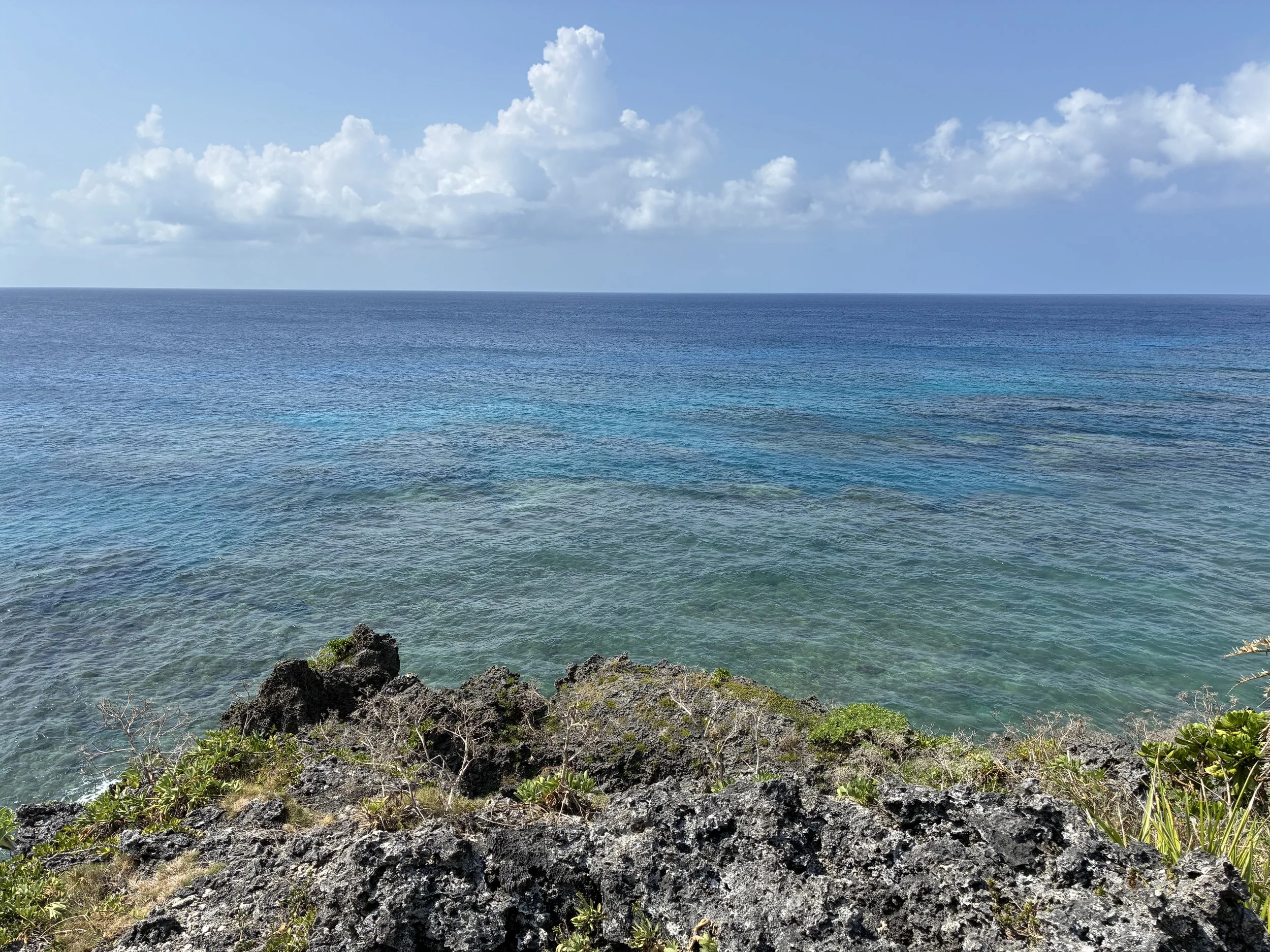

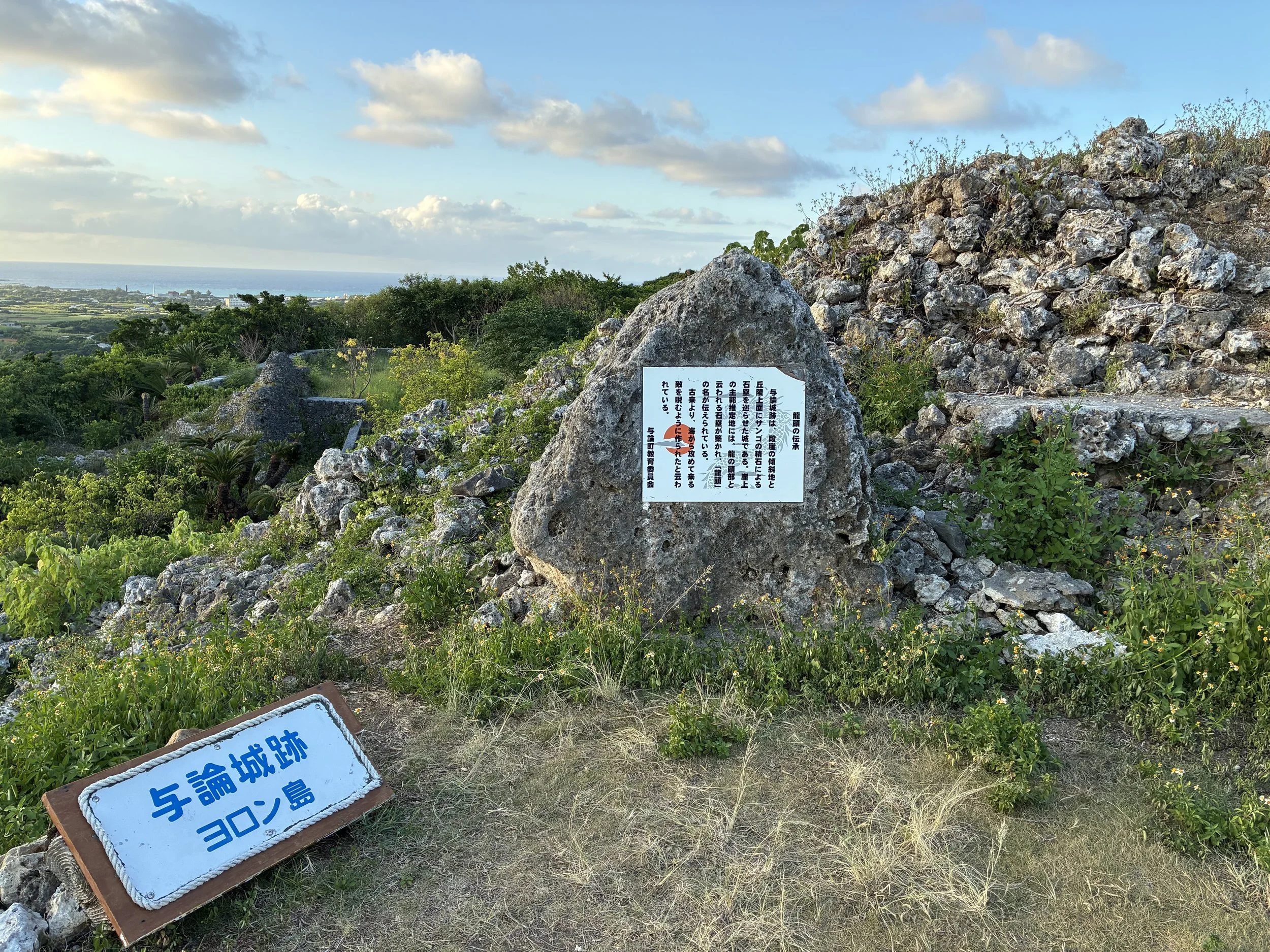
高台(たかだい)にある、15世紀(じゅうごせいき)初(はじ)めに琉球北山王朝(りゅうきゅうほくざん)の支城(しじょう)として建築(けんちく)を開始(かいし)し、未完成(みかんせい)に終(お)わった与論城跡(よろんじょうあと)から島(しま)全体(ぜんたい)が見渡(みわた)せました。島全体が、あまり広(ひろ)くない高台から見渡せるのはすごいなと思いました。
与論島には鉄道(てつどう)はないのですが、空想上(くうそうじょう)の与論駅(よろんえき)があります。この夢(ゆめ)の鉄道は「天の川銀河鉄道本線」(あまのがわぎんがてつどうほうせん)と名付(なづ)けられ、鹿児島(かごしま)と沖縄(おきなわ)を結(むす)んでいるという設定(せってい)です。天(あま)の川(かわ)や星(ほし)が降(ふ)るような星空(よぞら)を眺(なが)めるのに絶好(ぜっこう)の場所(ばしょ)だそうです。今度(こんど)は是非(ぜひ)、そこで夜空(よぞら)をゆっくり眺(なが)めたいです。
At Yoron Folk Village, the Kiku family has carefully preserved and exhibited their thatched roof house made from plants like Japanese silver glass and reeds, as well as old farm equipment. It was a fascinating experience to visit and I would love to try Basho weaving, the traditional method of making Bashofu cloth, when I visit there next.
与論民俗村(よろんみんぞくむら)では、菊(きく)さん御一家(ごいっか)がススキや葦(あし)などを使(つか)った茅葺屋根(かやぶきやね)の民家(みんか)や昔(むかし)の農機具(のうきぐ)などを大切(たいせつ)に保存(ほぞん)し展示(てんじ)されていて、とても興味深(きょうみぶか)く見学(けんがく)させていただけました。伝統的(でんとうてき)な芭蕉布(ばしょうふ)を作(つく)る芭蕉織(ばしょうおり)を体験(たいけん)できるそうなので、今度(こんど)、是非(ぜひ)チャレンジさせていただきたいです。
Speaking of traveling, I'm always curious about the local food, and here, fish and seaweed are what I would recommend. The breakfast at the Pricia Hotel where I stayed was an amazingly luxurious selection of Japanese, Western, Mediterranean, and Chinese dishes, as well as desserts and drinks. The Japanese restaurant "Piki" also served delicious charcoal-grilled seafood, vegetables, and sushi.
(The six photos below were provided by Yoko Irisawa.)
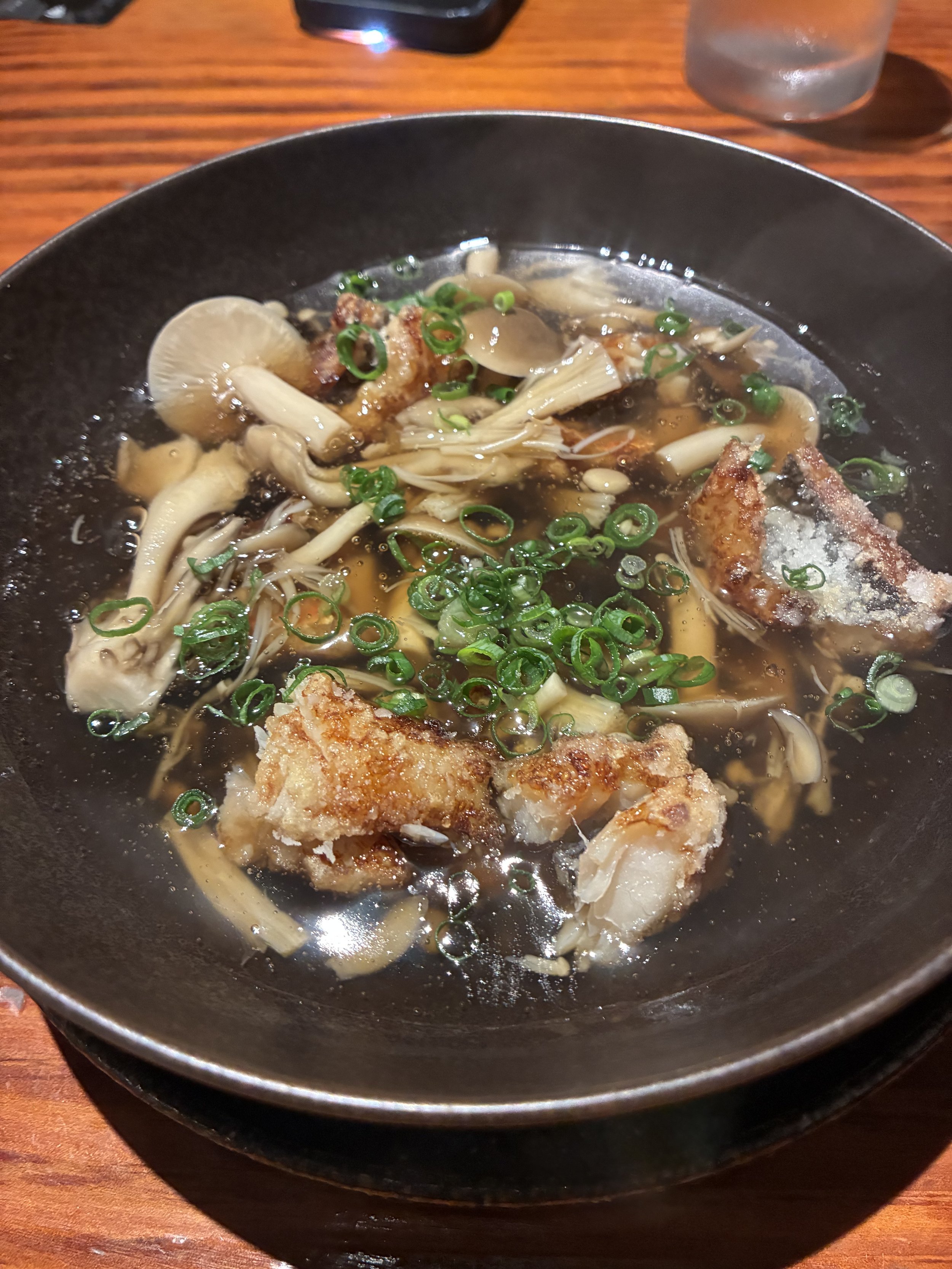
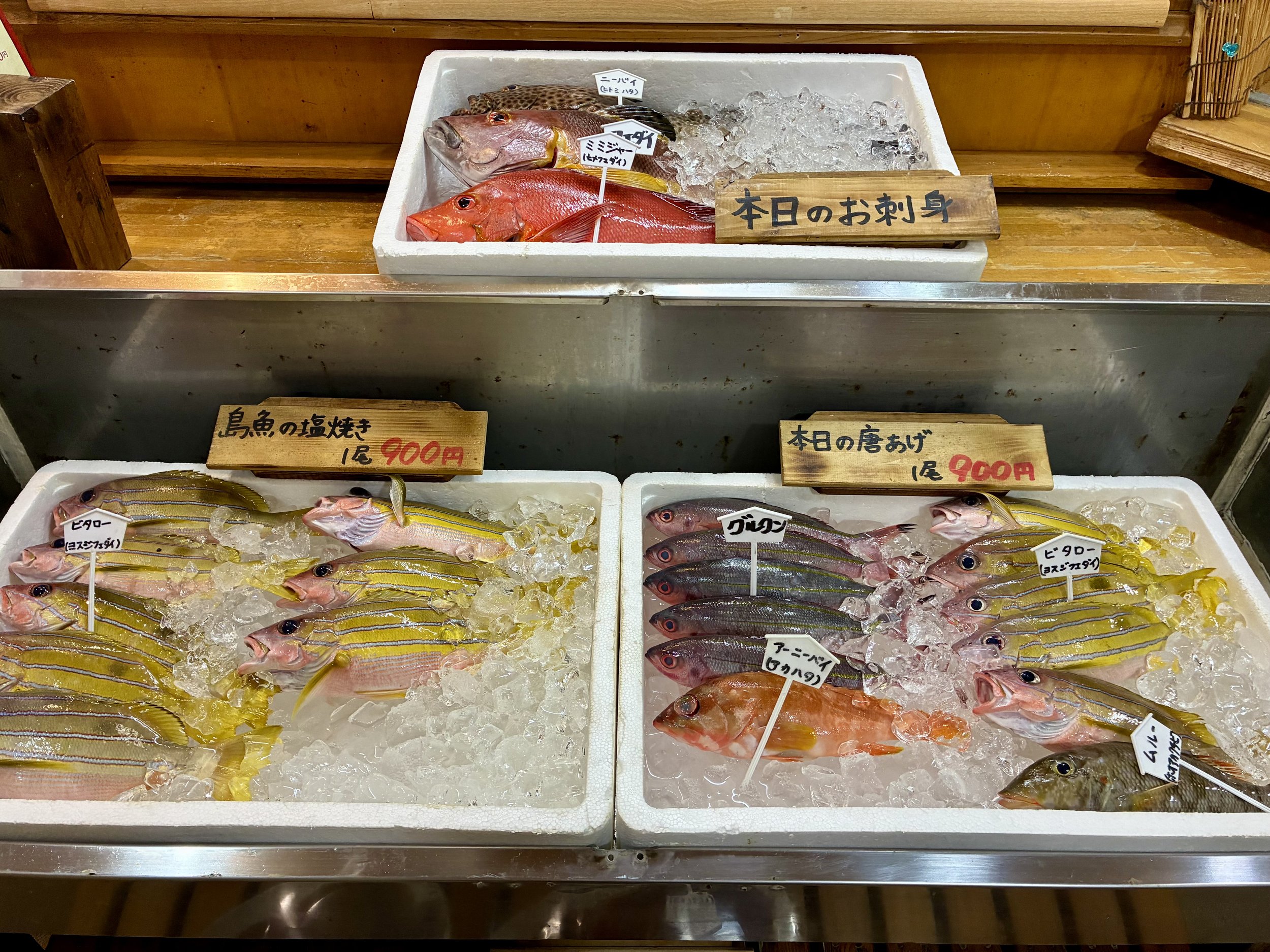
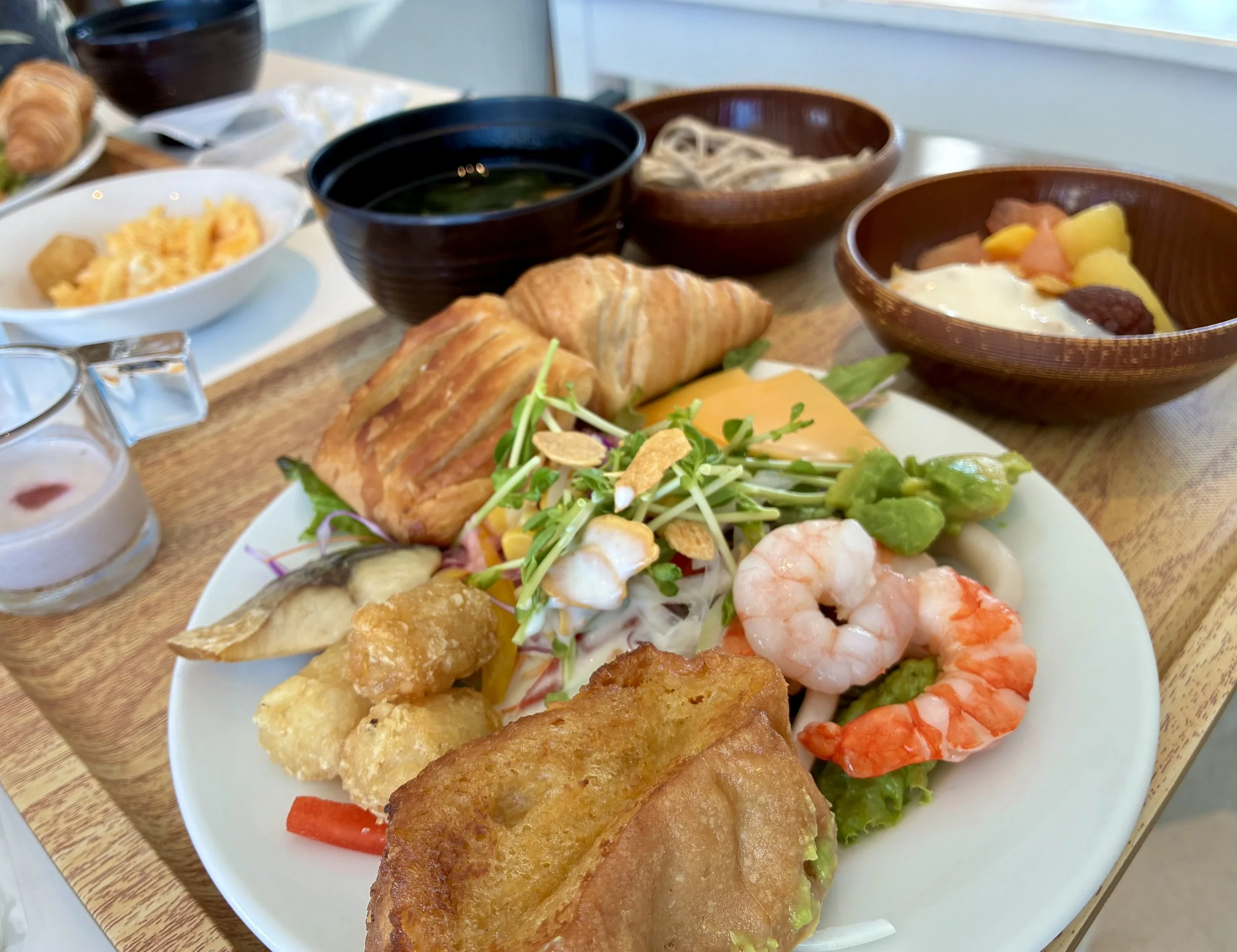
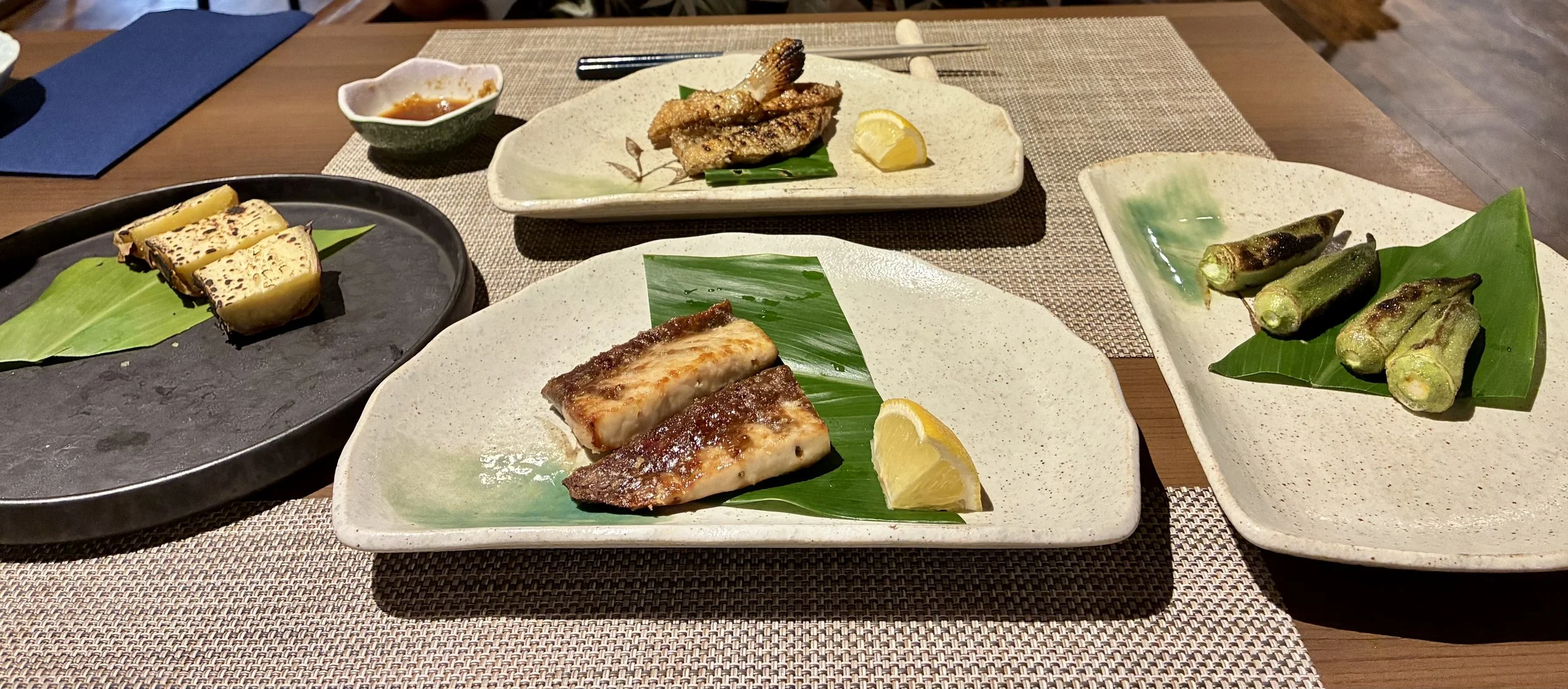
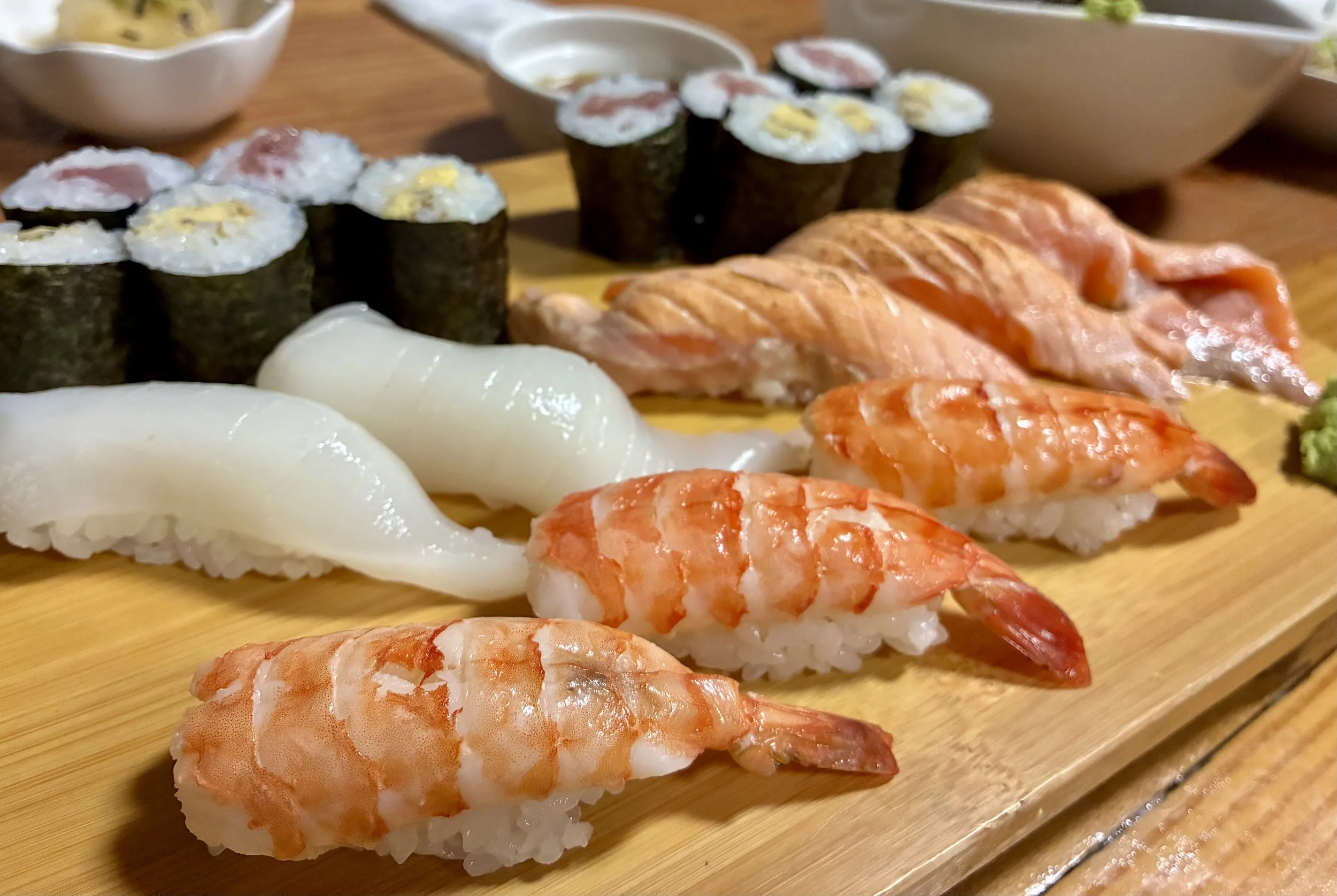

One of the restaurants where Utchan took me, Cafe Remember, was a wonderful cafe, serves healthy and delicious dishes using plenty of vegetables harvested on the island, including meat-free dishes and fermented germinated brown rice. It satisfied both my mind and body.
(The two photos below were provided by Yoko Irisawa.)
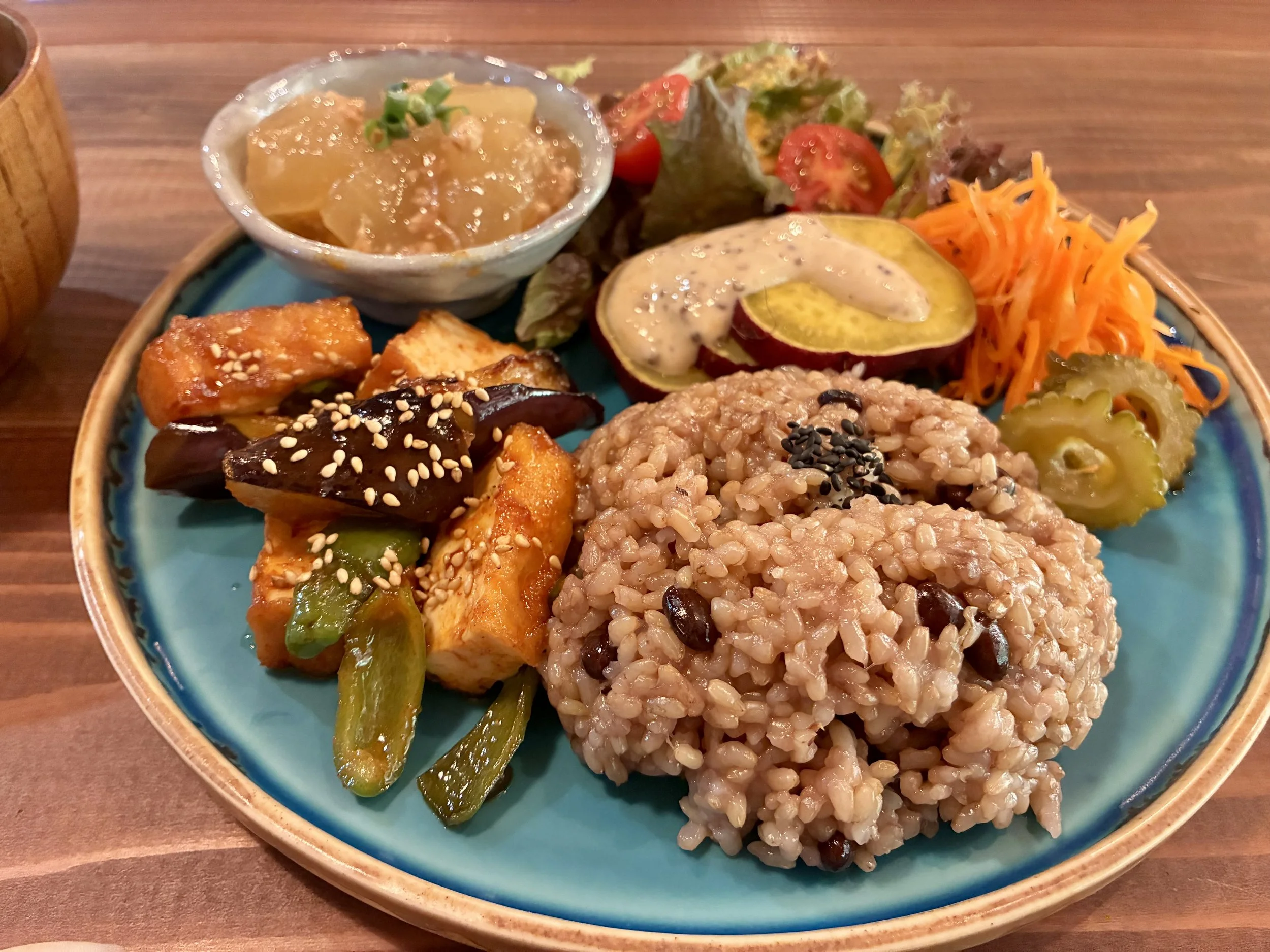

旅(たび)と言(い)えば、当地(とうち)の美味(おい)しい食(た)べ物(もの)が気(き)になりますが、ここはやはり魚(さかな)や海藻(かいそう)だと思(おも)います。宿泊(しゅくはく)したプリシアホテルの朝食は和食(わしょく)、洋食(ようしょく)、地中海風(ちちゅうかいふう)、中華(ちゅうか)やデザートやドリンクもとても驚(おど)くほどの豪華版(ごうかばん)でしたが、和食の「ぴき」と言うレストランでは炭焼(すみや)きの魚介類(ぎょかいるい)や野菜(やさい)、お寿司(すし)もとても美味しかったです。
うっちゃんに紹介(しょうかい)してもらったCafe Rememberという素敵(すてき)なカフェでは、島(しま)で獲(と)れた野菜(やさい)を豊富(ほうふ)に使(つか)い、お肉(にく)を使わない料理(りょうり)、酵素玄米(こうぞげんまい)など健康的(けんこうてき)で美味しいお料理を提供(ていきょう)してくれています。心(こころ)も身体(からだ)も満足(まんぞく)できました。
The guide map of Yoron Island is very comprehensive, with information on restaurants, souvenirs, and accommodations. The guidebook translated into English by Utchan provides a wealth of information, including recommended sightsees spots, tours, and craft classes. Utchan’s comment that “Yoron Island has many repeat visitors” makes perfect sense.
与論島のガイドマップはとても充実(じゅうじつ)していて、レストラン、お土産(みやげ)、宿泊の情報(じょうほう)も載(の)っています。うっちゃんが英語で翻訳(ほんやく)したガイド冊子(さっし)はお薦(すす)めの観光地(かんこうち)やツアーやクラフトの教室(きょうしつ)など盛(も)りだくさんの情報を提供(ていきょう)してくれています。ウッちゃんが言(い)った言葉(ことば)、「与論島はリピーターが多(おお)い」というのはとても納得(なっとく)がいきます。
Apparently, Yoron Island residents and visitors gather early every morning to clean the beaches. Without their daily efforts, we wouldn’t be able to see this beautiful oceans. It was impressive to see everyone I met on the island, enjoying their lives and cherishing it so much. I hope that the next generation and the generations after will protect the island’s natural environment, including the sea, its natural surroundings, and the coral and other creatures that live there, so that they can continue to live on this island surrounded by beautiful oceans for many years to come.
与論島に住(す)んでおられる皆(みな)さんや旅行者(りょこうしゃ)の方々(かたがた)は毎日(まいにち)のように早朝(そうちょう)から集(あつ)まってビーチの清掃(せいそう)をしてくださっているそうです。皆さんの日々(ひび)の努力(どりょく)なしではこの美(うつく)しい海を見(み)ることはできなかったでしょう。この島で出会(であ)った皆さんが島を大切(たいせつ)にしながら楽(たの)しそうに生活(せいかつ)されているのが印象的(いんしょうてき)でした。この海も自然(しぜん)も海に生(い)きる珊瑚(さんご)や他(ほか)の生(い)き物(もの)たちも私達(わたしたち)の次(つぎ)の世代(せだい)やまた次の世代に住む人達(ひとたち)に島の自然(しぜん)を守(まも)ってもらって、末長(すえなが)く美しい海に囲(かこ)まれた島に住んでもらえることを祈(いの)っています。
I hope that this island will forever remain as beautiful as Dream Island… Among the places Utchan showed me, there was art of Doraemon’s Dokodemo Door. When the animated character Doraemon draws a door, you can go anywhere you want thought it. I hope that tonight when I open the Dokodemo Door in my dream, the beautiful Ocean of Yoron Island will be spread out before my eyes…
(The three photos of Dokodemo Door were taken by Utchan. The Ocean photo was taken by Yoko Irisawa.)
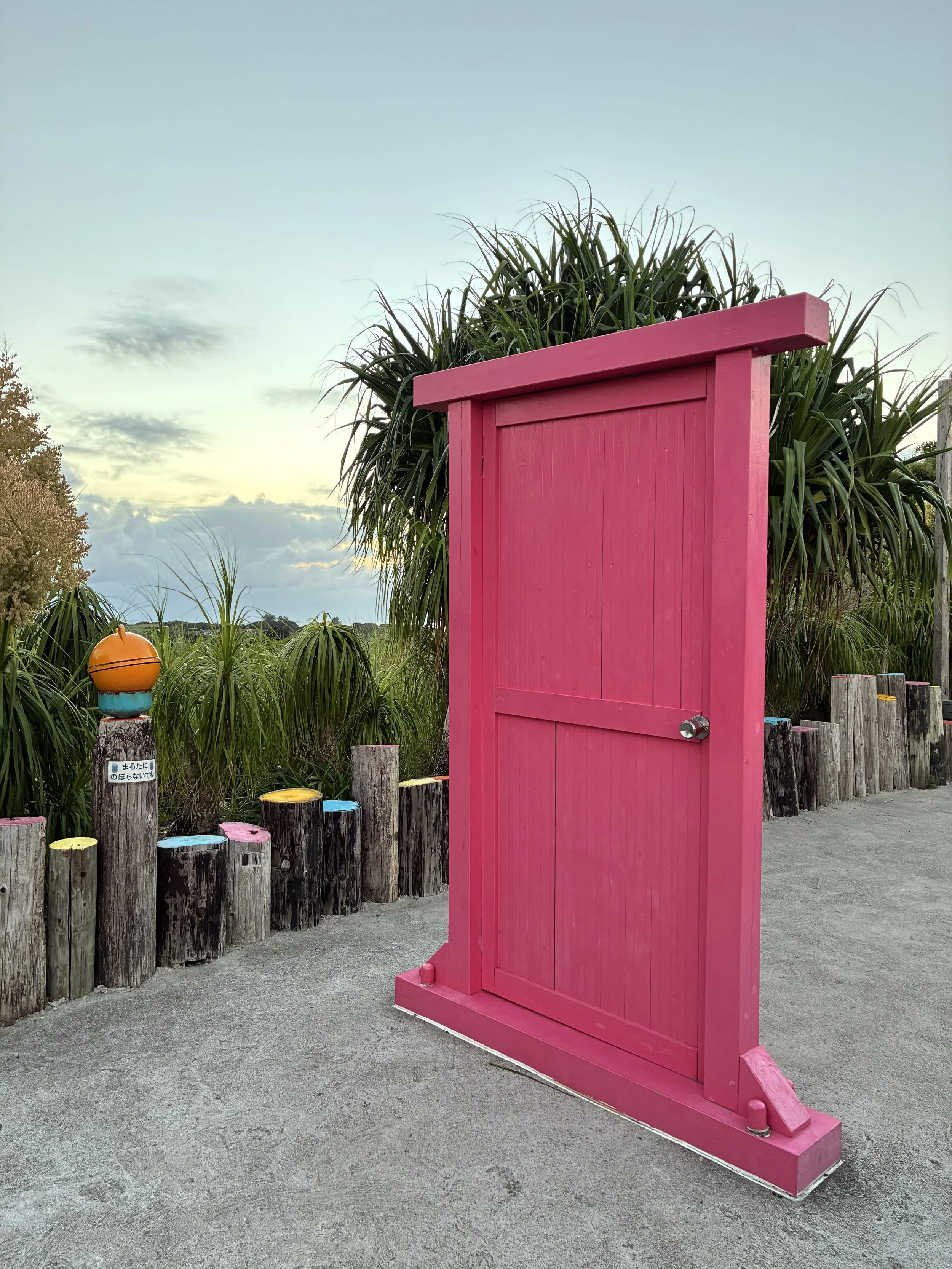
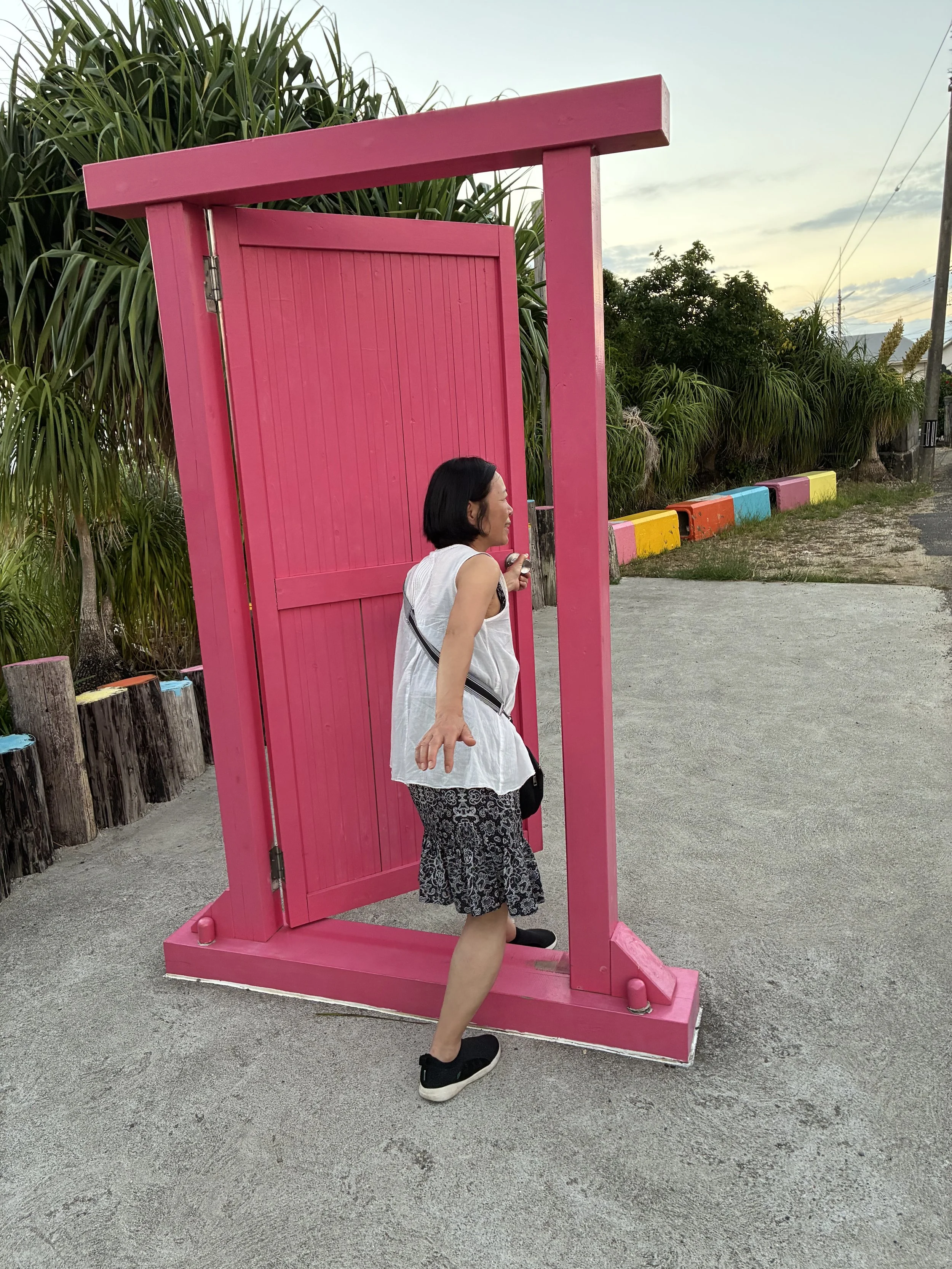
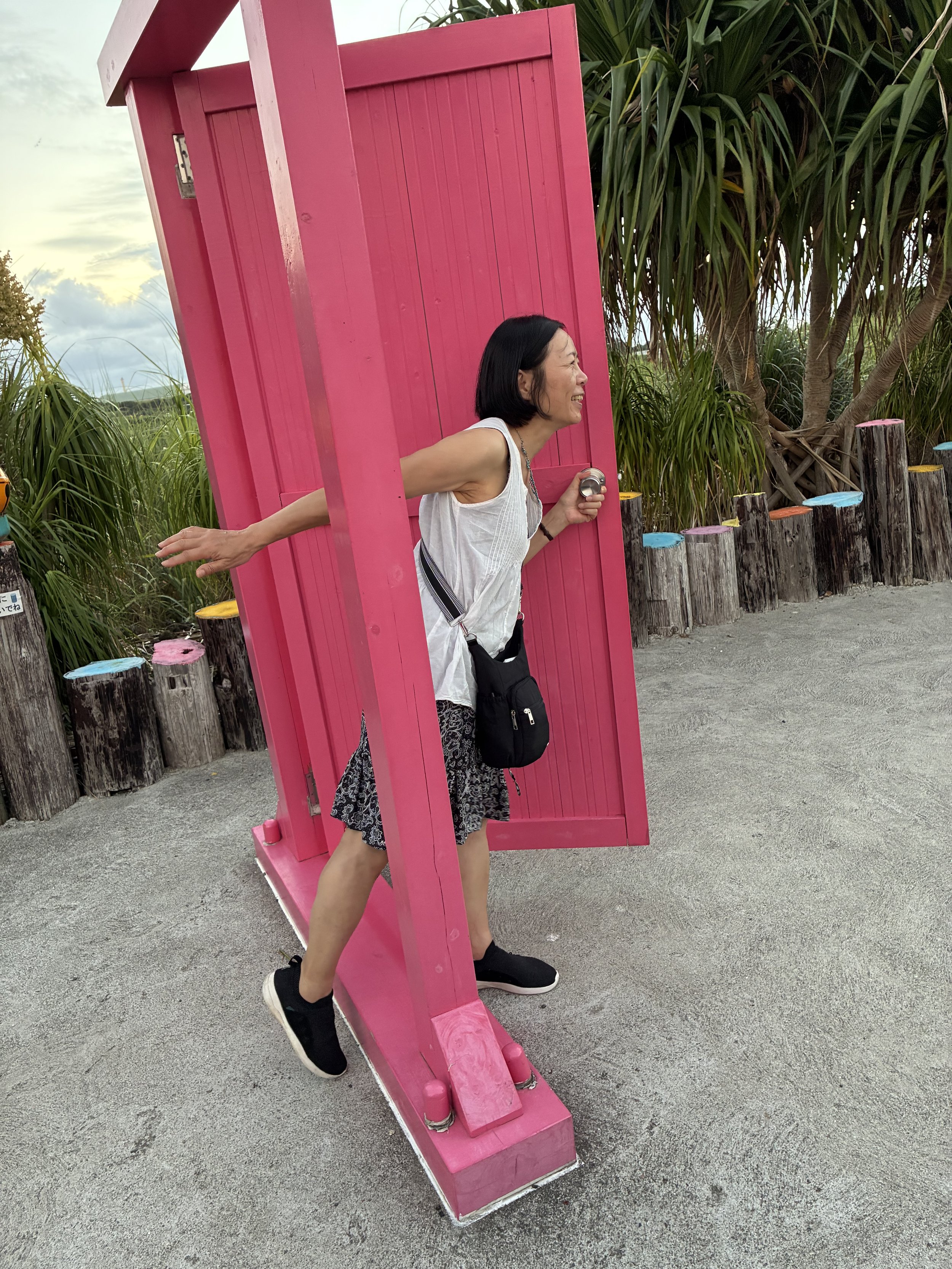
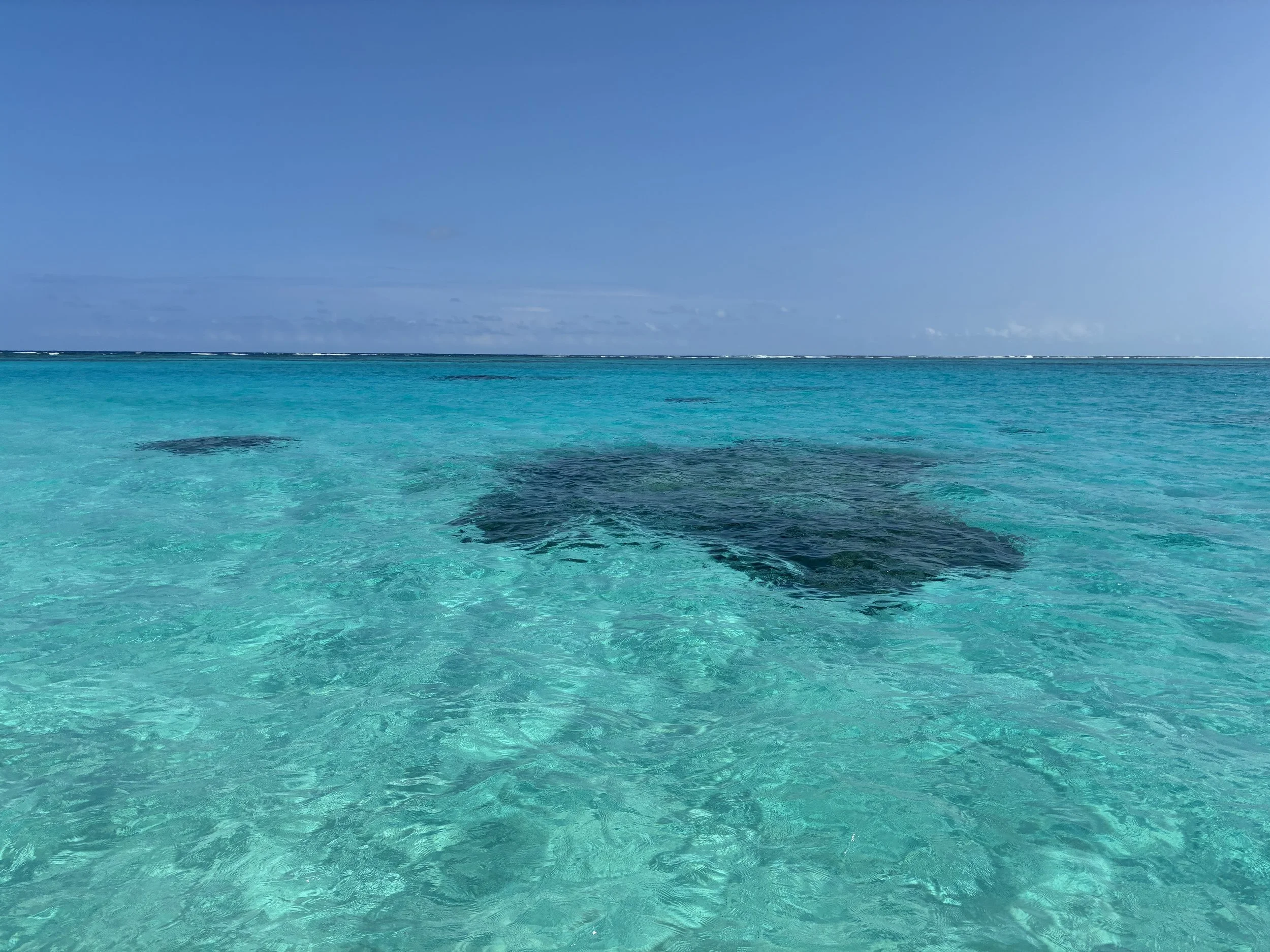
どうか、この島がいつまでも夢(ゆめ)の島のように美しい島でいられますように… うっちゃんが案内(あんない)してくれた所(ところ)の中(なか)で、「ドラえもんのどこでもドア」のアートがありました。アニメキャラクターのドラえもんがドアを描(えが)くと、ドアの向(む)こうは自分(じぶん)が行きたいところへ行けます。私は今夜(こんや)夢の中でどこでもドアを開(あ)けると、あの美しい与論島の海が目(め)の前(まえ)に広(ひろ)がっていますように…
2025 Autumn Trip 2025年秋の旅4/5
Shoodoshima Olive Park 小豆島オリーブ公園 Photo Credit: Yoko Irisawa
The beautiful island of Shodoshima, located in the Seto Inland Sea, was actually recommended to me by Robert, who has been studying Japanese with me, so I really wanted to go. It was a wonderful place as I expected.
瀬戸内海(せとないかい)に浮(う)かぶこの美(うつく)しい小豆島(しょうどしま)は、実(じつ)は私(わたし)と一緒(いっしょ)に日本語(にほんご)を勉強(べんきょう)してくださっているロバートさんからのお薦(すす)めで、ぜひ行(い)きたいと思(おも)っていました。期待(きたい)通(どお)りの素敵(すてき)な所(ところ)でした。
Once again, my friend helped me by contacting the hotel where I planed to stay and with directions, and I learned that there were no shops near my hotel. Since buses on Shodoshima Island usually run once an hour, I took the JR (Japan Rail) train from Kobe to Himeji, bought a bento dinner at a convenience store, and headed to the ferry terminal at Himeji Port. There were few people waiting for the ferry in the very small waiting room at the dock, so I figured I still had time. I bought a package of interestingly named squid snacks at the Kiosk and relaxed while eating ice cream. Then, I realized they were waiting for a ferry bound for another port, so I rushed onto the ferry just before it departed. The ferry had only few people around me due to the rain, and the nearly two-hour journey to Fukuda Port on Shoodoshima Island was very comfortable.
またしても、私の友人(ゆうじん)にホテルとの連絡(れんらく)やアクセスでお世話(せわ)になり、私が泊(と)まるホテル周辺(しゅうへん)にはお店(みせ)がないことも教(おし)えてくれました。小豆島でのバスも通常(つうじょう)1時間(いちじかん)に1本(いっぽん)と言(い)うことで、JRで神戸(こうべ)から姫路(ひめじ)まで行って、コンビニで夕食(ゆうしょく)のお弁当(べんとう)を買(か)って、姫路港(ひめじこう)にあるフェリー乗(の)り場(ば)へ行(い)きました。とても小(ちい)さな船着場(ふなつきば)の待合室(まちあいしつ)で二、三人(にさん人)の方(かた)がフェリーを待(ま)っておられたので、私はまだ時間(じかん)があると思(おも)い、売店(ばいてん)で面白(おもしろ)い名前(なま)のイカのお菓子(かし)を買(か)って、アイスクリームを食(た)べながらのんびりフェリーを待っていると、その人(ひと)たちは他(ほか)の港(みなと)へ向(む)かうフェリーを待っていることにようやく気(き)づき、私は出港(しゅっこう)寸前(すんぜん)のフェリーに駆(か)け込(こ)みました。フェリーは雨天(うてん)のせいか人(ひと)もまばらで、2時間弱(にじかんじゃく)の小豆島の福田港(ふくだこう)までの船(ふね)の旅(たび)はとても快適(かいてき)でした。
I chose Aqua Hotel among many hotels. A staff member from the hotel came to pick me up at Fukuda Port, and I soon arrived at the hotel surrounded by nature and featuring a private beach. The rooms were extremely spacious, and I could see a beautiful panoramic view of the Seto Inland Sea from the bathroom throughout the bedroom. It a truly comfortable hotel that soothes both body and mind. The hotel staff were very attentive and kind, which resulted me to have an enjoyable sightseeing experience.
Aqua Hotel in Shoodoshima Island, アクアホテル小豆島リゾート Photo Credit: Yoko Irisawa
数(かず)あるホテルの中(なか)から選(えら)んだ アクアホテルのスタッフの方(かた)が福田港まで迎(むか)えに来(き)てくださっていました。まもなく、プライベートビーチがあり自然(しぜん)に囲(かこ)まれたホテルに到着(とうちゃく)しました。そこは驚(おどろ)くほど広(ひろ)い部屋(へや)とバスルームから寝室(しんしつ)までの全(すべて)ての部屋を通(とお)して一枚(いちまい)のパノラマ写真(しゃしん)のように瀬戸内海の美(うつく)しい景色(けしき)が全貌(ぜんぼう)できる造(つく)りで、まさに心(こころ)も身体(からだ)も癒(いや)せる快適なホテルでした。ホテルの従業員(じゅうぎょういん)の方々(かたがた)はきめ細(こま)かい心のこもった対応(たいおう)をしてくださり、お陰(かげ)で楽(たの)しい観光(かんこう)もできました。
On the first day, I relaxed at the hotel, and the next day I went to the shore known as Angel Road, where you can walk to a small island only at low tide. It is said that if you hold hands with your partner and walk to the island at low tide, your love will be fulfilled, so many couples and families were visiting. Shodoshima Island belongs to Kagawa Prefecture, and when you think of Kagawa Prefecture, you think of Sanuki udon! I had some delicious Sanuki udon for lunch.
Angel Road Park 小豆島エンジェルロード Photo Credit: Yoko Irisawa
1日目(いちにちめ)はゆっくりホテルで休(やす)んで、翌日(よくじつ)はエンジェルロードと呼(よ)ばれるれる引(ひ)き潮(しお)の時(とき)だけに小島(こじま)に歩(ある)いて渡(わた)れる岸(きし)に行(い)きました。引き潮の時に手(て)を繋(つな)いで島(しま)まで渡るとそのお相手(あいて)との恋(こい)が成就(じょうじゅ)すると言(い)われているらしく、多(おお)くのカップルや家族(かぞく)連(づ)れが訪(おとず)れていました。小豆島は香川県(かがわ)に属(ぞく)しますから、香川県といえば讃岐(さぬき)うどん!おいしい讃岐うどんをお昼(ひる)ご飯(はん)にいただきました。
Sanuki-udon at Oideya おいでやの讃岐うどん Photo credit: Yoko Irisawa
On the second day, I went to see the olive orchard (Olive Park), as recommended by Robert. It seems that buses usually run once an hour in this area of Shodoshima Island, so I had a relaxing trip on the Shodoshima Olive Bus.
二日目(ふつかめ)はロバートさんのお薦(すす)めにより、オリーブ園(えん)を見(み)に行(い)きました。小豆島のこの辺(あた)りはバスが1時間に一本(いっぽん)というのが通常(つうじょう)のようで、小豆島オリーブバスと呼(よ)ばれるバスでの移動(いどう)はのんびりとした気分(きぶん)でできました。
Olive Park, with its 2,000 olive groves, is surrounded by olive trees on all sides, making it feel like you're on the Mediterranean coast. Shodoshima's warm, dry, and sunny climate is ideal for olive orchards, making it the birthplace of olives in Japan. Olive Park is filled with an exotic atmosphere, with a windmill built as a commemoration of friendship between Shodoshima Island and Milos, in Greece, which has a sister island relationship with Shodoshima, and a set used in the filming of the live-action "Kiki's Delivery Service." The olive soft serve ice cream I had at the souvenir shop was also delicious. I bought olive somen noodles, Sanuki udon noodles, and soy sauce as souvenirs from Shodoshima.
The Greek windmills at Shoodoshima Olive Park オリーブパークのギリシャの風車 Photo Credit: Yoko Irisawa
二千本(にせんぼん)ものオリーブ畑(ばたけ)があるオリーブ公園(こうえん)は、四方(しほう)をオリーブで囲(かこ)まれてまるで地中海(ちちゅうかい)にいるようでした。小豆島にオリーブ園(えん)があるのは、温暖(おんだん)で雨(あめ)が少(すく)なく、日当(ひあ)たりが良(よ)い気候(きこう)がオリーブ園に適(てき)しているため日本におけるオリーブの発祥(はっしょう)の地(ち)となったそうです。オリーブ公園には、小豆島と姉妹島提携(しまいとうていけい)を結(むす)ぶギリシャのミロス島との友好記念(ゆうこうきねん)として建(た)てられた風車(ふうしゃ)や実写(じっしゃ)の「魔女(まじょ)の宅急便(たっきゅうびん)」の撮影(さつえい)で使(つか)ったセットが残(のこ)っていて異国情緒(いこくじょうちょ)にあふれていました。お土産物屋(みやげものや)さんで食べたオリーブのソフトクリームも美味(おい)しかったです。小豆島のお土産にオリーブそうめんや讃岐(さぬき)うどんやお醤油(しょうゆ)を買いました。
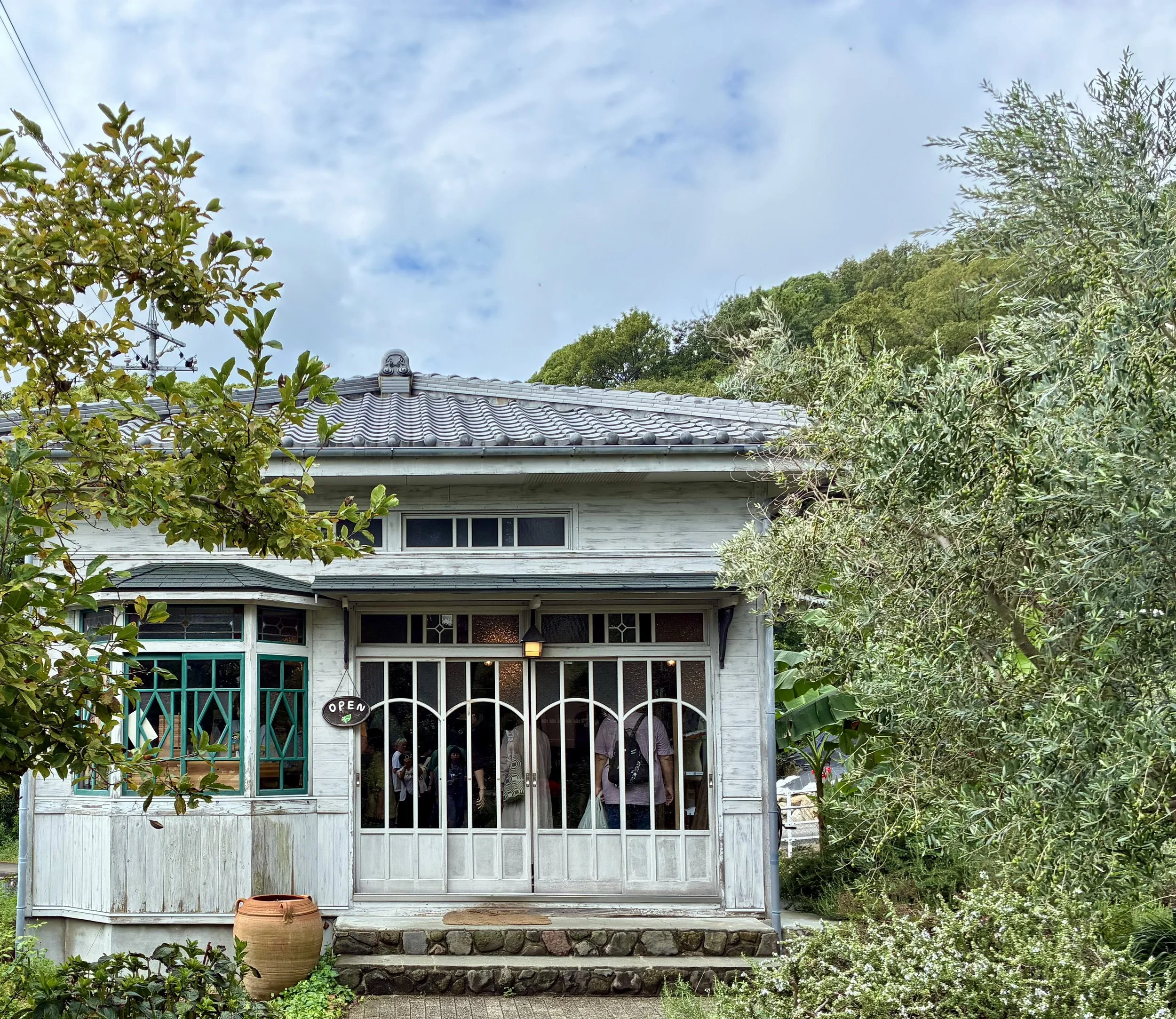
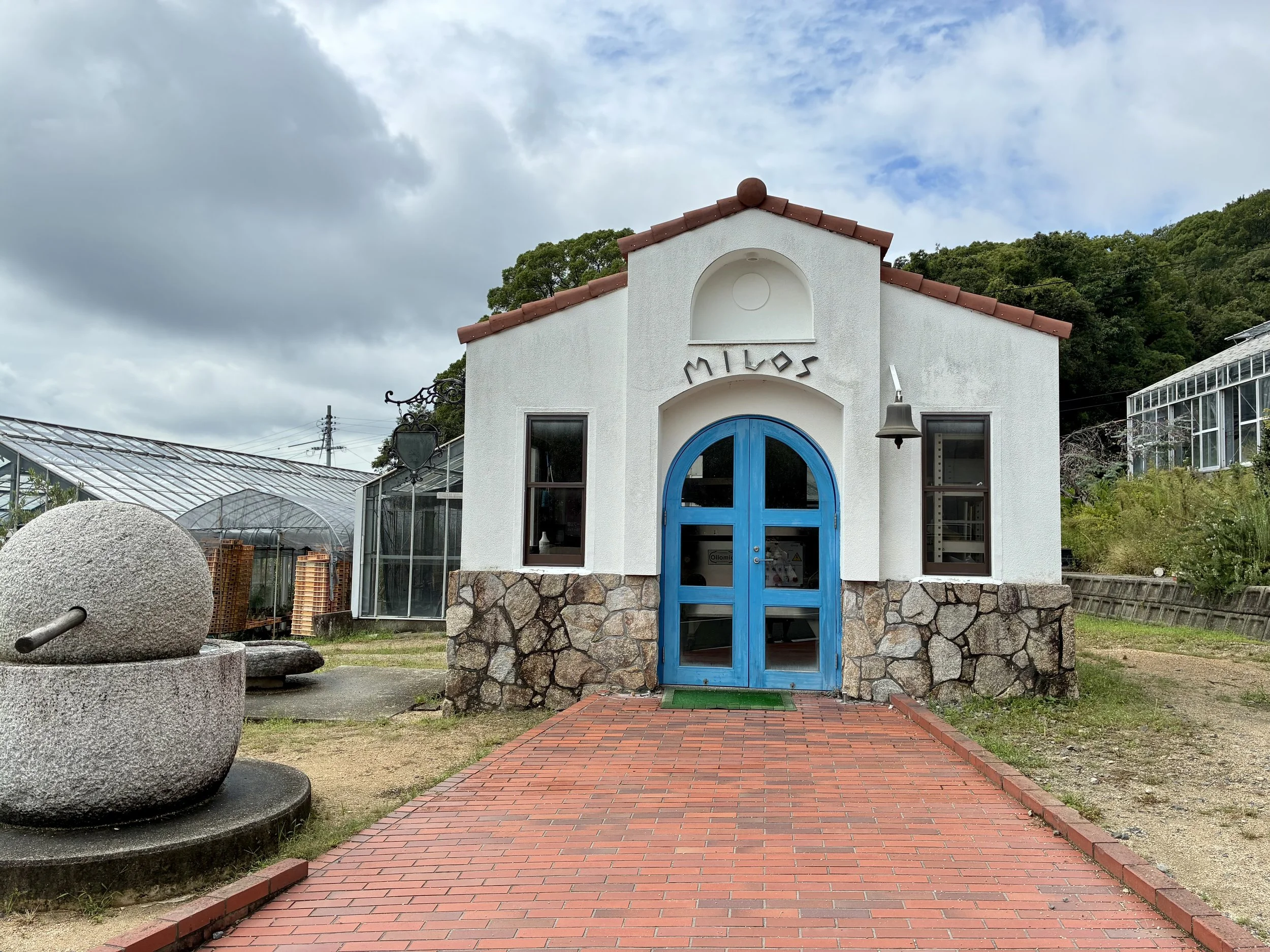
I only had two days on Shodoshima, but there was still so much I wanted to see, so I would like to go back before the excitement of this trip wears off.
私は小豆島では2日しか時間が取(と)れなかったのですが、まだまだ見たいところがあったので、今回(こんかい)の感動(かんどう)が冷(さ)めないうちにまた行きたいと思います。
2025 Autumn Trip 2025年秋の旅3/5
The Grand Ring 大屋根リング Photo credit: Yoko Irisawa
My next stop was Osaka. I really wanted to visit the Osaka Expo, and luckily I was able to go to see it just for one day. My friend gave me detailed information about the event starting the preparations very patiently even though it was just for one day visit, and she even came with her husband to navigate me in the Expo Venue on the day. The Expo took place on the man-made island of Yumeshima in Osaka City for 184 days, from April 13 to October 13, 2025.
次(つぎ)に行(い)ったのは大阪(おおさか)です。大阪万博(おおさかばんぱく)にどうしても行きたかったのですが、幸運(こううん)にも一日(いちにち)だけ見学(けんがく)することができました。友人(ゆうじん)は、一日だけの見学にもかかわらず、準備段階(じゅんびだんかい)からイベントについてとても辛抱強(しんぼうづよ)く教(おし)えてくれました。なんと、当日(とうじつ)はご主人(しゅじん)と一緒(いっしょ)に会場内を(かいじょうない)を案内(あんない)してくれました。大阪万博は、2025年4月13日(にせんにじゅうごねん、しがつ じゅうさんにち)から10月13日(じゅうがつ じゅうさんにち)までの184日間(ひゃくはちじゅうよっかかん)、大阪市(おおさかし)の「夢洲」(ゆめしま)と言(い)われる人口島(じんこうじま)で行(おこな)われました。
Gandam ガンダム Photo Credit: Yoko Irisawa
Despite the daily extreme heat and long waiting time at the entrance gates and pavilions, the Expo attracted more than 240,000 visitors each day just before the closing event. 158 countries showcased their proud history and culture, utilizing their wisdom and technology. There were over 180 pavilions, both domestic and international. Advance reservations were required to enter a pavilion, and unless you won the lottery, you'd have to wait in line for long waits on the day.
連日(れんじつ)の猛暑(もうしょ)や入場(にゅうじょう)ゲートとパビリオンでの待(ま)ち時間(じかん)にもかかわらず、閉幕間際(へいまくまぎわ)は毎日(まいにち)24万人以上(にじゅうよんまんにん いじょう)の入場者数(にゅうじょうしゃすう)があったそうです。158カ国(ひゃくごじゅうはちかこく)が人々(ひとびと)の知恵(ちえ)や技術(ぎじゅつ)を駆使(くし)して各々(おのおの)の誇(ほこ)りとする歴史(れきし)や文化(ぶんか)を披露(ひろう)していました。国内外(こくないがい)のパビリオンを合(あ)わせて、180以上(ひゃくはちじゅう いじょう)ものパビリオンがあったそうです。パビリオンに入(はい)るには事前予約(じぜんよやく)が必要(ひつよう)で、抽選(ちゅうせん)に当(あ)たらなければ、当日(とうじつ)長(なが)い待(ま)ち時間を覚悟(かくご)で列(れつ)に並(なら)ぶことになります。
The view from the Grand Ring 大屋根リングからの眺め Photo Credit: Yoko Irisawa
While I was constantly overwhelmed by the sights at the Expo, the "Grand Ring," reminiscent of a shrine or temple, was a true example of Japanese beauty. It's said to be the largest wooden structure in the world. The pavilions we visited were the France Pavilion, the Future City Pavilion, the Canada Pavilion, and the Pasona Pavilion. At the Pasona Pavilion, Astro Boy and Black Jack guided us through a beautiful video on the preciousness of life, as well as exhibits on advanced and future medical science and biology, captivating the audience. It was a wrench to leave the Pasona Pavilion.
会場(かいじょう)では圧倒(あっとう)されることばかりでしたが、巧(たく)みに木材(もくざい)を組(く)み合(あ)わせて建築(けんちく」)された神社仏閣(じんじゃぶっかく)を連想(れんそう)させる「大屋根(おおやね)リング」は正(まさ)に和(わ)の美(び)でした。これは世界最大(せかいさいだい)の木造建造物(もくぞうけんぞうぶつ)だそうです。私達(わたしたち)が入(はい)れたパビリオンはフランス館(かん)、未来(みらい)の都市(とし)館、カナダ館、パソナ館でした。パソナ館では、鉄腕(てつわん)アトムとブラックジャックの案内(あんない)で命(いのち)の尊(とおと)さをテーマとして繰(く)り広(ひろ)げる美(うつく)しい映像(えいぞう)、先進医学(せんしんいがく)や未来(みらい)の医学や生物学(せいぶつがく)の展示物(てんじぶつ)などで観客(かんきゃく)を魅了(みりょう)し、私は後(うし)ろ髪(がみ)を引(ひ)かれながらパソナ館を出ました。
Astro Boy & Blackjack 鉄腕アトムとブラックジャック Photo Credit: Yoko Irisawa
At the Canada Pavilion, each group of visitors was given a tablet. By holding the tablet over a model of Canada's topography, we were able to enjoy an immersive AR (augmented reality) experience, which overlays digital information onto the real world. It was a lot of fun, as we could see fishermen and wildlife relaxing in the Canadian wilderness, beautiful auroras, and astronauts spacewalking, all as if we were there.
Augmented Reality Experience 拡張現実体験 Photo credit: Yoko Irisawa
カナダ館では、来場者(らいじょうしゃ)グループごとにタブレットが渡(わた)されました。カナダの地形模型(ちけいもけい)にタブレットをかざすと、現実世界(げんじつせかい)にデジタル情報(じょうほう)を重(かさ)ね合(あ)わせるAR(拡張現実 かくちょうげんじつ)体験(たいけん)を楽(たの)しむことができました。カナダの大自然(だいしぜん)でくつろぐ釣(つ)り人(びと)や野生動物(やせいどうぶつ)、美(うつく)しいオーロラ、宇宙遊泳(うちゅうゆうえい)をする宇宙飛行士(うちゅうひこうし)など、まるでその場(ば)にいるかのような臨場感(りんじょうかん)で、とても楽(たの)しかったです。
Tree of Life (生命進化の木)Photo Credit: Yoko Irisawa
The Osaka Expo has already ended, but even though I was almost swamped by the unimaginable number of people, it was a once-in-a-lifetime experience. I realized that I would have regretted not going. It was truly an otherworldly and enjoyable day. I am truly grateful to my friends for making this such a wonderful experience possible.
すでに大阪万博は終了(しゅうりょう)してしまったのですが、想像(そうぞう)を絶(ぜっ)する人の波(なみ)に呑(の)まれそうになりながらも二度(にど)と体験(たいけん)できない一日が体験できて、行(い)っていなかったらきっととても後悔(こうかい)していただろうと思(おも)いました。本当(ほんとう)に異次元(いじげん)のような楽しい一日でした。こんな素晴(すば)らしい体験(たいけん)をさせてくれた友人たちに心から感謝(かんしゃ)しています。
2025 Autumn Trip 2025年秋の旅2/5
Hasedera Temple in Nara: Photo Credit, Yoko Irisawa
In Nara, I visited Hasedera Temple.
The reason I visited Hasedera Temple was to reunite with someone who had helped me the last time I visited, and perhaps because I wanted to spend some quiet time at the temple thinking about my friends and family.
Cherry blossoms in October at Hasedera Temple in Nara: Photo credit, Yoko Irisawa
They said that this temple is known for its beautiful flowers throughout the seasons. Even though it was early October, I was able to see beautiful cherry blossoms. The temple has 399 beautiful stone steps (called Noboriroo), and the view of the garden and mountains from the outer stage of Hasedera's main hall is breathtaking.
The main hall area of Hasedera Temple in Nara: Photo Credit, Yoko Irisawa
Go-honzon, the principal object of Hasedera Temple in Nara, is a Kannon Bosatsu statue (Eleven-Headed Kannon Bodhisattva) with a beautiful, serene face that is over 9 meters tall. The main hall also houses a statue of an honourable monk (The leader of the 16 disciples of Buddha) known as "Binzuru-san," and it is believed that if sick worshippers stroke the same area on Binzuru-san as they do on their own affected area, their illnesses will be cured.
Binzuru-san at Hasedera Temple in Nara, Photo Credit, Yoko Irisawa
This time, I was able to visit during a quiet season and time when there were no other worshippers, so I was able to spend my time relaxing without causing any inconvenience to other worshippers.
The outer stage at Hasedera Temple in Nara; Photo credit, Yoko Irisawa
奈良(なら)では長谷寺(はせでら)にお参(まい)りしました。
長谷寺にお参りした理由(りゆう)は、前回(ぜんかい)長谷寺にお参りした際(さい)にお世話(せわ)になった方(かた)に再会(さいかい)するためと、またこのお寺(てら)で友人(ゆうじん)たちや家族(かぞく)のことを思(おも)いながら静(しず)かな時(とき)を過(す)ごしたかったからかもしれません。
このお寺(てら)は四季折々(しきおりおり)の花(はな)がきれいなことで知(し)られているそうです。10月(じゅうがつ)初旬(しょじゅん)だったにもかかわらず、美(うつく)しい桜(さくら)の花を見(み)ることができました。このお寺には三百九十九段(さんびゃくきゅうじゅうきゅうだん)の美しい石段(いしだん)(登廊ーのぼりろうと呼(よ)ばれるそうです)があり、長谷寺の本堂(ほんどう)の外舞台(そとぶだい)からの庭園(ていえん)と山々(やまやま)の景色(けしき)はとても美しいものです。
奈良の長谷寺のご本尊(ほんぞん)は9メートル以上(いじょう)もある美しく穏(おだ)やかなお顔(かお)の観音様(かんのんさま)(十一面観世音菩薩像 じゅういちめんかんぜおんぼさつ/ かんのんぼさつ)です。また、本堂(ほんどう)には「賓頭盧さん(びんずるさん)」の愛称(あいしょう)で親(した)しまれている尊者(そんじゃ『お釈迦様(しゃかさま)の弟子(でし)の16羅漢(らかん)の筆頭(ひっとう』の像(ぞう)があり、病(やまい)のある参拝者(さんぱいしゃ)が自分(じぶん)の患部(かんぶ)と賓頭盧さんの同(おな)じ部分(ぶぶん)を撫(な)でることによって、参拝者の病気(びょうき)が治(なお)ると信(しんじ)じられているそうです。
今回は他(ほか)の参拝者もおられない静かな季節(きせつ)と時間帯(じかんたい)にお参りできて、他の参拝者の方にもご迷惑(めいわく)をおかけせずにゆっくりとした時間が過(す)ごせました。
2025 Autumn Trip 2025年秋の旅 1/5
The Kobe Port Tower: Photo credit, Yoko Irisawa
With the help of some close friends, I was able to enjoy Kobe, Osaka, Nara, Shoodo-shima Island, and Yoron Island in less than two weeks. Fortunately, the weather was perfect, and I had a truly enjoyable time. It was a memorable trip that I could never have achieved without the patient support of my friends, who prepared everything well in advance of the trip. I'd like to take this opportunity to express my gratitude to my friends and the hotel staff for their heartfelt hospitality.
This trip allowed me to appreciate the elegance of Japan's ancient capital, marvel at the technology of Japan's major cities, and enjoy a relaxing time on two islands surrounded by beautiful seas. I'd like to share my unforgettable memories from each region in my Fall 2025 Travel Series.
Night View of Kobe Port: Photo credit, Yoko Irisawa
Let's start with my hometown, Kobe. Kobe is close to Osaka, a beautiful city surrounded by sea and mountains, yet lined with modern buildings. It is currently the eighth largest city in Japan, and has made a strong recovery since the devastating 1995 earthquake. From the observation lobby of the city hall, you can see the skyscrapers and mountain scenery surrounding the port. The Port Tower against the blue sky was beautiful, but what left the biggest impression on me was the beautiful night view of the port.
Kobe is famous for Kobe beef, but it's also famous for its delicious Western-style sweets.
Strawberry Cake from ANTENOR: Photo Credit, Yoko Irisawa
今回(こんかい)、親(した)しい友人(ゆうじん)の力(ちから)を借(か)りて、2週間(しゅうかん)以内(いない)で神戸(こうべ)、大阪(おおさか)、奈良(なら)、小豆島(しょうどしま)、与論島(よろんとう)を楽(たの)しむことができました。幸(さいわ)い天候(てんこう)にも恵(めぐ)まれ、本当(ほんとう)に楽(たの)しい時間(じかん)が過(す)ごせました。旅行(りょこう)の随分(ずいぶん)前(まえ)から色々(いろいろ)と準備(じゅんび)してくれた友人達(ゆうじんたち)の辛抱強(しんぼうづよ)いサポートなしでは決(けっ)して達成(たっせい)することができなかった、心(こころ)に残(のこ)る旅(たび)でした。私の友人達に感謝(かんしゃ)を述(の)べるとともに、ホテルで心(こころ)からのもてなしをしてくださったスタッフの皆(みな)さんにもこの場(ば)を借(か)りてお礼(れい)申(もう)し上(あ)げます。
今回は日本古来(にほんこらい)の古都(こと)の雅(みやび)を愛(め)で、大都市(だいとし)での技術(ぎじゅつ)に驚嘆(きょうたん)し、美(うつく)しい海(うみ)に囲(かこ)まれた二(ふた)つの島(しま)でゆったりした時間(じかん)を堪能(たんのう)できました。それぞれの地方(ちほう)での心(こころ)に残(のこ)る思(おも)い出(で)を2025年秋(あき)の旅(たび)シリーズでお伝(つた)えしたいと思(おも)います。
まずは私(わたし)の故郷(こきょう)、神戸(こうべ)から。 神戸は大阪(おおさか)に近(ちか)く、海(うみ)と山(やま)に囲(かこ)まれながらも近代的(きんだいてき)な建物(たてもの)が立(た)ち並(なら)ぶ美(うつく)しい街(まち)。現在(げんざい)は、日本(にほん)で8番目(はちばんめ)に大(おお)きい都市(とし)だそうです。1995年(せんきゅうひゃくきゅうじゅうごねん)に起(お)きた大地震(だいじしん)から力強(ちからづよ)く復興(ふっこう)した街(まち)です。市役所(しやくしょ)の展望(てんぼう)ロビーから、港(みなと)の近くに林立(りんりつ)する高層(こうそう)ビルや山側(やまがわ)の景色(けしき)も眺(なが)めることができます。青空(あお)を背景(はいけい)に立(た)つポートタワーの姿(すがた)も素敵(すてき)でしたが、一番(いちばん)印象(いんしょう)に残(のこ)ったのは美(うつく)しい港(みなと)の夜景(やけい)でした。
神戸は神戸ビーフも有名(ゆうめい)ですが、おいしい洋菓子(ようがし)も有名です。
夢を叶える-Make your dreams come true; Graduation!
Photo credit: Yoko Irisawa
Both the dreams we have while sleeping and the dreams we imagine for our future are called “dreams”, but there are some of my students who started out as dreams while they were asleep and later realized them. What they all have in common is that they work hard every day to achieve small goals one by one, to believe in themselves, and to be grateful to their supportive family and friends. Zac-kun is one of them.
Zac-kun studied Japanese with me for five years, from 2018, when he became a second-year high school student, until several months before he moved to Tokyo to study abroad at a university in Tokyo in 2023. During those five years, he experienced a challenging high school life and the transition to college life, all of which were impacted by the COVID-19 pandemic. Even in such circumstances, he did not give up on his dreams and conquered his goals one by one.
After many years of hard work and perseverance, he was selected as the first-place winner of the annual Atlantic Canada Japanese speech contest. He was later selected to participate in the Kakehashi Project, where he traveled to Japan and completed a one-week program. The Kakehashi Project is a Japanese government-funded initiative aimed at fostering mutual understanding and friendship between Japan and various countries. Starting in September 2023, he moved to Tokyo to study abroad at a university. Most recently, on May 30th, Zac-kun received his degree in Asian Studies and a certificate of Japanese Studies from St. Mary's University.
However, it doesn't end here. Zac-kun applied to the Jet Program to work as an assistant language teacher in Japan and was accepted, so he will return to Japan in September this year to work.
I'm sure that Zac-kun's constant efforts, his lovable personality, the guidance and support of his professors and other university staff, the understanding of the judges at contests, and the warm support of his parents have all contributed to his success in getting this far. I would like to send my heartfelt congratulations to Zac-kun. I sincerely hope that he will continue to dream inside of his head and achieve them in the future. From now on, I hope to have a long and lasting friendship with him.
眠(ねむ)っている時(とき)に見(み)る夢(ゆめ)も、起(お)きている時に描(えが)く未来(みらい)の憧(あこが)れも、どちらも夢(ゆめ)と呼(よ)ばれますが、最初(さいしょ)は眠(ねむ)っている時の夢で、それを後(のち)に実現(じつげん)できた人(ひと)が私(わたし)の生徒(せいと)の皆(みな)さんの中(なか)にも何人(なんにん)かいます。その生徒さん達(たち)に共通(きょうつう)していることは、毎日(まいにち)努力(どりょく)していること、小(ちい)さな目標(もくひょう)を一つ(ひとつ)ずつ達成(たっせい‘)していること、自分(じぶん)を信(しん)じていること、そして応援(おうえん)してくれる家族(かぞく)や友人(ゆうじん)がいて、その人達(ひとたち)に感謝(かんしゃ)していることです。ザックくんもその一人(ひとり)です。
ザックくんは高校(こうこう)2年生(にねんせい)になった2018年(ねん)から2023年の日本(にほん)の大学(だいがく)に留学(りゅうがく)する数ヶ月前(すうかげつまえ)までの5年間(ごねんかん)、私と一緒(いっしょ)に日本語を勉強(べんきょう)してくれました。その5年の間(あいだ)に、2019年の暮(く)れから始(はじ)まり、2023年の春(はる)にようやく終(お)わったコロナ禍(か)のせいで、辛(つら)い高校生活(こうこうせいかつ)と大学生活(だいがくせいがつ)の始(はじ)まりを経験(けいけん)しました。そんな中(なか)でも夢を諦(あきら)めず、目標(もくひょう)を一つずつ達成していきました。
ザックくんの長年(ながねん)の努力と忍耐(にんたい)の甲斐(かい)があって、恒例(こうれい)の大西洋岸(たいせいようがん)日本語(にほんご)スピーチコンテストで一位(いちい)を獲得(かくとく)しました。その後(ご)、カナダと日本を結(むす)ぶ「架(か)け橋(はし)プロジェクト」のメンバーに選任(せんにん)され、1週間(いっしゅうかん)の日本でのプロジェクトを無事(ぶじ)に終了(しゅうりょう)しました。架け橋プロジェクトと言(い)うのは、日本と諸外国(しょがいこく)の間(あいだ)の総合理解(そうごうりかい)と友好関係(ゆうこうかんけい)の促進(そくしん)を目的(もくてき)とした日本政府(にほんせいふ)が資金提供(しきんていきょう)するプロジェクトです。2023年の9月からザックくんは日本の大学で留学(りゅうがく)するために東京(とうきょう)へ移(うつ)り住(す)みました。そして、本年(ほんねん)2025年の5月(がつ)30日(にち)にセントメリーズ大学で、アジア研究(けんきゅう)の学位(がくい)と日本語研究(にほんごけんきゅう)の卒業証書(そつぎょうしょうしょを取得(しゅとく)しました。
ここで終(お)わるのではなく、ザックくんは日本の英語教師(えいごきょうし)のアシスタントを務(つと)めるためにジェット・プログラムに応募(おうぼ)し採用(さいよう)されたので、今年(ことし)の9月から日本へ再(ふたた)び移り住み、働(はたら)くことになりました。
ここまで来(く)ることができたのは、きっとザックくんの絶(た)え間(ま)ない努力と人々から愛(あい)される性格(せいかく)、そして大学の教授(きょうじゅ)やその他(ほか)の大学の職員(しょくいん)の皆様方(みなさまがた)のご指導(しどう)とご支援(しえん)、コンテストなどの審査員(しんさいん)の皆様方のご理解(りかい)、そしてご両親(りょうしん)の温(あたた)かいサポートがこの成功(せいこう)へと導(みちび)いてくれたのだと思(おも)います。ザックくんに、心(こころ)からおめでとうの言葉(ことば)を送(おく)ります。これからも、さらなる夢を描き、叶(かな)えられることを心から祈(いの)っています。長(なが)い間(あいだ)、本当(ほんとう)にお疲(つか)れ様(さま)でした。これからは一人の友人(ゆうじん)として末長(すえなが)く私とお付(つ)き合(あ)い願(ねが)いたいと思います。
お花見-2025 Cherry Blossom Viewing
Photo credit: Yoko Irisawa
For the past few years, I had some cherry blossom viewing parties with students from my Japanese lessons. This year, it was too cold or rainy so we ended up not being able to gather.
We can see lots of double-flowered cherry blossoms at Dartmouth Commons. This year, I went there by myself on May 15th when they were just starting to bloom. Then, on May 20th, I was able to see the double-flowered cherry blossoms in full bloom under the clear blue sky at Halifax Commons.
It's a bit selfish, but as a Japanese person, I really want to see the Somei-yoshino cherry blossoms in Japan in the spring.
Photo Credit: Yoko Irisawa
ここ数年(すうねん)、日本語教室(にほんごきょうしつ)の生徒(せいと)さんたちと一緒(いっしょ)にお花見(はなみ)をしてきましたが、今年(ことし)は寒(さむ)すぎたり、雨(あめ)が降(ふ)ったりで結局(けっきょく)お花見はできませんでした。
ダートマス・コモンズにはたくさんの八重桜(やえざくら)が咲(さ)きます。今年は咲きはじめの5月(ごがつ)15日(じゅうご)にそちらに一人(ひとり)で桜を見(み)に行(い)きました。そして、その後(ご)5月20日(はつか)に青空(あおぞら)の広(ひろ)がるハリファックス・コモンズで満開(まんかい)の八重桜を見(み)ることができました。
ちょっと我儘(わがまま)ですが、日本人(にほんじん・にっぽんじん)としては、春(はる)にはやはり日本でソメイヨシノが見たいです。
私の桜-2025 My Cherry Tree-2025
Photo Credit: Yoko Irisawa
Thanks to the Ikebana Shop and Maple Grove Nursery, I was able to plant my long-awaited cherry blossom tree in my small garden in the fall of 2021. From 2022, cherry blossoms bloom in my small garden every spring. Spring is late here in Nova Scotia, so I took this photo on May 19th.
I really feel sad to see the cherry blossoms fall, but I look forward to next spring. I'm really grateful to the Ikebana Shop and Maple Grove Nursery. Thank you very much.
生(い)け花(ばな)ショップさんとメープル・グローブ・ナーサリーさんのお陰(かげ)で2021年(ねん)の秋(あき)に念願(ねんがん)の桜(さくら)の木(き)を私(わたし)の小(ちい)さな庭(にわ)に植(う)えることができました。2022年から毎春(まいしゅん)、私の小さな庭に桜が花(はな)を咲(さ)かせてくれています。ここノヴァ・スコシアの春(はる)は遅(おそ)いですから、この写真(しゃしん)を撮(と)ったのは5月(ごがつ)19日(じゅうくにち)になってからでした。
桜の花が散(ち)るのを見(み)るのは本当(ほんとう)に寂(さび)しいのですが、来年(らいねん)の春(はる)を心待(こころま)ちにしています。生け花ショップさんとメープル・グローブナーサリーさんには本当に感謝(かんしゃ)しています。ありがとうございました。
Let’s learn Japanese and Food Culture 日本語と食文化
Inarizushi: photo credit, Yoko Irisawa
Spring is around the corner! I am having some workshops this week. Please contact me via email if you are interested in joining me to learn the Japanese language and little about Japanese food culture. If you are under the weather, please wait until the next opportunity. Thank you very much!
春(はる)はもうそこまできていますね。今週(こんしゅう)はワークショップをします。ご興味(きょうみ)のある方(かた)はこちらのメールアドレスへ是非(ぜひ)ご連絡(ごれんらく)ください。もし風邪(かぜ)などをひかれている場合(ばあい)には、申し訳(もうしわけ)ございませんが次(つぎ)の機会(きかい)までお待(ま)ちください。ありがとうございます。
Fee: $20 per person ($35 for two) The maximum number of attendees: 6 per class. Location: North Street, Halifax (Detailed location will be given to you in my response.)
A) Tuesday, March 11, 2025 from 11:00 AM to- 12:30 PM: Onigiri (Rice balls) and Misosoup with vegetables (All vegan)
B) Thursday, March 13, 2025 from 11:00 AM to 12:30 PM: Inarizushi (Sushi rice stuffed inside of seasoned sweet fried tofu) and Misosoup with vegetables (All vegan)
C) Thursday, March 13, 2025 from 1:30 PM to 3:00 PM: Takoyaki (Shrimp version or Cheese version of savory ball-shaped snack)
D) Friday, March 14, 2025 from 11:00 AM to 12:30 PM: Imagawayaki(Kaitenyaki); Japanese sweets with red bean paste (Regular/Vegan)
E) Saturday, March 15, 2025 from 10:30 AM to 12:00 PM; Imagawayaki(kaitenyaki): Japanese sweets with red bean paste (regular/Vegan) and Anmaki, Sweet bean roll. (Sorry, vegan is not available.)
七草粥 Nanakusa-gayu
Nanakusa-gayu, Photo credit: Yoko Irisawa
一月七日(いちがつなのか)は人日の節句(じんじつのせっく)と呼(よ)ばれる日(ひ)で、私(わたし)はこの一年(いちねん)を健(すこ)やかに過(す)ごせるように七草粥(ななくさがゆ)を作(つく)って食(た)べました。本当(ほんとう)は朝(あさ)食(た)べるそうですが、私は夕食(ゆうしょく)に作って食べました。
January 7 is the day we call “Jinjitsu no sekku” and I made Nanakusa-gayu (rice porridge with seven herbs) wishing for my family to spend the rest of the year in good health. It should be eaten for breakfast, but I had mine for dinner.
春(はる)の七草(ななくさ)とは、芹(せり)、薺(なずな)、御形(ごぎょう)、繁縷(はこべ)、仏の座(ほとけのざ)、菘(すずな)、すずしろです。
“Haru no nanakusa” are the seven herbs of spring, which are Seri (=Japanese parsley), Nazuna (=shepherd’s purse), Gogyo (=Jersey cudweed), Hakobe (=common chickweed), Hotoke no za (=henbit), Suzuna (=turnip) and Suzushiro (=daikon).
元(もと)は中国(ちゅうごく)からの教(おし)えで、季節(きせつ)の変(か)わり目(め)には邪気(じゃき)が増(ふ)え、人々(ひとびと)は病気(びょうき)になりやすい時期(じき)だと信(しん)じられてきたそうですが、早春(そうしゅん)に芽吹(ねぶ)く七草の生命力(せいめいりょく)をもらい、邪気を払(はら)い、一年(いちねん)の無病息災(むびょうそくさい)を祈(いの)るために七草粥を食べます。
It is believed that this teaching originated in China, that the turn of the seasons is the time when evil spirits increase to cause illness and other misfortune. We eat Nanakusa-gayu as the early spring herbs’ sprouts to give people much vitality, eliminate evils, and wish good health and longevity.
昨今(さっこん)の日本のお正月(しょうがつ)には沢山(たくさん)のご馳走(ちそう)を食(た)べたり酒類(さけるい)を飲(の)んだりするので、七草粥は胃(い)を休(やす)めるのにも役立(やくだ)つそうです。
Japanese people have carried on this custom for a long time eating this healthy food, Nanakusa-gayu, on January the 7th using those 7 herbs contain much medicinal properties and vitamins. In recent times, Japanese people tend to eat large feasts and drink alcohol; this Nanakusa-Gayu may help for one’s upset stomach.
年賀状(ねんがじょう) -New Year’s Card
Nengajoo-New Year’s Card; Photo Credit, Yoko Irisawa
明(あ)けましておめでとうございます。本年(ほんねん)もどうぞよろしくお願(ねが)いいたします。
Happy New Year! Thank you so much for your continued friendship and support for me.
今年(ことし)は巳年(へびどし)ですから、この年賀状(ねんがじょう)には蛇(へび)の絵(え)が描(か)いてあります。また、「謹賀新年(きんがしんねん)」とは謹(つつし)んで新年(しんねん)をお祝(いわ)い申(もう)し上(あ)げますという意味(いみ)です。「明けましておめでとうございます。」を使(つか)う場合(ばあい)には、「謹賀新年」は使いません。どちらかを使ってくださいね。
As this year is the year of the snake, this new year’s card has a snake on it. Also 謹賀新年, Kingashinnen, is a greeting word to congratulate the new year. If you use 明けましておめでとうごさいます (Akemashite Omedetoogozaimasu), you can’t use both. Please use one of them.
「明けましておめでとうございます」という新年の挨拶(あいさつ)は普通(ふつう)一月七日(いちがつなのか)まで使(つか)いますが、そのあとは「本年もどうぞよろしくお願いします。」と言(い)うのがいいと思(おも)います。目上(めうえ)の方(かた)には「謹賀新年」のほうが丁寧(ていねい)なご挨拶だと思います。また、「明けましておめでとうございます。」は年賀状を書(か)くときにもどなたかにご挨拶をするときにも使えますが、「謹賀新年」はお祝いの言葉(ことば)を書くときに使います。You can say “akemashite omedetoogozaimasu” from January the 1st to the 7th (You can’t say “akemashite omedetoogozaimasu” before the new year comes.) After January the 7th, you can just say “Honnenmo doozo yoroshiku onegaishimasu” which means I appreciate your continuous support for me and friendship. “When you write a new year’s card to your superiors, 謹賀新年, Kingashinnnen” is more appropriate as it is more polite and humble expression. Also, “Akemashite omedetoogozaimasu” can be used for written and oral greetings, but “kingashinnen” is only for a greeting in writing.
年賀状は元旦(がんたん)に着(つ)くように、一週間(いっしゅうかん)ぐらい前(まえ)までに出(だ)します。 To be sure the postcards are delivered on New Year’s Day, people normally post their cards about one week before New Year’s Day.
そして、ひとつとても大切(たいせつ)なことは、一年以内(いちねんいない)に不幸(ふこう)があった喪中(もちゅう)の人(ひと)には「明けましておめでとうございます」などの新年の挨拶は控(ひか)えるのが普通(ふつう)です。喪中は家族(かぞく)が悲(かな)しみを乗(の)り越(こ)えるための期間(きかん)ですから、日本(にほん)では、お祝(いわ)い事(ごと)やおめでたいことは避(さ)けるのが通常(つうじょう)です。 One important thing to note is that there is a custom that we don’t send the new year’s card or exchange the words to congratulate new year to the family who has experienced the death of a family member in the previous year in Japan. The family may send a postcard saying, “We refrain from New Year’s greetings due to the mourning period”.
最近(さいきん)は、年賀状を出すのをやめる人も多(おお)いようです。この年賀状で最後(さいご)の年賀状にさせていただきますというメッセージを年賀状に入(い)れる人もおられるようです。 In recent times, there are some who may stop sending new year’s cards. If that is the case, they may mention that they will abstain from sending their new year’s card after this year.
最後(さいご)に、年賀状の表(おもて)にある番号(ばんごう)は宝(たから)くじのようなもので、現金(げんきん)30万円(さんじゅうまんえん)やほかの賞品(しょうひん)が当(あ)たるかもしれません。 Finally, the number at the bottom of the front of the New Year’s Card is just like a lotto and you may win “otoshidama”-New Year’s Money Gift, up to 300, 000 yen or other gifts.
新しいボードゲーム-Our New Board games
Photo credit: Yoko Irisaws
Today, I had a lesson with Naoki-kun and Naoki-kun's mother. I went to Naoki-kun’s house with my new board game, Monopoly.
I'm really bad at games so I lost again today... At the end of the game, I received a card notifying me “Investment Failure.''
The other day, we played Naoki's new board game for beginners players, Catan, As I expected, I lost the game, but this was so much fun and I want to get better at it. 今日(きょう)は直樹(なおき)くんと直樹くんのお母(かあ)さんの日本語(にほんご)のレッスンの日(ひ)でした。私(わたし)は新(あたら)しいボードゲーム、モノポリーを持(も)って直樹くん達(たち)の家(いえ)へ行(い) きました。 私は本当(ほんとう)にゲームが不得意(ふとくい)ですから、今日(きょう)も負(ま)けました… ゲームの最後(さいご)に「投資(とうし)の失敗(しっぱい)」というゲームの札(ふだ)をもらいました。この間(あいだ)は、初心者(しょしんしゃ)向(む)けのカタン島(とう) と言(い)う直樹くんの新しいゲームをしました。楽(たの)しいゲームでしたが、やっぱり負(ま)けました。でも、これはとても楽(たの)しかったので、上手(じょうず)になりたいです。
This year’s Halloween - 今年のハロウィーン
Photo credit: Yoko Irisawa
Halloween is not only something that children look forward to, but adults also enjoy. They put a lot of effort into their decorations!
ハロウィンは子供(こども)たちが楽(たの)しみにしているだけじゃなくて、大人(おとな)たちも楽(たの)しみにしています。飾(かざ)り付(つ)けにも力(ちから)が入(はい)っています!
Jack-o-lanterns ジャック・オ・ランタン かぼちゃ提灯(ちょうちん)
The neatly gathered fallen leaves in front of the gravestones…
墓石(はかいし・ぼせき)の前(まえ)に きれいに集(あつ)められた落ち葉(おちば)
A baby dinosaur
赤(あか)ちゃんの 恐竜(きょうりゅう)
My friend’s from far-1 朋あり遠方より来たる…
Inari-zushi, Cha-soba, and Renkon no Kinpira (Photo by Yoko Irisawa)
Robert-san, who has been working hard to pursue a PhD in marine biology on the west coast, came to see me in the beginning of September. He has been studying the Japanese language with me since November 2020.
We walked to the new Asian grocery store near the Library together where we bought ingredients for our dinner and some Japanese sweets. Then, we ate the sweets in the square, and walked back to my house together.
At home, we made Inari-zushi together, and I made Cha-soba and sautéed lotus root. I had a really good time!
In the beginning of the Analects of Confucius, there is a sentence, “A friend of mine visits me from far away; how happy I was to spend a good time together.” I really understand the feeling; I really enjoy my friends’ visit as well.
Robert-san makes Inari-sushi (Photo by Yoko Irisawa)
9月(くがつ)の始(はじ)めに、西海岸(にしかいがん)からロバートさんがわざわざ私(わたし)を訪(たず)ねて来(き)てくれました。ロバートさんは博士号(はくしごう)を取得(しゅとく)するために海洋生物学(かいようせいぶつがく)の研究(けんきゅう)をされていますが、日本語(にほんご)も2020年(にせんにじゅうねん)の11月(じゅういちがつ)から私と一緒(いっしょ)に勉強(べんきょう)されています。
私達(わたしたち)は、図書館(としょかん)の近(ちか)くにできた新(あたら)しいアジア食料品店(しょくりょうひんてん)へ行(い)って、晩(ばん)ごはんの食材(しょくざい)や日本(にほん/ にっぽん)の甘(あま)いものを買(か)いました。お腹(なか)が空(す)いていたので、図書館にある広場(ひろば)で日本の甘いものを食べて、日本語で話(はなし)をしながら一緒(いっしょ)に歩(ある)いて私(わたし)の家(いえ)へ帰(かえ)りました。
家では、一緒にいなり寿司(ずし)を作(つく)って、私は茶(ちゃ)そばと蓮根(れんこん)のきんぴらを作って一緒に食べました。本当(ほんとう)に楽(たの)しい時間(じかん)が過(す)ごせました。
論語(ろんご)の冒頭(ぼうとう)に、「朋(とも)あり、遠方(えんぽう)より来(き)たる。また楽(たの)しからずや…」とあります。遠方(えんぽう)から訪(たず)ねてくれた友達(ともだち)と時間(じかん)を一緒(いっしょ)に過(す)ごすのは、なんと楽(たの)しいことだろうという意味(いみ)です。孔子(こうし)の名言(めいげん)は私にも本当(ほんとう)に同感(どうかん)できます。私も、ロバートさんととてもいい時間を過(す)ごすことができました。
夏の終わり The end of the summer
Before I knew it, my summer was all gone as if it was fast forwarded. Now, it’s time for me to review what memorial things happened during this summer.
For me, every year the moment summer ends is when Japan’s high school baseball tournament ends. I love watching the energy and seriousness of high school baseball players and they gave me the power to step forward. Watching their play every spring and summer, recharges my energy. Congratulations to Kyoto International Junior and Senior High School on taking the championship victory.
私(わたし)の夏(なつ)は、まるで早送(はやおく)りをしたかのようにアッという間(ま)に過(す)ぎていきました。そして今(いま)、この夏に起(お)こった大事(だいじ)な出来事(できごと)を思(おも)い出(だ)して書(か)いていこうと思います。
毎年(まいとし)私(わたし)の夏(なつ)が終(お)わるのは、夏(なつ)の高校野球(こうこうやきゅう)が終(お)わった瞬間(しゅんかん)です。私は高校野球のエネルギーと球児(きゅうじ)たちの真剣(しんけん)さに惹(ひ)かれ、春(はる)、夏(なつ)の高校野球を観戦(かんせん)しています。球児たちは私に前進(ぜんしん)する力(ちから)を与(あた)えてくれます。毎年(まいとし)春(はる)と夏(なつ)に高校野球を観戦して、私はエネルギーを充電(じゅうでん)しています。
京都国際学園(きょうとこくさいがくえん)の野球部(やきゅうぶ)の皆(みな)さん、優勝(ゆうしょう)おめでとうございます!
夢を叶える-Make your dream come true; Wedding…
Photo credit: Yoko Irisawa
Before I knew it, my summer was all gone as if it was fast forwarded. Now, it’s time for me to review what memorial things happened during this summer.
In July, there was important news; Hannah-san and Matt-san, who I wrote in my blog series “Making your dream come true”, got married receiving a warm blessing from their family members and friends.
The heartwarming wedding filled with tears and smiles was held under the beautiful summery blue sky and bright sunshine.
Finding the special person and taking the steps together in their new lives may be a dream-like event for many people… Congratulations; I am so happy for both of you, Hannah-san and Matt-san.
私(わたし)の夏(なつ)は、まるで早送(はやおく)りをしたかのようにアッという間(ま)に過(す)ぎていきました。そして今(いま)、この夏に起(お)こった大事(だいじ)な出来事(できごと)を思(おも)い出(だ)して書(か)いていこうと思います。
7月(しちがつ)には、とても大事な出来事がありました。私のブログの連載(れんさい)「夢(ゆめ)を叶(かな)える」でご登場(とうじょう)いただいたハナさんとマットさんが、ご家族(かぞく)やご友人(ゆうじん)の皆(みな)さんからの心温(こころあたた)まる祝福(しゅくふく)を浴(あ)びながら結婚(けっこん)されました。
その涙(なみだ)と微笑(ほほえ)みに溢(あふ)れた心温(こころあたた)まる結婚式(けっこんしき)は、美(うつく)しい夏(なつ)の青空(あおぞら) と明(あか)るい日差(ひざ)しの下(もと)で行(おこな)われました。
人(ひと)が特別(とくべつ)な人と出会(であ)い、共(とも)に新(あたら)しい人生(じんせい)を歩(あゆ)んでいく事(こと)は、多(おお)くの人にとっての夢(ゆめ)かもしれません。お二人(ふたり)の末長(すえなか)いお幸(しあわ)せを心(こころ)よりお祈(いの)りしています。
Dinosaurs Puzzle - 恐竜🦕のパズル
直樹(なおき)くんと直樹くんのお母(かあ)さんのレッスンで、恐竜(きょうりゅう)のパズルをしました。私(わたし)はゲームが不得意(ふとくい)なので、いつも6歳(ろくさい)の直樹くんに負(ま)けます。昨日(きのう)は、パズルを三人(さんにん)でしたので私は負けませんでしたが、二人(ふたり)は100ピース、私は20ピースしかできませんでした。直樹くんも、直樹くんのお母さんも難解(なんかい)なパズルを解(と)くのがとても得意(とくい)です。
In Naoki-kun and his mother’s class, we challenged each other to solve a Dinosaurs Puzzle. As I am so bad at playing games, I always lose any games against 6-year old Naoki-kun. Yesterday, we solved the puzzle together so I didn’t lose, but they solved over 100 pieces and I solved 20 pieces… Naoki-kun and his mother are very good at solving intricate puzzles.
2024 O-hanami! お花見🌸
Photo credit: Codey Tanner
Photo credit: Yoko Irisawa
May 20 was Victoria Day which is a Canadian national holiday. As cherry-blossoms had started blooming, I decided to hold a cherry blossom viewing with my students and their families. Despite the short notice, in total 20 students and their family members attended our o-hanami, cherry-blossom viewing.
Photo credit: Codey Tanner
I got up early, and made many Inarizushi for our lunch. It was very cold unfortunately, but I was very happy to see many people attended the event and spent some good time by meeting other students and their families. Thank you so very much for your time to attend the gathering.
Photo credit: Codey Tanner Cassie-san made yummy cookies for us! Thank you very much!
By now, most of Sakura blossoms may have passed, but our fun memories will stay with us. I will pick a warmer day for next year, I hope to see all of you again.
5月20日(ごがつ はつか)はカナダの法定休日(ほうていきゅうじつ)であるビクトリアデーでした。桜(さくら)が咲(さ)き始(はじ)めたので、生徒(せいと)の皆(みな)さんやご家族(かぞく) とお花見(はなみ)をすることにしました。 急(きゅう)なお知(し)らせにもかかわらず、20人(にじゅうにん)の生徒の皆さんやご家族の方(かた)がお花見に参加(さんか)してくださいました。
私(わたし)は朝(あさ)早(はや)く起(お)きて、私たちのお昼(ひる)ご飯(はん)に稲荷寿司(いなりずし)をたくさん作(つく)りました。寒(さむ)い中(なか)、たくさんの皆(みな)さんに集(あつ)まっていただけて本当(ほんとう)に嬉(うれ)しかったです。皆さん、本当にありがとうございました。
桜はきっとほとんど散(ち)ってしまったでしょうが、皆さんとの楽(たの)しい思(おも)い出(で)は心(こころ)に残(のこ)っています。来年(らいねん)は、もっと暖(あたた)かい日(ひ)を選(えら)びますから、皆さん、またいらしてくださいね。
Chess Lessons-1 チェスのレッスン
Monday nights, I normally teach Japanese to a 6-year old boy, Naoki-kun, and his mother. Yesterday, I requested him to teach me chess.
I prepared my chessboard and he gave me a nice compliment on it. He had started teaching me how Knights can move on the chessboard. When he taught me that much, he stopped and switched to play with Play-Doh... I wonder if he figured out that chess is too difficult for me and Play-Doh is more suitable for me...
普通(ふつう)は、月曜日(げつようび)の夜(よる)は6歳(ろくさい)の直樹(なおき)くんと直樹くんのお母(かあ)さんと一緒(いっしょ)に日本語(にほんご)のレッスンをします。昨日(きのう)は、私(わたし)は直樹くんにチェスを教(おし)えてくれるようにお願(ねが)いしました。
私がチェスボードを準備(じゅんび)すると、直樹くんは私のチェスボードを褒(ほ)めてくれました。そして、直樹くんは、チェスボードの上(うえ)でナイトがどのような動(うご)きをできるかを見(み)せてくれました。それを教(おし)えてくれると、私にチェスを教えてくれるのをやめて、プレードーで遊(あそ)ぶことになりました。私は直樹君に、私にはチェスは難(むずか)しすぎるので、プレードーの方(ほう)が良(い)い思われたのかもしれません…😂
Someiyoshino or Yaezakura ソメイヨシノか 八重桜か……
Photo credit: Hiroko A.
Someiyoshino - Photo credit: Hiroko A.
Japan has its beauty throughout the four seasons, but I absolutely love the season of cherry blossoms. It seems that the best time to see cherry blossoms has ended in Honshu, but in Hokkaido, they say that the cherry blossoms will bloom soon. Which would you prefer, Someiyoshino (single-blossom cherry, Prunus yedoensis) or Yaezakura (Double-blossom cherry)? Although, I like the gorgeous double-blossom cherry, but I prefer the pale pink Someiyoshino cherry blossoms. It varies depending on region, however, normally Japanese schools hold graduation ceremonies from mid-to-late March when the beautiful cherry blossoms begin to bloom, and entrance ceremonies are held at the beginning of April when the cherry blossoms are in full bloom. Yezakura, phto credit: Hiroko A.
日本(にほん/にっぽん)は四季折々(しきおりおり)の美(うつく)しさがありますが、私(わたし)は、やはり桜(さくら)の季節(きせつ)が大好(だいす)きです。本州(ほんしゅう)では桜の見頃(みごろ)は終(お)わってしまったようですが、北海道(ほっかいどう)ではこれから桜が咲(さ)くそうです。皆(みな)さんはソメイヨシノと八重桜(やえざくら)のどちらがお好(す)きですか?私は華(はな)やかな八重桜も好きですが、淡(あわ)いピンクのソメイヨシノの方(ほう)が好きです。地方(ちほう)によって違(ちが)いますが、日本の学校(がっこう)は美しい桜が咲(さ)き始(はじ)める3月(さんがつ)中旬(ちゅうじゅん)から下旬(げじゅん)に卒業式(そつぎょうしき)があり、入学式(にゅうがくしき)は桜が満開(まんかい)になる4月(しがつ)の初(はじ)めにあります。

